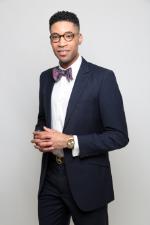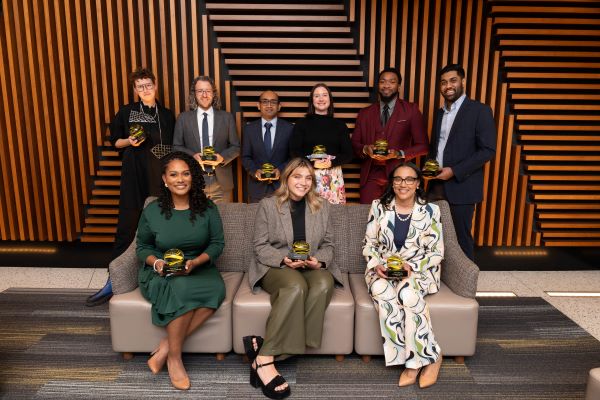
10 Under 10
VCU Alumni’s 10 Under 10 awards program recognizes the noteworthy and distinctive achievements made by alumni who earned their first VCU degree (undergraduate, graduate or professional) within the past 10 years.
The 2025 honorees — the 11th group of alumni to receive this special honor — will be recognized Oct. 25 at a private ceremony. Do you know a deserving young alumni making a big impact? Nominate graduates from 2015-2024 for the 10 Under 10 Awards through Tuesday, April 1.
2024 10 Under 10 honorees
- Tamara Dias, Ed.D. (Cert.’21)
-
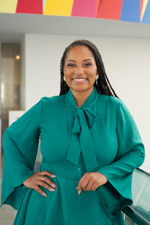 Founder, Good Soil Education; executive director, African American Teaching Fellows
Founder, Good Soil Education; executive director, African American Teaching FellowsIn 2023, Tamara Dias, Ed.D. (Cert.’21), became a caregiver for her father. Dias, executive director of African American Teaching Fellows and a leadership development coach, felt overwhelmed by the responsibility.
“Because I have lots of degrees, people looked to me and were like, ‘You know how to handle his finances and handle the money and make sure things get paid and get everything organized,’” says Dias, who has a doctorate in education and a post-master’s certificate from VCU in educational leadership. “And I had no idea what I was doing.”
A teacher by training, she did what she knew how to do: seek out information. She talked to people with experience in caregiving and read as much as she could until she had the knowledge and skills to manage his affairs.
That experience led Dias to become a certified financial social work educator and launch Good Soil Education to coach people on money management. She also hosts a podcast, “Bad at Math, Good with Money.”
Dias says that at her core she is a teacher. Even though she doesn’t work in a school, all of her endeavors involve educating people, whether teaching people about money or highlighting the importance of getting more Black teachers into classrooms, as she does in her role with African American Teaching Fellows, which provides financial and other support to Black educators starting their careers.
“I went through this school administration program, and I’m not an administrator, but there are so many other ways that I can take what I’ve learned and implement it, because everybody needs good systems, everybody needs a good leader and everybody needs to be around people that can teach them,” she says.
She also uses her leadership skills in her volunteer roles: She serves as vice president of diversity, equity and inclusion for the Junior League of Charlottesville, Virginia; as a member of the Virginia African American advisory board, which advises the governor on the African American community; and as a member of the advisory board of the TomTom Foundation, which plans events and programs to bring together diverse communities in Charlottesville.
- Katelynn Jarrells (B.S.W.’16, M.S.W.’17)
-
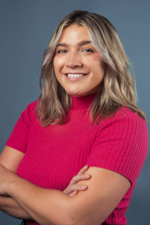 Program head and associate professor of human services and mental health, Brightpoint Community College
Program head and associate professor of human services and mental health, Brightpoint Community CollegeKatelynn Jarrells (B.S.W.’16, M.S.W’17), a first-generation college student, felt at home while studying social work at VCU. “Social work is something I’m very, very passionate about and really align with,” Jarrells says. “Discovering the social work code of ethics provided me with a new lens through which to view the world.”
While earning her master’s degree and after she graduated, Jarrells worked at Greater Richmond SCAN, a nonprofit organization focused on preventing and treating child abuse and neglect. She implemented community programs and worked one-on-one with children and families.
Jarrells then took a job advising social work students at VCU. “I knew I wanted to transition into higher education, and I absolutely adored my academic adviser when I was getting my bachelor’s. I don’t think I would have graduated without her,” Jarrells says. “I was really excited for the opportunity to be that person for someone else.”
In 2021, she became program head and associate professor of human services and mental health at Brightpoint Community College. In that role, she has worked to provide access to lower-income students by ensuring programs are eligible for the state’s G3 financial assistance program, which covers tuition costs for students at certain income levels, and by using free resources instead of expensive textbooks.
“My biggest motivation and passion is around social justice, and particularly racial justice,” says Jarrells. “Whether students identify as LGBTQ or have disabilities or are of [an underrepresented ethnic group], those are really the things that I’m looking at when I'm designing my programs. When I’m looking at how to make things easier, I’m taking into consideration additional barriers based on students’ positionality and the intersections of those identities and how that impacts what they bring to being a student.”
- Melanie Kay-Wyatt, Ed.D. (Ed.D.’14)
-
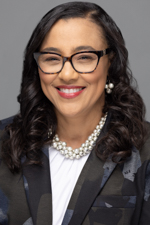 Superintendent, Alexandria City Public Schools, Virginia
Superintendent, Alexandria City Public Schools, VirginiaMelanie Kay-Wyatt, Ed.D. (Ed.D.’14), often runs into former students who tell her that something she told them or a lesson she taught changed their lives. “If you have one of those experiences in your career — just one — you’ve done your job,” she says.
Kay-Wyatt is now superintendent of Alexandria City Public Schools, where she oversees a diverse school system that serves more than 16,000 students who come from 119 countries and speak 122 languages.
“Every day,” Kay-Wyatt says, “I ask myself, ‘How can I best serve each student and meet them where they are?’”
To that end, she and her colleagues are building an inclusive culture where everyone feels welcome. “The students need to feel healthy, engaged, safe and supported every day that they come onto our campus,” Kay-Wyatt says. “If we can continue to build that culture, we can impact retention and academic success and develop a community built on respect and values.”
Kay-Wyatt became an educator almost 30 years ago. She realized her business career didn’t fulfill her and earned a master’s degree in special education. She took a position teaching special education at a middle school in Culpeper, Virginia. “The passion started, and the fire was lit,” Kay-Wyatt says.
She then taught at an elementary and high school in Fredericksburg, Virginia, before becoming an assistant principal, then principal, at a middle school there. While working full time, she earned a doctorate in educational leadership from VCU.
Kay-Wyatt moved into human resources positions with Spotsylvania County Public Schools and Alexandria City Public Schools. In 2022, she became interim superintendent and, in 2023, was the first Black woman appointed superintendent of Alexandria City Public Schools. The same year, she was selected a Superintendent to Watch by the National School Public Relations Association for her focus on family engagement and communication.
Leading a large school system can present a myriad of challenges, but Kay-Wyatt stays focused on how she can help her students thrive.
“As a superintendent, you have to advocate for innovation and flexibility and really push for what's best for students,” she says. “You have to keep students at the forefront, no matter what the noise is around you.”
- Dre’mon Miller (B.S.’15)
-
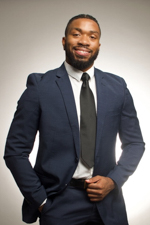 Professor and program head, Criminal Justice, Reynolds Community College; Founder, Street Smartz Over Safety
Professor and program head, Criminal Justice, Reynolds Community College; Founder, Street Smartz Over SafetyOver the past decade, Dre’mon Miller (B.S.’15) has worked toward two goals: teaching the Richmond community about criminal justice and supporting youth mental health.
Miller studied criminal justice at VCU’s L. Douglas Wilder School of Government and Public Affairs and developed experience in the field as a correctional officer at Bon Air Juvenile Correctional Center and as an officer with the Virginia Division of Capitol Police. In 2018, Miller started teaching criminal justice in the Richmond Public Schools.
Teaching high school gave Miller an opportunity to be the mentor he wishes he’d had as a teenager. “I try to be genuine and honest with students,” Miller says. “What I’ve learned is that by showing them that you care first, all of the scores and the rest of that always come, because they don’t want to let you down.”
When Miller and a colleague noticed students struggling with mental health issues, they established a Love Yourself Day at their school. They brought in barbers and stylists to cut and braid students’ hair and hosted an alumna to talk about healthy relationships.
In 2020, when the pandemic kept students at home, Miller visited them, delivering supplies so they could continue learning through hands-on projects. Later that year, he made holiday gifts to drop off for students, “just to make sure they knew we care and to help them feel successful,” Miller says. In 2021, Miller was chosen as the Richmond Technical Center’s Teacher of the Year.
This year, Miller started a new job: overseeing the criminal justice program at Reynolds Community College in Richmond. Miller draws on his connections in local law enforcement to help students get to know officers and gain valuable work experience.
Since 2022, Miller has fostered connections between the Richmond community and law enforcement through Street Smartz Over Safety, an organization he created. Street Smartz helps educate community members about criminal justice and lifesaving procedures. He and his team lead workshops at schools and community centers on issues like gun violence, family communication and stress management. Miller hopes he can help kids develop vital life skills. “If you can prepare for things before they happen, you can manage life no matter where you go,” he says.
- Bryan Portillo (B.S.’14)
-
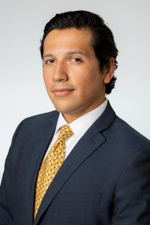 Vice President, Integrated IPO Solutions, Morgan Stanley
Vice President, Integrated IPO Solutions, Morgan StanleyWhen Bryan Portillo (B.S.’14) sat on a VCU finance career panel last year, he told students how he landed an officer position on Wall Street: through networking and determination.
“I’ve had to be scrappy,” Portillo says. “I’ve had to fight harder to get to the same place [as more well-connected students], but at the end of the day, the work pays off because I’m in the same room as everybody else.”
While studying international management at VCU, Portillo networked his way into internships lobbying on Capitol Hill, supporting the office of U.S. Sen. Mark Warner of Virginia and working in state government relations with the Richmond law firm McGuireWoods. When he graduated, the firm hired him to work on its intellectual property litigation team.
Portillo contemplated a legal career but, after deciding against it, left to work as a consultant with a Washington, D.C.-based intellectual property management and technology company. He was recruited by Morgan Stanley to work in global regulatory relations in 2018.
As a new Morgan Stanley employee, “I networked until my face turned blue,” Portillo says. He connected with a colleague in the firm’s Latin American investment banking management division while mentoring international high school students through the volunteer organization Glasswing International. He was subsequently hired to work on that team.
A year later, Portillo joined the firm’s integrated initial public offering team, where he helps companies issue IPO shares to employees, consumers and other constituents. Earlier this year, he was named a vice president in the division.
Portillo credits his parents, who immigrated from El Salvador, for instilling a strong work ethic.
“My dad was a doctor and a pharmacist in El Salvador, and when he left during the civil war there and came to the United States, nobody would accept his medical degree. The only job he could do was clean the floors at a Sears superstore,” Portillo says. “He told me, ‘If you want to make it in this world, you have to make your own luck.’”
- Vikhyath Veeramachaneni (B.A.’14)
-
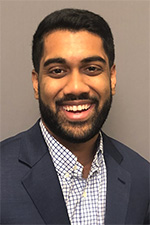 Associate, Latham & Watkins LLP
Associate, Latham & Watkins LLP Vikhyath Veeramachaneni (B.A.’14) wishes he’d known more about the legal profession when he attended VCU. That’s why he mentors current students, helping them prepare for the LSAT, apply for law school and interview for jobs.
During his time at VCU, Veeramachaneni interned at the Federal Reserve Bank of Richmond and Altria. When he was elected student body president his junior year, he decided to switch his major from IT to political science.
Veeramachaneni soon earned an internship at the General Assembly, where he saw the inner workings of state politics. After graduating, he became a finance director in the Virginia House of Delegates, and, in 2016, was hired to help coordinate global pro bono work at Latham & Watkins, a law firm in Washington, D.C..
Getting a firsthand look at the work they were doing on issues like immigration and human rights encouraged him to consider a law degree. “You could see the tangible impact the work had,” he says.
Veeramachaneni attended George Washington University Law School at night while continuing to work full time. In 2023, he became an associate at Latham & Watkins, where he works on mergers and acquisitions and white-collar investigations. He also does pro bono work to support election protection initiatives and vulnerable older D.C. residents who need help preparing wills and protecting their interests.
Veeramachaneni hopes to help VCU students access resources that will help them pursue a legal career. “I think people should have all the information,” he says. “And because I didn’t, I try to make sure others have access to the information and mentorship I wish I had had.”
- Jordyn Wallenborn, Ph.D. (Ph.D.’17)
-
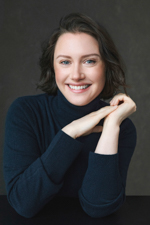 Project Leader, Swiss Tropical and Public Health Institute
Project Leader, Swiss Tropical and Public Health InstituteWhen Jordyn Wallenborn, Ph.D. (Ph.D.’17), arrived at VCU to study epidemiology, she didn’t know what topic to research. Her adviser, the late Saba Masho, M.D., Dr.Ph., suggested she research breastfeeding.
“She introduced me to the love of my life in terms of work” — how to best support nursing mothers — “and I’ve never looked back,” Wallenborn says.
After earning her degree, Wallenborn became a postdoctoral researcher at University of California, Berkeley, where she studied environmental impacts on breastfeeding and human milk composition.
She then moved to Switzerland for a postdoctoral research position with the Swiss Tropical and Public Health Institute to study early-life nutrition and child development. After several years, she became a leader for the Swiss National Science Foundation Ambizione project, which gives grants to early-career professionals to pursue independent research projects.
Since 2018, Wallenborn has researched breastfeeding in Lao People’s Democratic Republic, where she’s looked at whether mothers who receive social transfers (i.e. cash or gifts) are more likely to nurse and/or will nurse longer. Results have been encouraging.
The research study included three groups — mothers who received a social transfer only if they exclusively breastfed for six months, mothers who received a social transfer regardless and a control group who did not receive a social transfer. “Both intervention groups had higher rates of exclusive breastfeeding at six months,” Wallenborn says. “We usually see a very small increase [in similar situations], but nothing of such magnitude.” She plans to follow up in three years to research the impacts on mothers and children of higher rates of breastfeeding.
Wallenborn has expanded the project to Brazil and hopes to do research in Africa and the U.S. Her long-term goal is to run the largest-ever randomized control trial on breastfeeding.
- Grace Whiteside (B.F.A.’17, B.F.A.’17)
-
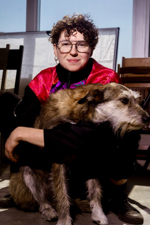 Artist and founder, Sticky Glass
Artist and founder, Sticky GlassGrace Whiteside knew they wanted to major in craft and material studies when they came to VCU. When a weaving class they wanted to take was full, they ended up in a glassblowing class and discovered a new passion. “I accidentally stumbled upon this material that I fell in love with, and it immediately changed everything,” Whiteside says.
The class led to a second major in sculpture and extended media, and, eventually, a successful glassware business, participation in a Netflix glassblowing competition and a career in performance art focused on hot glass puppetry.
Why does glassblowing appeal to Whiteside? It’s all-consuming. When you work with glass, “you have to upend everything that you've learned about how to use your body,” Whiteside says. “The material commands you to listen to it and learn its language.”
The unique properties of the material itself have also captivated the artist. “It’s neither a solid nor a liquid,” they say. “The queerness and the nonbinaryness of this material sat very profoundly within my own sense of self and helped me come out in a certain way.”
During the pandemic, a friend helped Whiteside set up an e-commerce site to sell a glassware line they had been developing. Sticky Glass unexpectedly became a growing full-time global business focused on multifunctional and performative tableware and lighting design. Afternoon Light, one of Sticky Glass’s retailers and a site for home decor and furniture, describes the objects as a “gestural celebration of the material’s molten-state performance art of gooey fluidity, softness and tackiness.”
In 2022, Whiteside joined the third season of Netflix’s “Blown Away,” competing against nine other artists in glassblowing challenges. They were excited to participate in a reality TV show — a driving interest that has informed their performance art.
For a recent project, they tapped into the history of puppetry to educate and advocate for social justice, creating a dating show series with molten glass puppets that explores the intricacies and complications of love. “My performance characters are often a humorous portrayal of my identity as a queer trans person and are in conversation with the queer- and transness of the material itself,” Whiteside says. “And then I borrow from these entertainment platforms that I’m divesting and decoding and upending.”
- Aaron R. Williams (B.A.’14, B.S.’14)
-
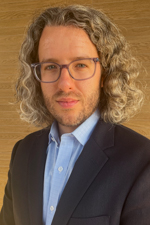 Lead scientist for statistical computing, Urban Institute
Lead scientist for statistical computing, Urban InstituteAaron R. Williams (B.A.’14, B.S.’14) spends a lot of time thinking about data privacy. As a lead scientist for the Urban Institute, a nonprofit that uses research to advance equity and strengthen communities, Williams knows policymakers need good data to make effective decisions. He also knows he needs to protect people’s information from being compromised.
The solution? Create fake data.
“We’re training machine-learning models to generate entirely fake data that have the same statistical properties as confidential data [from real people],” Williams says. “They’re still useful for research but have far less disclosure risk.”
Williams leads workshops around the country to share what he’s learned about data analysis techniques and tools, including how to develop models that estimate the effects of policy changes and how to use R, a programming language that helps analysts manipulate, calculate and display data. He is also an adjunct professor at Georgetown University’s McCourt School of Public Policy.
When Williams arrived at VCU in 2010, he didn’t plan to become a data scientist; he wanted to be a professional musician. The next year, he joined the Honors College and began taking classes in economics and math. He took enough courses to graduate with degrees in both music and economics.
William had an “aha” moment a year later on the way to a gig. “I was touring with this band, reading my econ textbook in the back seat,” says Williams. “And at a certain point, it kind of dawned on me that I actually really like this economics, research-type thing.”
Though his music degree might seem irrelevant to his current work, he finds surprising connections. The improvisational skills he learned in jazz classes help him be a better teacher, and the class he took on arranging music relates to his work managing data.
“The class was taught by a very accomplished professor named Doug Richards who wrote big-band charts for 20 musicians,” says Williams. ”That was really good for learning how to structure something that’s so large and how to think through problems that are that big. I think about that all the time, because large-scale computer programming is shockingly similar.”
- Saheem Zaidi, Ph.D. (Ph.D.’14)
-
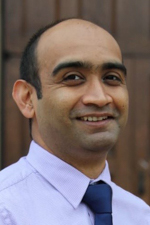 Senior scientist, Johnson & Johnson Innovative Medicine
Senior scientist, Johnson & Johnson Innovative MedicineWhen Saheem Zaidi, Ph.D. (Ph.D.’14), was researching graduate programs in medicinal chemistry, he sought professors who study G-protein coupled receptors, which allow cells to communicate with one another and the outside environment. A third to half of all pharmaceuticals bind to these receptors because they regulate so many different physiological processes.
Zaidi’s search led him to Yan Zhang, Ph.D., a professor in the School of Pharmacy who studies G-protein coupled receptors to develop new treatments for substance use disorders, neurological disorders, pain and other conditions. Zhang and fellow School of Pharmacy professor Glen Kellogg, Ph.D., introduced Zaidi to “the fascinating world of biochemical simulations and computer-aided drug discovery.”
As a graduate student and postdoctoral researcher, Zaidi worked with both Zhang and Kellogg to develop less addictive and less lethal opioids. During that time, he realized he was more interested in computational chemistry, which uses computer simulation to help understand complex biochemical processes, than the “real sort of chemistry, the beaker moving and shaking sort of stuff,” he says.
After leaving VCU in 2015, Zaidi continued to use computational chemistry to research opioids at the University of Southern California as a postdoctoral researcher and research associate. He was awarded three patents for his work there. In 2022, he joined Johnson & Johnson Innovative Medicine.
In his current role, Zaidi works on the early phase of the drug discovery process. “We try to build models of proteins and models of drugs [to understand] how they interact,” Zaidi says.
Once Zaidi finds a combination that seems promising, he proposes it to one of the team’s chemists, who runs experiments in the lab. If those experiments work, testing continues.
The process can be time-consuming, and failure rates can be high. “I can try 10 things, one works, and then I try 10 new things based on that,” Zaidi says. “It’s sort of a workflow funnel. Even when you have lots of resources and lots of people working on it, a single project can take several years.”
The work is arduous but rewarding, he says: “There’s a patient at the end who could really benefit from our discoveries.”
Past recipients
- 2023
-
Hannah Altman (M.F.A.’20)
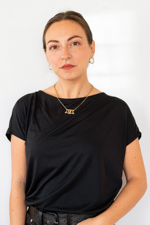 Photographer
PhotographerArtist Hannah Altman (M.F.A.’20) doesn’t remember a time when she didn’t take photographs. “Photography has been my center of gravity as long as I’ve been sentient,” she says. “When I was younger, I would steal family members’ cameras and use them to take photos of my family and immediate surroundings.”
By the time Altman began VCU’s M.F.A. program in 2018, she had identified a key theme to explore in her work: Jewish folklore. “I was getting into reading the stories and taking photos of Jewish objects around my house,” Altman says. “That gradually expanded beyond my family into this large stream of Jewish thought. I’ve combined my obsession with photography with a lifelong commitment to and deepening interest in Jewish heritage and folklore.”
The more she learned about Jewish folklore, the more interested she became in exploring how and why certain stories get passed down. Altman describes folklore as a way to make sense of both historical and contemporary events and sees her work as a conversation with those stories.
Her recent series, completed during a residency at Yale’s Joseph Slifka Center for Jewish Life, looks at the “dark underbelly” of these stories. Many tell of past persecution while holding fear and anxiety for the future. Altman is moved by this braiding of past and present that happens throughout Jewish culture.
She sees her own work as a continuation of that process; her images are another link in what she describes as the “unbreakable chain of Jewish culture.”
Altman seeks to build more connections between photography and Jewish culture. “Both are very lush spaces but have a limited number of bridges between them,” she says. “I want to help preserve Jewish culture and Jewish stories through photographic representation.”Chris Arnatt, Ph.D. (Ph.D.’13)
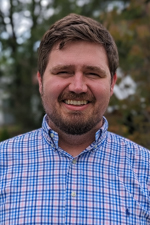 Associate professor of chemistry and pharmacology and physiology, St. Louis University
Associate professor of chemistry and pharmacology and physiology, St. Louis UniversityChris Arnatt, Ph.D. (Ph.D.’13), earned his doctorate in medicinal chemistry from VCU’s School of Pharmacy only a decade ago, but he has already received two prestigious research grants from the National Institutes of Health, totaling $4.5 million.
Arnatt attributes his success to his graduate adviser, Yan Zhang, Ph.D., professor in the Department of Medicinal Chemistry. “My mentor made me an expert in computational modeling, organic synthesis, cell biology and pharmacology,” Arnatt says. “It was hard at the time, but to have such an interdisciplinary background is unusual for a chemist.”
Arnatt conducts research to develop new drugs for cancer treatment and non-opiate, non-addictive treatments for pain. In the lab with Zhang, he worked on G protein-coupled receptors, proteins on the cell’s surface that communicate with other cells and help regulate multiple processes that take place in the body. More than half of all drugs target GPCRs because they regulate so many different physiological processes. Arnatt continues to research these receptors and is currently developing drugs for multiple GPCRs targeted toward the treatment of chronic neuropathic pain and breast cancer.
In his work on alternative treatments for neuropathic pain, he studies “orphan receptors.” “Those are receptors that we know pretty much nothing about,” Arnatt says. “We don’t know what drugs bond to them. We don’t know what interacts with them, but we do know they have an effect on pain states in our mouse models.”
The research thus far has yielded at least five promising targets, he says.
Arnatt also teaches a full course load, mentors students in his lab and directs the Chemical Biology Program at Saint Louis University, where he coordinates its undergraduate and graduate program across five departments. During the summer he works with low-income high school students who have had limited access to STEM careers.
The motto that keeps Arnatt going? “Get it done.” “I don’t consider myself the most intelligent person in the room, but I work really hard,” he says. “I’ll always figure out a way to get things done.”Ashley Bland (B.S.’13, M.Ed.’16, Cert.’23)
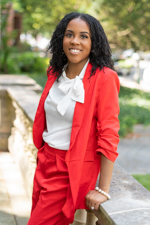 Lead educational technology integrator, Richmond Public Schools
Lead educational technology integrator, Richmond Public SchoolsWhen Ashley Bland (B.S.’13, M.Ed.’16, Cert.’23) entered VCU as a first-generation college student, she didn’t plan to become a teacher. She double-majored in biomedical engineering and physics to prepare for a career in STEM.
While earning her degree, Bland served as chair for a pre-college initiative of the VCU chapter of the National Society of Black Engineers. She worked with middle school and high school students in metro Richmond, encouraging them to pursue STEM fields. “That was my first experience getting to work with kids,” Bland says. “I was passionate about sharing these concepts.”
When some of the students decided to study engineering in college, she realized the impact she could have on young people. One of Bland’s professors recognized her avid interest in working with students and suggested she consider VCU’s teacher residency master’s program, which trains and supports teachers for high-need and hard-to-staff schools.
Bland graduated from the program in 2016 and taught middle school math in the Richmond Public Schools system for three years. In early 2020, Bland was named instructional facilitator for TechConnect, an afterschool program to teach middle-school students technology skills. Soon after, COVID-19 broke out and kept students at home; Bland’s new role became even more critical, as she was tasked with helping create technology so students could learn virtually.
Bland collaborated with team members to develop the RPS@Home program, which provided on-demand tutoring and comprehensive lessons for students to follow. She also created content for the RPS@Home middle school math and STEMtastic Tuesdays curriculum.
For this work, Bland was named Richmond Public Schools Teacher of the Year in 2021 and Virginia Region I Teacher of the Year in 2022. “Never would I ever think I’d be honored in that way,” Bland says. “The fact that I won teacher of the year for my division and for my region was an incredible honor.”
Bland credits her sixth-grade math teacher as a role model and for helping her excel. “I grew up in rural Virginia, and he was the first person to expose me to the idea of finding success beyond the smaller area where I grew up,” she says. “I feel like I’m carrying the torch that he passed on.”Kristal Lyn Brown, Ph.D. (Ph.D.’20)
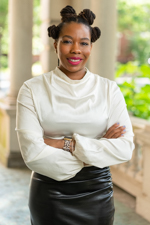 Assistant professor, Drexel University College of Nursing and Health Professions
Assistant professor, Drexel University College of Nursing and Health ProfessionsKristal Lyn Brown, Ph.D. (Ph.D.’20), discovered her path studying health disparities in obesity treatment when she became a coach for a girls’ step team in Nashville, Tennessee while working toward her master’s degree at Meharry Medical College. She soon realized she wasn’t just teaching step routines; she was helping the team reach their health and fitness goals; one of her mottos was “Step is life.”
That opportunity led to Brown’s involvement in a Vanderbilt University Medical Center program promoting healthy habits among adolescents and their parents. In her conversations with Black female college students assisting with the program, they repeatedly talked about the impact of stress on their health.
“They had these traditional stressors of being a college student that they were dealing with, compounded with stress that resulted from racial discrimination and microaggressions, like people assuming they were at the university because they were on some sort of sports scholarship,” Brown says.
Hearing those stories sparked Brown’s interest in the psychological and physiological factors that affect obesity treatment response for young Black women, and it brought her to the VCU School of Medicine, where she earned her Ph.D. in social and behavioral sciences and continued to expand her interest in obesity, stress and eating behaviors under the mentorship of Jessica Gokee LaRose, Ph.D.
Brown describes herself as a researcher, behavior changer, interdisciplinary health disparities scholar and storyteller. “Sometimes, as researchers, we focus heavily on numbers and quantitative data,” says Brown. “That has always been important to me — but I’ve also wondered about the story behind those numbers.”
Brown explored some of those stories in 2019 when she collaborated with artist Austin “Auz” Miles (B.F.A.’17) for the “Brown Girl Narratives” mural in Richmond’s Manchester neighborhood. The painting was inspired by Brown’s doctoral research and conversations with other young Black women about their lived experiences.
“One of my goals with that project was to share these stories, to put them in an area that is slowly gentrifying and to keep conversations going,” says Brown. “I am a scientist with a creative brain. I see the value of the intersection between art and science.”Arshelle Carter (B.S.’16, B.A.’16)
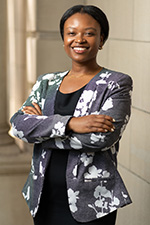 Program manager, Tech Girls
Program manager, Tech GirlsGlobal educator Arshelle Carter (B.S.’16, B.A.’16) developed her passion for international engagement when, at age 16, she traveled to South Africa with her mother to visit family friends working for the US government abroad. The experience opened her eyes to a world beyond Connecticut and Virginia, where she spent her childhood.
Carter, who earned a B.A. in international studies and a B.S. in business with a concentration in international management, continued to explore her interest when she was at VCU and participated in VCU Globe, a living-learning program for students interested in global education and international service. “I remember sitting around with a group of people from different walks of life and different backgrounds, and we would have conversations about religion and belief systems,” says Carter. “Those conversations made us more understanding of others.”
VCU’s Global Education Office and National Scholarship Office helped Carter identify and apply for opportunities to study and volunteer in Mexico, Qatar and Spain. They also helped her earn major grants, like the Fulbright English Teaching Assistant award.
As a Fulbright teaching assistant from 2017-18, Carter taught more than 400 high school students in a remote part of Indonesia. She stayed in Indonesia for two more years as a program manager with the Fulbright English Teaching Assistant program. “Teaching abroad made me passionate about equipping teachers with the correct tools and skills to improve learning outcomes for students around the world,” Carter says.
In 2021, Carter received the prestigious Pickering fellowship, awarded to only 45 people in the U.S. annually. The fellowship prepares candidates for work in the State Department’s Foreign Service and seeks to draw diverse candidates to the service. Carter is now working on a master’s degree in foreign service at Georgetown University.
She is also program manager with TechGirls, a State Department program that empowers and supports young women around the world to pursue higher education and careers in STEM. The program recently expanded from 12 to 36 countries and territories. This year, the program brought together 126 young women to study at a U.S. university and participate in job shadow opportunities. Carter mentors TechGirls as they prepare to transfer their newly acquired skills and knowledge back to their home communities.
“Global engagement is important to me,” Carter says. “It provides opportunities to challenge one’s assumptions and develop lifelong friendships with people from around the world.”Gilbert Michaud, Ph.D. (Ph.D.’16)
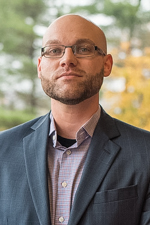 Assistant professor of environmental policy, Loyola University Chicago School of Environmental Sustainability
Assistant professor of environmental policy, Loyola University Chicago School of Environmental Sustainability
When Gilbert Michaud, Ph.D. (Ph.D.’16), was applying to doctoral programs in public policy and administration, he thought he would stay in New England, where he had grown up and earned his bachelor’s and master’s degrees. A 16-hour drive to Richmond and a lunch meeting at the Village Cafe changed his mind.
The meeting was with Damian Pitt, Ph.D., associate professor at the Wilder School; Michaud quickly realized he wanted to follow in Pitt’s footsteps and conduct community-engaged scholarship focused on clean energy.
“Working with Dr. Pitt really set forth my career niche of doing applied and engaged research with practitioners,” Michaud says. “Over the years, I’ve continued to work with government officials, electric utilities, the solar and wind industry, and clean energy nonprofits.”
As assistant professor at Loyola University Chicago’s School of Environmental Sustainability, Michaud teaches law and policy courses, mentors students and leads applied research projects. For the past several years, he has worked on economic and workforce impact studies for proposed large-scale clean energy projects across the Midwest.As part of this research, Michaud regularly meets with community members. “I often attend and speak at local hearings for solar energy projects. It’s fascinating to engage with public officials and landowners and learn about their interests and potential concerns regarding renewable energy. It’s fun to go into these communities and help get projects approved and built,” he says.
More recently, Michaud has worked on clean energy initiatives internationally. Within the past year, he has traveled to Barbados, Columbia and France to speak with government officials and industry leaders about innovative programs to deploy clean energy.
Educating people around the world and helping facilitate clean energy projects energizes Michaud. “It’s amazing to be part of these teams that are doing research on renewable energy projects, see them get approved, see shovels in the ground and see them connected to the grid and generating clean electricity,” he says. “I like to think I’m actually making a difference in these communities.”Arzu Moosvi, Pharm.D. (B.S.’15, Cert.’20, Pharm.D.’20)
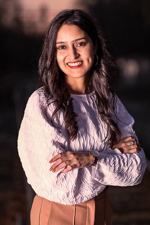 Community pharmacist and clinical outreach coordinator, Giant Pharmacy
Community pharmacist and clinical outreach coordinator, Giant PharmacyFor Arzu Moosvi, Pharm.D. (B.S.’15, Cert.’20, Pharm.D.’20), a sense of accomplishment comes not from degrees earned or awards won but from learning from her colleagues and clients each day.
It comes from the daily work of getting to know her patients and their needs. Moosvi, a community pharmacist and clinical outreach coordinator in northern Virginia, builds long-term relationships with patients “where I see them in different points of their life and come to understand them better,” Moosvi says. “My goal is to dive deep into their lives and understand more fully how I can make a difference.”
That focus on gradual progress also underlies Moosvi’s work in Pakistan, her family’s country of origin. She has worked there with various organizations to help improve the Pakistani health care system. “Some people in certain areas of Pakistan don’t have the same accessibility we do to health care, and they pass away at early ages. That drives me to ask how I can help,” she says.
In 2016, Moosvi volunteered with one of Pakistan’s largest hospital systems, counseling patients about medications. From 2020-21, she served as a pharmacist in Karachi with doctHERS, a network of female clinicians providing access to better health care.
Moosvi recognizes that to make a difference in Pakistan, she needs to first understand the country’s infrastructure and challenges. “An American can walk into any country and say, ‘Hey, I’m going to help you,’” she says. “But how can you help someone if you don’t know them?” Helping an individual, a community or even a country requires empathy and compassion, she observes.
Whether trying to make change in another country’s health care system or helping her U.S. clients live their healthiest lives, Moozvi focuses on the small steps that can build to something bigger. “Those miniscule changes can have big impacts,” she says.Alton Reid (B.S.’13)
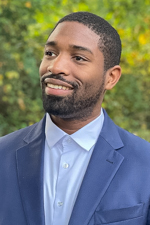 Health scientist, EPA Office of Inspector General
Health scientist, EPA Office of Inspector GeneralEight years ago, Alton Reid (B.S.’13) was biking from his West Philadelphia neighborhood to Drexel University, where he was working toward his master’s in public health. He passed a group of volunteers renovating a neighbor’s house, stopped and asked if he could help.
The volunteers worked with the Home Preservation Initiative, a team of nonprofit partners — including Drexel’s Dornsife School of Public Health — that provide high-quality home repairs to people in lower-income neighborhoods. Reid’s chance encounter led to his research into the physical and mental health impacts of these home renovations.
That project led to research examining the connections between infrastructure and health that Reid presented for the American Public Health Association’s 2022 conference.
Interviewing residents, working with stakeholders to produce a brief and helping solicit grant funding inspired Reid. He realized that the right kind of research can lead to positive community benefits. He saw, for the first time, how government could improve people’s lives.
“I grew up mostly in New York, but I’m basically a first-generation immigrant; my mom immigrated from Jamaica and my dad came from a Jamaican background,” says Reid. “When my family and I had experiences with the government, they were typically related to challenges, like trying to get a green card to allow us to stay in the country.”
Reid, who earned his VCU degree in biology and worked in VCU Professor Joseph Landry’s lab researching cancer therapies, became a health scientist in the EPA’s Office of Inspector General in 2019. In this role, he analyzes programs for fraud, waste and abuse and seeks opportunities for improvement.
Reid and his team recently were awarded the Gold Medal of Exceptional Service, the EPA’s most prestigious award, for a report detailing how, in 2018, the EPA had deviated from typical procedures when registering a widely used pesticide. Reid pushed for more accountability and transparency in registration processes.
His favorite part of his job is mediating between higher-level EPA officials and everyday citizens. “It’s good to be the person talking to both the EPA and someone on the ground who is being impacted by their decisions,” Reid says. “I write the reports that explain the perspectives of people who do not always have the loudest voices. The EPA can then make positive changes that improve people’s lives.”Axana Soltan, J.D. (B.S.’17)
 Activist and human rights lawyer
Activist and human rights lawyerWhen Axana Soltan, J.D. (B.S.’17), was 15 years old, she started an NGO that has consultative status with the United Nations Economic and Social Council. She helped provide access to medical care, education and advocacy to low-income children in Richmond as well as internationally. “Early on, I recognized that injustice and poverty exist even in a civilized country like the U.S.,” she says.
Her motivation stemmed from her experience as a refugee. Her family fled Afghanistan under the Taliban in 1999 to escape the harsh regime, which was especially oppressive for women. The family lived in refugee camps in Central Asia for 10 years before immigrating to Richmond in 2009. “Being a refugee has turned me into a global citizen,” Soltan says. “It has taught me the value of keen observation, the surprising strength of a single voice and the lasting importance of advocacy.”
As a human-rights lawyer, Soltan continues to advocate on behalf of women, children and members of other marginalized populations. Soltan earned her Juris Doctor with the highest distinction from the University of the District of Columbia School of Law, where she served on the U.S. Supreme Court Youth Appellate Litigation Clinic and Civil Rights Legislation Clinic. She proceeded to study her LL.M at the George Washington University School of Law, where she was selected as a GW Law Merit-Based Scholar and serves as a guiding editor member of The George Washington International Law Review. Soltan is currently training in negotiation, litigation and arbitration at Harvard Law School.For more than a decade, Soltan has used her passion, education and skills to promote human rights around the world. She brought literacy programs to more than 6,000 Afghan women when she founded a library in the country and pioneered the invention of the first solar-powered interactive audio instruction program that uses photovoltaic technology to deliver STEM education globally.
Soltan continues to serve people across the world and in Richmond. When COVID-19 spread widely, Soltan and her family developed a one-piece face mask with a head covering for immunocompromised individuals, particularly those who had lost their hair during chemotherapy. They donated more than 2,200 masks to cancer centers and individual cancer patients.
In her 2017 Wilder School Commencement address, she invited students to join her in creating “a world that places human needs and human rights above all,” and she continues to inspire with her commitment to human rights and selfless acts of service.Kim Young (M.S.W.’13)
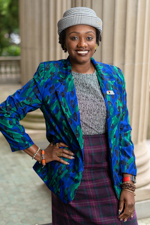 Director of programs, The Hive; founder, Dope Black Social Worker
Director of programs, The Hive; founder, Dope Black Social WorkerKim Young (M.S.W.’13) spent nearly a decade as a clinical social worker, providing one-on-one therapy for youths and families. But in 2018 — “one of the worst years of my life,” she says — she shifted from clinical services to working for systemic change.
“I had three young people die, two by violence and one that was fatally struck by a vehicle leaving work,” Young explains. “There’s that analogy of pulling a baby out of the river just to look up and see more coming down. I couldn’t keep doing this work one baby at a time.”
The same year, Young helped establish the first Youth Violence Prevention Week in Richmond.
Since then, Young has continued to focus on “systems upstream” work. She left private practice and became director of family and community engagement at Peter Paul RVA, a community organization in Richmond’s East End that provides educational and support services.
In that role, Young helped reduce barriers that prevent youths and families from achieving success, and she designed and implemented Z-LIFE, a young adult employment and entrepreneurial program.
This past March, Young became director of programs for the Hive, a Richmond-based organization that helps youth transition to adulthood.
In April 2020, Young formed Black Dope Social Worker to reduce social isolation among social workers. A self-styled “expert troublemaker,” she leads workshops and speaks to groups about social work, mental health and youth development. She is an advocate for more Black social workers and has lobbied for licensure reform to create more equitable pathways to become a social worker.
Young acknowledges the challenges of her field. “You’re so close to people who are suffering,” she says. “You see the evils of the world.”
At the same time, she is grateful for the gifts her work has given her. “As a social worker, you can sit with somebody when they’re in the depths of their pain and stay with them until they get to the other side of it,” Young says. “There’s nothing like that.”
- 2022
-
Henry O. Agyeman, Pharm.D. (B.S.’17)
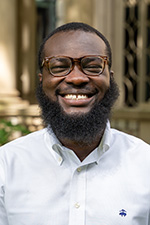 Residential pharmacy services coordinator, Buford Road Pharmacy
Residential pharmacy services coordinator, Buford Road PharmacyWhat do a line cook and a pharmacist have in common? That sounds like the setup for a joke, but it’s a question Henry O. Agyeman, Pharm.D., takes seriously. Having worked as a line cook before becoming a pharmacist, he sees surprising parallels.
Both jobs require keen attention to detail, Agyeman says. Both require the ability to stay calm under pressure. Both require a willingness to take on challenges.
And both are less routine and straightforward than they seem. “Cooking is an art, but there’s also an art to pharmacy and disease management,” Agyeman says. “Every person is different, and not every drug works the same for everyone. We sometimes have to tweak therapies for our patients to have success.”
Whatever profession he practices, Agyeman approaches life with passion, energy and optimism. He lives by the motto “Whatever you do, put your heart into it and look at the bright side.”
That can-do attitude helped him earn an associate’s degree, a bachelor’s degree in chemistry with a minor in psychology at VCU and a Doctor of Pharmacy degree, all within 10 years.
Agyeman says he thrived as a VCU student because of the school’s sense of community and his talented professors in the Department of Chemistry, including mentors Sally Hunnicutt, Ph.D., associate dean of sciences and mathematics, and Mychal Smith, Ph.D., assistant professor of chemistry. “They provided everything I needed to excel,” he says. “The chemistry program prepared me to pursue my pharmacy goals.”
After graduating from VCU, Agyeman earned his Pharm.D. from the University of Cincinnati in 2021.
While still in graduate school, Agyeman served as a CVS COVID task force leader in Ohio, helping roll out the COVID-19 vaccine in late 2020 and early 2021. He helped administer the vaccine to residents of the Ohio Veterans Home in Georgetown, many of whom were World War II veterans. “That was my proudest moment,” Agyeman says. “Meeting those folks was eye-opening for me.”
Agyeman returned to Richmond and participated in VCU’s one-year Community-Based Pharmacy Residency Program. He currently works as the residential pharmacy services coordinator at Buford Road Pharmacy, just outside Richmond, Virginia.
Agyeman strives to provide the best possible care for clients, particularly those in need. “I push the boundaries to see if I can provide the maximum amount of support to the patients I work with,” he says.
Amma Agyemang, Ph.D. (M.S.’12; Ph.D.’16)
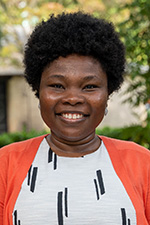 Assistant professor, VCU School of Medicine, Department of Physical Medicine and Rehabilitation
Assistant professor, VCU School of Medicine, Department of Physical Medicine and RehabilitationAmma Agyemang, Ph.D., entered VCU’s graduate program in clinical psychology with a master’s degree in public health and a passion for health equity. That broader background informs her work as director of research and assistant professor in VCU’s Department of Physical Medicine and Rehabilitation. “Having trained in different disciplines gives me a multifaceted approach to research questions and problems,” she says.
In her current role, Agyemang conducts clinical-translational research, applying insights from clinical research to health interventions to improve outcomes. She focuses on the psychological implications associated with chronic medical conditions, particularly traumatic brain injury.
Agyemang’s past research includes topics such as assessing an online therapy for insomnia among patients recently diagnosed with cancer and examining the connection between sleep and cognitive function among people with TBI. She has also researched mental health among Black Americans who have depression, diabetes and/or high blood pressure.
Agyemang, who moved to the U.S. from Ghana at 12, is passionate about health equity and community health care. In her research, she addresses health disparities and works to provide people from marginalized communities with better access to care.
That interest in community health was what drew Agyemang to VCU. “I really appreciated that the VCU Department of Psychology has a clinic that’s in the community,” Agyemang says. “I’ve continued being here because I appreciate what VCU does in terms of research and collaborating with people who live here.”
Agyemang never expected to pursue a career in academia, but she’s driven to improve the lives of people living with chronic conditions, as she balances teaching and researching with raising her two children with her husband.
Several years ago, Agyemang was appointed leader of her research team, tasked with adding staff as well as developing and refinding the infrastructure for data operations and management. She has since helped optimize data operations and management to ensure the team performs as effectively and efficiently as possible.
“I’m proud our work is clinically meaningful and relevant and that we’re constantly thinking of how we can take what we learn and apply it to the real world,” she says.
Dhara Minesh Amin, Ph.D. (M.S.’14; Ph.D.’19)
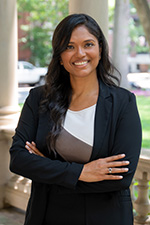
Managing Consultant, Guidehouse, State and Local Government division
Dhara Minesh Amin, Ph.D. (M.S.’14, Ph.D.’19), learned early on the economic challenges working families can face. Her grandmother cared for her and her brother in suburban Chicago while her parents both worked long hours. Despite two incomes and access to free child care, the family still sometimes had to choose between paying utility bills and purchasing essentials, such as food and diapers.
Amin’s family consistently reinforced the importance of education and encouraged her independence and determination. As a first-generation Indian American, she overcame limited resources to pursue higher education.
Amin graduated with a B.S. in human development and a minor in Leadership and Social Change from Virginia Tech, then earned a master’s in criminal justice and a Ph.D. in Public Policy and Administration, with a concentration in criminal justice policy from VCU. While in graduate school, Amin discovered her path. “VCU completely changed my trajectory,” Amin says. Student networking opportunities led Amin to the public safety sector.
While working toward her degree, Amin joined the Virginia Department of Corrections in 2013 as a graduate fellow through the L. Douglas Wilder School's Graduate Scholars Fellowship and then as a Prison Rape Elimination Act hotline coordinator. That role led to Amin’s dissertation research about students’ awareness, knowledge and perceptions of mandatory reporting of sexual victimization on college campuses.
“I never thought I’d go for my Ph.D., let alone collect my own data,” Amin says. “To take data and apply it to helping someone, whether improving mandatory reporting on college campuses or collecting audit documentation for sexual victimization allegations in the prison system, has a lifelong impact.”
Several years later, Amin moved to the Virginia Department of Juvenile Justice, where she served as a project consultant, research analyst and coordinator of external research, and senior research associate. She examined data to look at the overall effectiveness of programs and initiatives. “I tried to figure out what's working and what's not working and how we could better some outcomes and make policy, procedural and operational suggestions,” she says.
Amin recently switched to the private sector and works at Guidehouse as a managing consultant in the State and Local Government division. She combines her public service experience with private sector tools and expertise to help state and local governments optimize solutions and outcomes.
Throughout her adult life, Amin has volunteered for the causes she cares most about. In 2014, she collaborated with the organization Drish-ti to collect more than 400 pounds of T-shirts from local organizations as well as VCU and Virginia Tech and their alumni networks. She then drove more than 2,800 miles across India to deliver the shirts to their new owners.
Amin also volunteered with One Book, One Facility, which provides youth in the juvenile justice system with a thought-provoking book and the chance to discuss important topics with mentors and peers.
In addition to her formal volunteer roles, Amin supports younger relatives who hope to attend college, largely because of her gratitude for the mentors who helped her along her journey.
"It could have been very easy for me to end up on the other side of the system like the youth DJJ works with,” Amin says. “Instead, I made it!”
Laura Colagrande (B.F.A.’13)
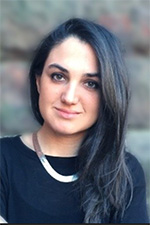 Director, strategic partnership, marketing, Cart.com
Director, strategic partnership, marketing, Cart.com
Co-founder and adviser, ChippinLaura Colagrande was so busy working and studying at VCU, she describes her experience as a blur. “I remember feeling unclear and, more often than not, uncertain about my path,” she says. “It’s perhaps that sense of uncertainty that pushed me to work really hard in college and in the years afterwards.”
Although her college years were hectic, Colagrande forged enduring bonds with a few classmates and professors, and she gleaned valuable lessons that continue to guide her work.
“I learned resilience and discipline, and I think I ended up making the most of my VCU experience because I was able to go beyond my major” Colagrande says. “I feel lucky I was able to work with several professors who expanded the definition of design. They taught us that design is about asking questions, tackling pressing problems, exploring unconventional solutions and continuing to iterate.”
That cross-disciplinary approach and intellectual curiosity led Colagrande to receive a scholarship to attend the University of Pennsylvania, where she earned a master’s in architecture and also enrolled in a dual program with the School of Engineering and the Wharton School of Business. In 2016, she received a national award from the American Institute of Architects and two additional merit scholarships from the University of Pennsylvania’s School of Design.
In 2017, the University of Pennsylvania nominated Colagrande to serve as human-centered design fellow for Peek Vision, a social enterprise working in low- and middle-income countries, to optimize their eye health services. Colagrande worked on the national roll out for Botswana and launched Peek Acuity, the smartphone-based health-tech program that enables health care providers in remote locations to supply cost-effective and targeted eye care treatment.
Later that year, Colagrande worked with Starbucks Global Innovation on launching the first Starbucks in Italy and the Reserve Roastery brand worldwide.
During her last year of graduate school, Colagrande applied her design thinking to pet food. With business partner Haley Russell, she co-founded Chippin, which is transforming the more than $40 billion U.S. pet food market with its planet-friendly proteins made from insects, overpopulated fish and algae-based foods. Their product is currently sold on Grove Collaborative, Thrive Market, Amazon, chippinpet.com and select stores nationwide.
The company was featured in Forbes, Fast Company Inc., BBC and many more. The co-founders were honored as Forbes 30 under 30, class of 2020.
Building a company from the ground up led Colagrande to her current job at Cart.com, a tech company that works with fast-growing brands (like Chippin), providing them with the software, e-commerce services and fulfillment networks they need to scale. As a director of strategic partnerships, Colagrande works closely with best-in-class partners — Google Cloud, PayPal, Snowflake — to build and expand Cart.com’s product capabilities.
And she’s still channeling lessons from her VCU mentors, who encouraged her to stretch beyond her domain and never stop iterating and evolving. “‘Why is this concept/ solution relevant? And what am I learning from this mistake or success?’ These are still the questions that I ask myself every day,” Colagrande says.
Darrion R. Holloway, Esq. (B.S.’13)
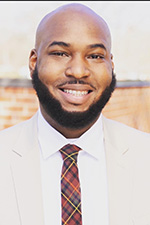 Associate Attorney at Shane Smith Law
Associate Attorney at Shane Smith LawWhen Darrion R. Holloway, Esq., first came to VCU, he wondered whether he had made the right choice. Some of his friends had chosen to play football in college, and he regretted passing up that opportunity.
Then, during a meeting with his adviser, Carlton Goode, Ed.D. (Ed.D.’22), his perspective shifted. “He sat me down and said, ‘You have to give [VCU] a chance. There’s so much out there for you to get into and learn,’” Holloway says.
After that conversation, Holloway began to appreciate all that VCU has to offer, particularly the diversity of the student body. “It taught me how to be bigger than what I see, to know there’s more than what you see and experience,” he says. “It taught me how to adapt to pretty much any situation or walk into any room.”
Holloway first saw these lessons play out professionally when he earned an internship his senior year with a prominent criminal defense attorney in Richmond. “That was the first notion I had of what I wanted to do. I wanted to help people, and I felt like that was what he did,” Holloway says.
That experience led him to North Carolina Central University law school in Durham, where he was the only student to serve simultaneously on the Trial Advocacy Board, NCCU Law Review and The Moot Court Board. He served as president of the Class of 2017 and graduated magna cum laude.
Upon graduation, Holloway began working as a public defender in Charlotte, North Carolina, a job that enabled him to fulfill his mission to help others. In addition to providing legal work for his clients, he helped them access mental health treatment, stable employment and sustainable housing. Super Lawyers named him a Rising Star in North Carolina for his work.
Last year, Holloway shifted to personal injury litigation, but he remains driven to help people. In his current role, he helps clients who are hurt receive fair compensation for their injuries.
“Everything I do is about helping people, whether it’s in my professional life or as a volunteer,” Holloway says. He coaches varsity basketball at United Faith Christian Academy in Charlotte and mentors high school and college students.
Holloway also serves with two other VCU graduates on the board of the 3E Program for Social Justice and Change, which creates curriculum-based programs for high school students in underserved communities to familiarize them with college coursework.
In everything he does, Holloway seeks to live up to the high expectations of those who have guided him. “I have had tons of mentors who paved the way for me and set the example, and every day I get a chance to make them proud,” he says. “That’s what success means to me.”
Allyson Kennedy, Ph.D. (M.S.’12; Ph.D.’16)
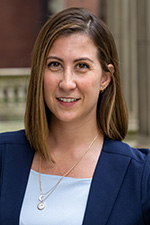 Program director, National Science Foundation
Program director, National Science FoundationAllyson Kennedy started her VCU master’s in biology in 2010 with a keen interest in scientific research — but with less understanding of how she could turn that interest into a viable career. That quickly changed, however: “Once I got into the program and fell in love with it, I grew to appreciate how graduate school could open so many doors,” she says.
Thanks to the professors who supported her throughout her master’s in biology and subsequent Ph.D. in Integrative Life Sciences, her path emerged. “Through supportive mentors, engaging courses, community outreach opportunities and the autonomy to explore challenging scientific questions in the lab, I learned how to channel my interests and skills into a career,” Kennedy says.
Kennedy developed a passion to expand access to STEM education while working with Amanda Dickinson, Ph.D., associate professor of biology. “She allowed me to explore education and outreach and community-based [projects] in addition to the scientific research that I was doing in her lab,” Kennedy says. “That helped shape what I wanted to do with my life … and learn more about the things I care most deeply about.”
Her passion blossomed when she took a sabbatical in 2014 to teach English in Thailand. She was curious to see more of the world outside of her native Richmond, Virginia. Being there deepened her commitment to education access, she says, and continues to inspire her. She recently returned to Thailand as an Embassy Science Fellow, working with the Thai government and U.S. Embassy to address key issues around STEM education and promote science diplomacy.
Kennedy now works at the National Science Foundation, a federal agency that supports science research and education. She began as an AAAS Science and Technology Policy Fellow in 2017, and became a program director in 2019.
In her current role, Kennedy manages a portfolio of more than 50 awards that support educators from K-12 and university settings as they develop inclusive computer science initiatives in their schools, thereby enhancing access to STEM education.
Over the years, Kennedy has grown more focused on inequities in science education, particularly computer science. She works to foster diversity and inclusion in the field so that all students have the opportunity to become innovators of new technologies that can help address some of society’s biggest challenges.
“As policies and practices that impact issues of social justice — like policing, education, housing, and data privacy — become increasingly reliant on new technologies like artificial intelligence, it is imperative that the designers of these technologies reflect the diversity of this country’s citizens,” Kennedy says. “We need to prepare every student to be creators in this new digital world."
Alex Ratti (B.S.’13; M.S.’18)
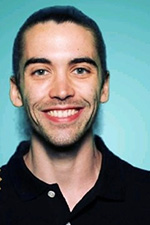 Co-Founder and CEO, Light Switch Bio
Co-Founder and CEO, Light Switch BioFor decades, Alex Ratti watched his mother, Tierney, cope with the painful effects of an ultra-rare skin disease, pityriasis rubra pilaris (PRP). She took off-label medications to manage painful skin fissures, peeling and inflammation among other difficult symptoms, but the therapies also had significant side effects, including liver toxicity, fatigue and immunosuppression. When the side effects became too severe, Tierney would stop taking the medications; then her symptoms would worsen, and she’d need to start treatment again. Two years ago, she died from complications from the cumulative side effects of those therapies.
After seeing firsthand the challenges of an ultra-rare disease, Ratti knew he wanted to research and help people affected by illnesses that are less well-studied or have persistent unmet needs. “I wanted to try and tackle the larger issues revolving around rare diseases,” Ratti says. “One in 10 people have been diagnosed with one of over 7,000 rare diseases, about 90% of which have no approved therapies.”
To that end, he studied biomedical engineering at VCU, where he earned both his B.S. and M.S. While in graduate school, Ratti conducted preclinical research at VCU Massey Cancer Center and learned about a neighboring lab's work on IR-Platin, a photo-activated version of the drug cisplatin used to treat many types of cancer.
IR-Platin was co-invented by VCU chemistry professor Matthew Hartman, Ph.D.; Martin Dcona, Ph.D. (Ph.D.’12), a past 10 Under 10 honoree; and Koushambi Mitra, Ph.D., a VCU postdoctoral researcher from 2016-18.
Ratti then reached out to Hartman, and, in 2018, they co-founded Light Switch Bio in 2018 to commercialize photo-activated chemotherapies like IR-Platin. Ratti is now the company’s CEO, Hartman is chief science officer and Andrew Poklepovic, M.D. (H.S.’07/M; H.S.’11/M), associate professor in the VCU School of Medicine, is medical oncology manager.
Photo-activated therapies are highly targeted so that they limit side effects for patients. The technology enables existing drugs to be visually targeted with a laser and used for diseases like head and neck cancers that lack robust molecularly-targeted therapies. “We’ll take a drug that already exists but is limited in its use by off-target toxicities and then repurpose it to be laser-targeted,” Ratti says.
As CEO of Light Switch Bio, Ratti led fundraising efforts to support the filing of the IR-Platin patent, met with the Food and Drug Administration to determine a regulatory pathway for photo-activated chemotherapies and formed a business strategy to align with their unique market opportunity. He also helped Light Switch Bio win the Virginia Beach Bio Innovation Challenge in 2019 and earn third place in VCU’s Alumni Pitch Challenge in 2021.
Ratti remains committed to his original mission to help people like his mom. He continues to volunteer with PRP Alliance, which Tierney played a key role in; she helped create and direct the group’s Facebook support group. He and his colleagues are also developing additional applications of IR-Platin and soon other photo-activated chemotherapies to treat diseases like PRP.
“A motto in my family is ‘Boldness makes blissfulness,’” Ratti says. “If you see a problem and think you have a solution, then give it a shot.”
Amanda Berkley Seibert (B.S.’12)
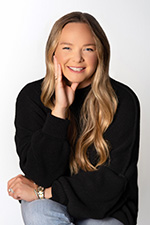 Founder and managing partner, Nest Builders Development & Design Studio, urban infill development
Founder and managing partner, Nest Builders Development & Design Studio, urban infill development Amanda Berkley Seibert first developed an interest in building homes as a child. She used to accompany her stepdad, a framer/builder, on job sites on North Carolina’s Outer Banks, and she helped her mom pick out the finishes. “That’s where I fell in love with real estate and construction,” Seibert says. “I love the process.”
Seibert earned her bachelor’s degree in advertising strategy with a business minor in 2012. Four years later, she founded Nest Builders, designing and building affordable, high-quality homes in Richmond, Virginia, and preserving historic homes in the city’s Church Hill neighborhood.
Seibert came to VCU with a passion for real estate and an entrepreneurial spirit; her education opened her eyes to ways to realize her dreams. “VCU provided an environment where I was able to explore lots of different career paths and meet lots of different people,” Seibert says. “The diversity at VCU gave me a window into different worlds, and that helped me solidify what I wanted to do after college.”
Over the past six years, Nest Builders has grown into a multimillion-dollar company and received multiple awards, including the 2020 Golden Hammer Award for best historical renovation, Best of Houzz Design in 2019, 2020 and 2021, and second place in Style Weekly’s 2020 Best of Interior Design series.
“What makes Nest Builders so unique is our goal to deliver elevated style and design at affordable prices,” Seibert says. “You shouldn’t need a million dollars to get a home that feels like it was designed with thoughtfulness and attention to detail.” Unlike production builders, Nest Builders sells most of its entry-level homes for around $300,000.
The company keeps costs down in part through “land banking,” buying vacant land on speculation (without a buyer or contract in place) and developing it later. They also use a tax credit program to preserve and renovate historic homes on a budget.
Working in a male-dominated industry, Seibert has garnered attention for her innovative approach to development and historic home restoration. She’s also developed a sizable local and national following for amandaseibert.com, her lifestyle, home decor and travel blog, which has generated sponsorships and product endorsements.
“The work I do is just so gratifying,” Seibert says. ”I love the business side of things, but to see the fruits of our labor materialize in front of us is the most rewarding part of the job. These homes are bringing lifeblood back into the neighborhood through beautiful architecture and new neighbors who are just as excited to be here as we are, and it just doesn’t get any better than that.”
Aditi Annu Sharma, M.D. (M.D.’17)
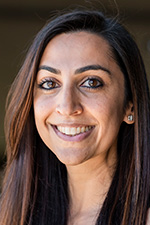 Micrographic surgeon and dermatologic oncology fellow
Micrographic surgeon and dermatologic oncology fellow
When the COVID-19 pandemic hit, the shortage of personal protective equipment around the country motivated Aditi Annu Sharma, a medical resident at UC Irvine at the time, to tap into her engineering skills, creativity and medical expertise. She and colleague Melissa Chang, M.D., sought new ways to develop face masks vital to protecting hospital workers.As Sharma began exploring ways to help the community, she realized reusable and re-sterilizable masks would be the most beneficial option, given supply chain shortages.
The desire to upcycle material was motivated not only by necessity but also by an interest in sustainability that emerged from Sharma’s experience working at the Public Health Foundation of India between college and medical school.
“During my time in New Delhi, I realized how society can thrive even when resources are scarce,” Sharma says. “It just requires a bit of creativity.” She felt inspired to pursue a solution that would repurpose common medical materials and divert waste from landfills.
Sharma soon came across an article reporting the high filtration efficiency of the wrap material used for surgical equipment sterilization; its ability to provide a barrier against outside particles made it ideal for protective masks. She sent samples of the material to an independent laboratory at Massachusetts Institute of Technology, and tests confirmed it was nearly as effective as that used for N95 masks.
Sharma noticed that the hospital was throwing away its sterilization wraps after just one use. Upcycling the material into face masks could keep hospital staff safe from COVID-19 while simultaneously protecting the environment.
Sharma and Chang co-founded the nonprofit Recyclablu to develop and produce masks from recycled sterilization wraps, with support from the UC Health System, local seamstresses and engineers. “The pandemic showed us that, despite physical distancing, the power of communities to bring together their talents and skills demonstrates that the best innovation is a result of collaboration,” Sharma says.
All told, Sharma and Chang have recycled more than 2,000 pounds of materials and produced 13,500 reusable masks, which were donated to hospital employees and underserved communities in Los Angeles. The mask was selected by the World Health Organization for the 2021 compendium of innovative medical devices and earned Sharma the Association of American Medical Colleges’ 2020 community service award for residents.
“It is really our great hope that this recycling initiative is just the beginning of a bigger movement towards sustainability within the medical field,” Sharma said. “We hope to continue to be a catalyst in promoting the medical field to think about how we can recycle and repurpose many of the materials that we are using in the hospital to reduce the waste we are producing.”
Sharma’s drive to innovate develops out of her background in engineering. “I think something that is fundamental to engineering is asking, ‘Is this the most efficient process? How can we improve it?” Sharma says.
Sharma’s wide-ranging interests and experiences enable her to bridge innovation, sustainability and medicine. “The masking project, in its essence, represents the intersection of my passions while allowing me an opportunity to give back to the community and help contribute to the fight against COVID-19,” Sharma says.
Tara Talbott, RN (B.S.’16; M.S.’19)
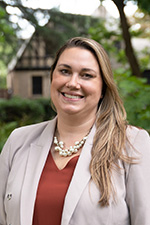
Chief nursing officer, VCU Health Tappahannock
Since earning her B.S. from the VCU School of Nursing in 2016, Tara Talbott, RN, has quickly risen through the ranks at VCU Health Tappahannock Hospital. In 2019, she graduated magna cum laude with a master’s in nursing administration and leadership from VCU, and, for the past year, she has served as the hospital’s chief nursing officer.
Talbott credits her professors for helping her develop the skills to succeed. “VCU School of Nursing values evidence-based practice and collaboration, which is evident in every class I attended,” Talbott says. “I learned how to better work with different personalities and leverage our differences to accomplish a task and come to a better answer.”
Talbott began her nursing career at Southside Regional Medical Center in Petersburg, Virginia, as an emergency room nurse. That intense, hands-on experience helped her develop competencies that remain essential.
“When you work in the emergency department setting, you have to learn the unique skill of rapidly triaging and reprioritizing, not just in terms of patients but in terms of your tasks,” Talbott says. “I continue to use those skills as a nurse executive.”
While working toward her B.S., Talbott served in the Virginia Office of the Attorney General as a nurse investigator, examining complaints of fraud. She collaborated with the U.S. Department of Health and Human Services and the FBI, learning from their perspectives on health care.
She then served as the director of emergency services at VCU Health Tappahannock. Her performance in the ER led to her appointment as chief nursing officer in 2021.
In her current role, Talbott institutes best practices to foster more positive experiences for patients and practitioners alike. For example, she spearheaded an initiative whereby triage nurses, rather than receptionists or other administrative staff, greet ambulatory patients in the emergency room. That one change has cut the length of hospital stays, improving both efficiency and the patient experience.
Talbott encourages the nurses at VCU Health Tappahannock to set personal goals and continue their education. She does the same herself: She’s currently pursuing a Doctor of Nursing Practice degree at VCU, even as she works full time.
Talbott’s main motivation for continuing her education and career path is her four kids, ages 1 to 15, who have attended both her graduations. “I hope that in some small way I’m helping them continue their education and instilling a love for learning throughout their lifespans,” she says.
- 2021
-
May Abdelaziz, Ph.D. (Ph.D.’13/P)
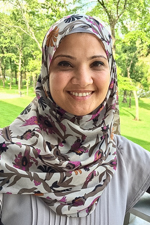 Assistant professor/founding faculty, Ben and Maytee Fisch College of Pharmacy, The University of Texas at Tyler
Assistant professor/founding faculty, Ben and Maytee Fisch College of Pharmacy, The University of Texas at TylerA day in the life of May Abdelaziz, Ph.D., includes running a biomedical research lab, advancing women and minority representation in STEM careers, mentoring students, shaping a new academic pharmacy program and raising two young children.
Balancing it all isn’t easy, but it’s immensely gratifying for Abdelaziz, who came to the U.S. from Egypt in 2008 as a Ph.D. student at VCU’s School of Pharmacy. She was drawn to the field of drug development and worked in the lab of Umesh Desai, Ph.D., chair of the Department of Medicinal Chemistry, where she made significant contributions to the lab’s published research. In 2013, her contributions earned her the school’s highest accolade for a graduate student, the Charles T. Rector and Thomas W. Rorrer Jr. Dean’s Award for Excellence in Graduate Study. Following two postdoctoral fellowships, Abdelaziz joined the University of Texas at Tyler in 2018 as a founding faculty member of the Fisch College of Pharmacy, where she runs a lab focusing on drug discovery and cell biology related to antibiotic resistance and breast cancer.
Abdelaziz’s biggest source of professional pride comes as a mentor. As an immigrant and a Muslim woman, she knows firsthand the challenges that women and people from underrepresented groups face, especially in STEM fields and academia. With that in mind, she goes beyond simply recruiting such students; she helps guide them as they overcome obstacles that often prevent them from pursuing research careers.
In her role as a faculty leader, promoting compassion and inclusivity outside the lab is equally paramount. “I strive to make my pharmacy students advocates for their patients, which requires respect for different backgrounds, attitudes and perspectives,” she says. To help instill this philosophy, Abdelaziz incorporates team-based learning, with a strong focus on group collaboration, accountability and a variety of perspectives when approaching a problem. In 2019, that teaching excellence was recognized when she was named Teacher of the Year for the Fisch College of Pharmacy.
Above all, Abdelaziz is proud to maintain a healthy balance between her professional goals and her family life. Her ability to navigate this balance after her first child was born left a lasting impression on her VCU mentor Desai. “May was conscientious and highly focused,” he says, prioritizing both finishing her graduate work within five years and being a parent. “This level of resolve and focus makes her a role model I wish more students would emulate.”
Though that work/life tightrope can be difficult, it helps, Abdelaziz notes, that she loves her work. “The most important thing is to love what you do. If you don’t come forward excited every day, it’s impossible to truly enjoy your successes and endure through the challenges.”
Dominic Brown (B.S.’11/B)
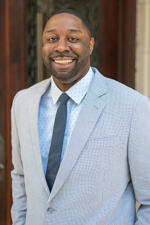 Founder, TallTravelEats brand and marketing
Founder, TallTravelEats brand and marketingA quick scroll through Dominic Brown’s award-winning social media feeds are sure to whet the audience’s appetite for both culinary and travel adventure. While that’s exactly the response Brown had in mind when he created TallTravelEats, the life-altering events of 2020 have added a higher purpose.
Brown started the TallTravelEats brand and Instagram account in 2017 as an outlet for his love of food and travel. Those two passions were born from the “hidden gem” small businesses he discovered in his travels as a student-athlete. The project grew into a vision of a social media brand that encourages people to explore the world and promotes small businesses in the food and hospitality industries.
Restaurants have been among the hardest hit by COVID-19. As many pivoted to accommodate a marketplace limited to takeout and delivery service, Brown also pivoted and began a focused campaign to use his influential platform to promote restaurants in his hometown of Richmond, Virginia. He shared the usual enticing photos of popular dishes, but also recorded videos showing safety precautions and contactless takeout tactics and made “top lists” to highlight niches such as “best ice cream” and “best BBQ.”
“Small businesses are so crucial to a city’s economy, and seeing the ones in my hometown struggle to survive was gut-wrenching,” he says. “I made it my mission to use the tools I had available to help as best I could.” The effort earned him recognition in local media and a coveted spot in Richmond Magazine’s “Best of 2020” issue as a top local Instagram account and influencer.
Brown grew up just blocks from VCU. His early college years playing basketball took him to Nebraska and California, sparking his desire to explore new places. “I set a goal to visit every state as well as travel the globe after college,” he says. “I want to see everything that the world has to offer firsthand and document it.”
When injuries ended his basketball career, coming home and transferring to VCU was an easy choice. His dual commitment to his studies in marketing and continuing his travels laid the perfect foundation for the TallTravelEats brand. It also gave him the opportunity to give back to the community where he grew up, mentoring young athletes. He has coached at schools and camps throughout Richmond, and during the pandemic he has volunteered with Atlantic Outreach Group assembling personal hygiene kits for people in need.
Like many, Brown is eager to travel again. His vision for TallTravelEats includes both U.S. and global exploration. His Richmond roots remain strong, however. He lives by the advice from his great-grandfather: “Work hard, stay humble, chase your dreams and never forget where you came from.”
Assil Diab (B.F.A.’11/A)
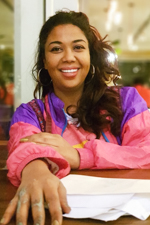
Artist and activist
As an undergraduate intern in New York City in 2010, Assil Diab fell in love with the graffiti she saw all around her. She couldn’t have predicted how her new passion would change the course of her life.
The Romanian-born Diab has lived most of her life in Sudan and Qatar. A scholarship to the VCU School of the Arts in Qatar enabled her to come to the U.S. and complete her bachelor’s in fine arts at the VCU campus in Richmond, Virginia. After graduating in 2011, her life changed again the next year, when she took an internship in Qatar as part of a team helping French-Tunisian street artist El Seed with a substantial mural project. That’s when she first tried spray painting and discovered her own talent for the medium. Abandoning her original career goal to become a shoe designer, she became a full-time graffiti artist, and “Sudalove” was born.
“I call myself ‘Sudalove’ as an expression of love for Sudan and to outwardly identify the voice I have as a Sudanese woman through my art,” she says. In her first exhibit, in Qatar, nine of the 13 works of graffiti on canvas were sold in the first two days. She has since exhibited in Bahrain, Germany, Bangladesh and the U.S.
After her epiphany in 2012, she began painting murals of notable Sudanese cultural and political figures; she’d often add an excerpt of their work to go with the portrait, such as a few lines of poetry with the writer’s larger-than-life image. That initial project ultimately led to the Martyrs Graffiti Project. During the Sudanese revolution in 2019, she painted 30 murals in and around Khartoum and three other locations, showing the faces of protesters who had died in the uprising.
This powerful use of graffiti art as nonviolent protest was done at significant personal cost and at the risk of her safety, but the ripple effect has been gratifying. “Now, there are murals and paintings on every corner, where previously there had been none,” Sudalove notes. “People continue to honor the martyrs in their towns.
In 2020, she won a UNESCO dissemination award for her street art campaign raising awareness about COVID-19.
Now living in Doha, Qatar, she’s working on a documentary film about the project while pursuing other big dreams. She wants to conduct workshops that empower women to be creators as a path to self-sufficiency. Another major goal is to work with Sudanese children to paint the world’s biggest mural along the Nile — a significant work of art that would also serve as an example of a Sudanese woman breaking traditional barriers in the quest for positive cultural change.
“I am proud to be a pioneer as the first graffiti artist from Sudan and Qatar. I think it’s important for people of my culture to see a woman using artwork as nonviolent activism,” Sudalove says. “There is nothing more I could have wanted than to inspire people to use art to share their voices.”
Tanya González (M.P.A.’17/GPA)
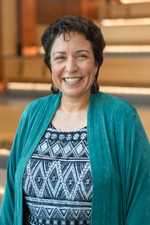 Executive director, Sacred Heart Center
Executive director, Sacred Heart CenterTanya González lives with one guiding principle: “Liberation for all.” On any given day, she works toward this ultimate goal through public service, executive leadership, one-on-one relationships, advocacy, even dance. González grew up in McAllen, Texas, along the Mexican border, amid a community that straddled two cultures. After completing her undergraduate degree in Latin American studies at Brown University in 1998, she moved to Richmond, Virginia, taking a job with the city to help establish support systems for the area’s fast-growing Latinx community.
She spent more than a decade in that role, where she helped set up, then manage the Office of Multicultural Affairs. She built a network of services for Spanish speakers at the local government level and established two annual multicultural celebrations — Imagine Festival in south Richmond and El Juguetazo (Three Kings Day) in Chesterfield — both conceived to engage families in celebrating Latin heritage and traditions and enhance community connection.
In 2016, González became the executive director of the Sacred Heart Center, whose mission is to help Latino families thrive and flourish. With a focus on educational and human services programming, Sacred Heart Center serves approximately 10,000 people per year through ESL courses, citizenship preparation, the Latino Leadership Institute, GED curricula and more. González led a pivot to crisis response during the COVID-19 pandemic, providing thousands of meals, subsidizing housing costs and distributing more than $1 million to prevent evictions. “My day-to-day work is really about being available at every level of the organization,” González says. “Every day is intense and stressful and also really beautiful.”
González says VCU’s Wilder School played a key role in developing her leadership capacity. “Pursuing my master’s in public administration midcareer meant I was able to bring a lot of my personal and professional experience into the classroom and tailor my work accordingly. I was able to apply what I was learning immediately,” she says. VCU also helped her build a strong network and provided ongoing opportunities to collaborate on community-based research.
When González hangs up her executive director hat for the day, she puts on her dancing shoes. A lifelong dancer, she has taught traditional Mexican and Latin American dance since she moved to Richmond, using it as a creative outlet and a way to pass on beloved traditions and heritage from her childhood to a new generation.
Whether it’s teaching dance or leading Sacred Heart Center through the slow emergence from COVID, González’s goal is the same: Meet people where they are, empower their personal success and fortify the community, regardless of obstacles.
It can be tough sometimes, but she draws on the image of a palm tree: “A palm tree bends in the wind, and leaves might move around a lot. But it stays flexible and doesn’t break, even when a hurricane comes through.” When she or her staff sometimes feel as though their ultimate goal — true liberation for the communities they serve — seems out of reach , she reminds them of that image of fortitude and resilience. Then she forges ahead.
David Hinton Jr. (B.A.’12/GPA; M.Ed.’13/E)
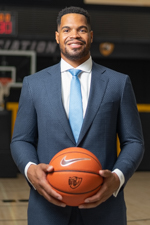 Special Agent, U.S. Secret Service
Special Agent, U.S. Secret ServiceA basketball court might seem like an unlikely training ground for a high-stakes job in the U.S. Secret Service, but it proved true for David Hinton Jr. Hinton aligns his experience as a student-athlete to his job protecting high-level officials: “There is no room for complacency or entitlement. No day is ever the same, so you have to approach each one with a determined and humble mindset.”
Hinton came to VCU from Winston-Salem, North Carolina, and he recalls “just knowing” VCU was the right place for him as soon as he and his father first visited campus. While pursuing his undergraduate degree in homeland security and emergency preparedness, he played for the Rams from 2008-13, including four NCAA tournaments and the historic 2011 Final Four season. “I loved being a student-athlete at VCU. It required adopting and maintaining high standards for myself, and I carry those with me to this day,” he says. VCU Athletics recognized those standards with the Iron Ram Award, which honors elite student-athletes with an exceptional work ethic.
As an undergraduate in the Wilder School, Hinton interned at the Virginia General Assembly and the Virginia Office of the Attorney General, experiences that piqued his interest working in the public sector. He earned his master’s degree in sports leadership and considered several lucrative corporate jobs, but ultimately knew he wanted a service-driven career.
In 2014, he became a member of the U.S. Secret Service, an ever-changing job that has taken him to six continents; and allows him to witness history firsthand. Above all, Hinton prioritizes paying it forward, as a way to express his gratitude for what VCU gave him. He remains engaged with the Wilder School and the Center for Sport Leadership, mentoring students and student-athletes and offering guidance about careers in government service and federal law enforcement. He serves as a mentor through the VCU Basketball Development Center and Student Athlete Support Services, and is a featured speaker for the Rams Leadership Academy.
Hinton is a member of Alpha Phi Alpha Fraternity Inc. and has been involved in its voter registration initiative and its Brother’s Keeper program, which supports older, disabled and more vulnerable members of the fraternity and their families. Hinton has also been involved with the March of Dimes and as a volunteer youth basketball coach in Alexandria, Virginia. He is passionate about helping young people develop a positive relationship with law enforcement.
Hinton proudly credits his VCU experience for instilling in him a commitment to service and mission that is bigger than himself. “Our work is a ’no fail’ mission. If we mess up, the world stops. The sacrifice for the job is great, but the rewards are even greater.”
Monique Johnson, Ph.D. (Ph.D.’14/GPA)
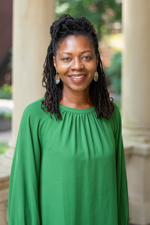 Vice president and chief operating officer, Better Housing Coalition
Vice president and chief operating officer, Better Housing CoalitionGrowing up in a low-income, marginalized neighborhood in northern Virginia gave Monique Johnson, Ph.D., a front-row seat to the impact of economic disparities, social dislocation and limited supportive resources, both on the individual and on the community. It helped her see how an individual’s physical environment has a direct connection to the quality of life they experience. And it inspired her drive to provide better opportunities for people from underserved communities.
Johnson now serves families in neighborhoods similar to those she knew growing up, as vice president and chief operating officer of the Better Housing Coalition in Richmond, Virginia. The nonprofit is based on the fundamental conviction that access to housing is a springboard to success in education, employment and health, and it works to fulfill the vision that every citizen, regardless of income, has good choices for where they live. As COO, Johnson oversees $250 million in real estate assets across Central Virginia, supports service coordination such as financial and career counseling for BHC residents and works to improve the organization’s overall efficiency.
Johnson started her career in civil engineering, but she says it was VCU’s Wilder School, where she earned her Ph.D. in public administration, that showed her how she could help make a difference in the community through her work. “I really thought that I was a civil engineer with an M.B.A. and that my path was set. But VCU — the professors and the rigor of the coursework — really empowered me to embrace divergent ways of thinking and see the impact I could make in the world through a career in public service,” Johnson reflects.
Since earning her doctorate in 2014, she has been an adjunct professor of real estate in the VCU School of Business, and in 2018 was inducted into the VCU School of Business Real Estate Circle of Excellence. She has also channeled her commitment to inclusion into a VCU task force to help improve hiring and retention rates of underrepresented minority faculty.
In 2020, Johnson’s expertise earned her seat on the state Board of Housing and Community Development. She has also been awarded the Marshall Memorial Fellowship through the German Marshall Fund and has been recognized by Style Weekly as a “Top 40 Under 40” subject and by Affordable Housing Finance Magazine as a “Young Leader in Affordable Housing.” She also serves on other statewide committees designed to strengthen community development infrastructure.
Of all her professional accomplishments, Johnson takes the most pride in being a mentor and advocate for women of color, particularly in commercial real estate. “There aren’t many women who operate in this space, and even fewer women of color. As our country becomes more and more diverse, it’s critically important that those who are making decisions around how our built environment is developed reflect the diversity of those who are in the communities.”
Danny Mallory (B.S.’15/N)
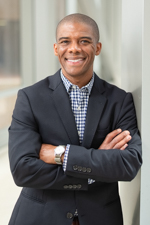 Adult-gerontology acute care nurse practitioner, VCU Medical Center
Adult-gerontology acute care nurse practitioner, VCU Medical CenterWhat happens when you combine a degree in health services administration, four years of corporate project management work and an advanced-practice nursing degree? In Danny Mallory’s case, you get a health care leader whose passion for improving lives extends far beyond the bedside.
Mallory came to VCU School of Nursing in 2014, following a calling to a more hands-on approach to health care. His background in administration gave him a unique perspective on the business side of health care — which affects medical practices, and ultimately, patients.
He incorporated this experience while working as a bedside RN on VCU’s acute care surgery unit. In one case, he noticed a practice that resulted in significant waste of IV narcotic medications. He submitted a project idea to the VCU Health Innovation Consortium, which brings together health care practitioners, colleges and schools across VCU, entrepreneurs, and investors to pursue new strategies to challenges in health care. The College of Engineering and the da Vinci Center for Innovation picked up the proposal; student teams developed potential solutions, with Mallory as mentor, and the da Vinci students discovered a viable way to reduce IV narcotic waste. VCU Health System acknowledged the benefits of the proposed solutions and is considering implementing the new approach for potential savings for both the hospital and patients.
Being a catalyst for innovation is not only a feather in Mallory’s cap, but has a ripple effect, providing his mentees with practical experience. “From the moment I started nursing school at VCU, I was so appreciative of the culture of learning, teaching and discovering, he says.” Everyone — from students to seasoned medical professionals — is constantly seeking to learn and pushing for better. These unique cross-departmental opportunities to collaborate just reinforces that culture.”
Mallory particularly appreciates the diversity of thought that cross-collaboration fosters and the role he plays representing the end-user. “The students have brilliant ideas, and I get to be the reality check as to which ones are viable in a real-world clinical environment. I know which interventions [will work well with nurses’ responsibilities]. I understand how providers will utilize such data and tools.”
Mallory’s leadership has been recognized locally and nationally. Mallory serves on the VCU School of Nursing Advisory Council, which offers insight and guidance on trends and issues in the field, and is a nursing liaison for the College of Engineering’s Vertically Integrated Projects program, which provides undergraduate students the opportunity to participate in multiyear, multidisciplinary team-based projects under the guidance of faculty and graduate students in their areas of expertise. In 2019, he attended the prestigious U.S. Department of Defense Joint Civilian Orientation Conference, where health care, business and community leaders can engage with the military.
But serving patients is still what drives him. “It still astounds me that I’m having really important discussions and helping make big decisions with patients and families about real life. It is truly a privilege to help save someone’s life. It’s an honor to be of service in that way.”
Annie Rhodes (M.S.’17/CHP)
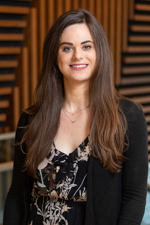 Research associate, VCU Department of Gerontology
Research associate, VCU Department of GerontologyWhen Annie Rhodes began working at a care community at age 16, she had no idea she would find her life’s purpose as an advocate for older adults. But that positive experience showed her how aging is a common experience among humans and the value of fostering a deeper understanding of the physical, mental and societal impact.
Rhodes’ interest in the implications of aging led her to pursue a master’s degree in gerontology at VCU’s College of Health Professions in 2015. The opportunities to grow and VCU’s focus on service learning kept her there as a Ph.D. student in health science, with a concentration in gerontology; she’s studying the impact of health practices among low-income elders with faculty at the Department of Gerontology
“The more I understand the socioeconomic disparities that exist in aging, the more passionate I am about advocating for older adults,” Rhodes declares. “We are all aging people, so any investment in infrastructure or supports for older adults are interests we should all share.”
The heightened risks elders face because of COVID-19 put a spotlight on their needs — and deficiencies in the health care system. “I was immediately frightened for them when the pandemic hit,” she says. Besides the dangers of social isolation that already existed for older individuals, she was most disturbed by the ageism and hostility she witnessed in the form of discriminatory rhetoric suggesting older people are a more expendable segment of the population. This messaging only reinforced her deeply held belief that integrating older adults into the larger community is more important than ever.
For Rhodes, this bridge-building starts with pursuing allyship with marginalized communities and promoting diversity in gerontology research — which first requires building trust. “Coalition building and community partnerships are a big part of my personal mission.”
That in turn drives her goal of broader community awareness and engagement to create lasting change. She has a strong interest in increasing the quality of education for nursing homes, which she has been able to foster through the VCU COVID Action Network’s Project ECHO, a mentoring-based learning network for nursing homes.
As she continues to tackle challenges and opportunities in front of her, Rhodes’ thoughtful approach is clear. “I think more than anything I’ll just be listening. And whatever answers the community gives, I’ll be acting on that.”
Daryl Van Tongeren, Ph.D. (Ph.D.’11/H&S)
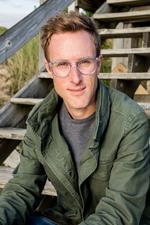 Author and associate professor of psychology, Hope College
Author and associate professor of psychology, Hope CollegeDaryl Van Tongeren, Ph.D., studies some of life’s biggest questions — the meaning of life, religion, virtues, to name a few. In 2020, the COVID-19 pandemic arrived just as he finished writing “The Courage to Suffer: A New Clinical Framework for Life’s Greatest Crises,” putting an often conceptual field of study into stark real-world context.
Van Tongeren and co-author Sara Showalter Van Tongeren (M.S.W.’08/SW) (also his wife), found themselves in the unexpected position of leveraging the work in the book into research examining the impact of COVID-19 and the spectrum of psychological responses people have experienced.
The relevance of this research captured significant attention, adding to his growing resume. Since Van Tongeren earned his Ph.D. in experimental social psychology in 2011, he has published more than 175 scholarly articles, resulting in coverage of his research in media outlets such as The New York Times, The Washington Post and Scientific American and earning him several awards, including the 2016 Association for Psychological Science Rising Star Award and the Society for the Psychology of Religion and Spirituality (APA’s Division 36) Margaret Gorman Early Career Award for 2022.
In 2012 he joined the faculty of Hope College, a liberal arts college in Holland, Michigan, where he has continued the legacy of personal and professional mentorship he knew at VCU. Mentorship is particularly à propos for his specialty. “College students are about to launch into the rest of their lives and sometimes have some big questions — questions that fall into my realm of study. I like providing support at that critical juncture in life,” he says.
The appreciation is mutual. The senior class at Hope College chose Van Tongeren to give the 2021 commencement speech, an honor he took seriously, particularly for the seniors graduating amid the pandemic. “I told the students to think of their life as an assignment, in that time is limited. Assignments have due dates that keep you motivated — think of life as having a similar sense of urgency and you will approach it with more intentionality.”
Van Tongeren is working to broaden understanding of the psychology of religion, engaging groups that are often underrepresented in this research field (nonreligious, agnostic, those who identify as spiritual but not religious). He has developed a new line of research studying the religious “dones” — those who identify as nonreligious after de-identifying from a religious community they were previously affiliated with — to help expand understanding of religious practices outside the boundaries of traditional institutions and models.
This pursuit chimes with Van Tongeren’s overarching mission to help create a more compassionate world. “I hope to be able to encourage people to live meaningful lives in which they are able to care for others and fight for rights and justice for all people. If I could make the world a bit more loving and a bit more accepting, a bit humbler, a bit more open to a wider variety of perspectives, I would define that as professional success.”
Deonte Young (B.A.’11/H&S; M.Ed.’13/E)
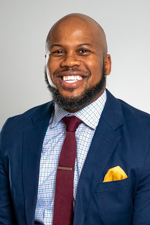 Co-founder, Alchemy InCoaching, and education administrator, Fairfax County Public Schools
Co-founder, Alchemy InCoaching, and education administrator, Fairfax County Public SchoolsIn 2011, Deonte Young was preparing to graduate from VCU with a political science degree and a presidential ambition inspired by former President Barack Obama — but he didn’t have a clear idea of his next steps to make the dream a reality. VCU adviser Carlton Goode helped him identify school counseling as a way to channel his drive to help people and become a leader.
Young went on to graduate school at VCU, earning a master’s degree in counselor education, which helped focus his goal to help young people unlock their potential. His success fueled his desire to work with kids and sparked a new goal: to reform educational policy and provide equal access and opportunity for all students.
Young began working as a school counselor in Fairfax County Public Schools in northern Virginia, seeking out activities that enrich students’ lives. He worked with academic support programs and led service-learning trips to Ethiopia and Ecuador. In 2019, he and two partners, including fellow alum Armand Johnston II (B.S.’12/H&S), founded Alchemy InCoaching, an educational consultancy working with students in sixth grade through college. Sessions focus on development gaps like executive functioning abilities.
“We provide students with the skills and resources they are not getting in a typical school day,” says Young — practical skills that help them achieve their goals, such as time management, study skills and organization. “We are not interested in quick fixes — we want to be part of an educational transformation that leads to lasting success.” Alchemy InCoaching is working with individual students in northern Virginia and has recently partnered with Norfolk City Public Schools in Southeastern Virginia.
Young’s passion for empowering others extends to his peer group. In 2018, insightful conversations with friends and fellow members of Alpha Phi Alpha Fraternity Inc. inspired him to form an empowerment group for men. Let the Man S.P.E.A.K. (Share thoughts, Perfect your craft, Empower others, Achieve goals, Know your worth) began as an avenue for men to prioritize open discussions and support; discussions might range from professional development and financial management to mental health and family relationships.
Young continues to seek opportunities to effect systemic change and ways to expand his involvement in advancing educational policy to create a more equitable public school system. In the immediate future, he wants to develop programming at Alchemy InCoaching and have a dedicated collaborative space to host group activities and bring families together. As the company grows, Young continues to evolve his business model to provide greater access for students and families who can’t afford coaching costs. He also gives back to VCU as a mentor through the African American Alumni Council.
Young is fueled by words he often heard from his grandfather: “Good, better, best; never let them rest until the good is better and the better is best.”
“That’s one thing I think about daily,” Young says. “I’m constantly trying to make my best even better and pass that philosophy on to the next generation.”
- 2020
-
Johannes Barfield (M.F.A.’18/A)
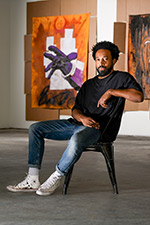 Johannes Barfield creates attention-getting multimedia work. His installations — comprising photography, video, sculpture and sound — embody the Black American experience and how institutions and systems of power and influence are connected to the amplification and nullification of Blackness. He explores how race, class and societal influences create and maintain violence, and while his work can be seen as controversial, it’s captured critical acclaim.
Johannes Barfield creates attention-getting multimedia work. His installations — comprising photography, video, sculpture and sound — embody the Black American experience and how institutions and systems of power and influence are connected to the amplification and nullification of Blackness. He explores how race, class and societal influences create and maintain violence, and while his work can be seen as controversial, it’s captured critical acclaim.At the Mint Museum in Charlotte, North Carolina, Barfield took home the $10,000 Atrium Health Best in Show Award for his work included in the 2020 “Coined in the South” exhibit. His multimedia pieces “In The Bilge Again” and “The Green House on Cornell Blvd.” shared the floor with work by 44 of his peers from North Carolina, South Carolina, Alabama, Georgia, Tennessee, Texas and Virginia.
He also has exhibited his work throughout the U.S. and has won numerous fellowships, residencies and awards in the short two years since his graduation from the VCU School of the Arts. In 2019, Barfield received the Fine Arts Work Center Fellowship in Provincetown, Massachusetts, a seven-month fellowship awarded to 20 artists annually. Fellowships fund artists’ endeavors to help them sustain or enhance their creative process.
It’s not lost on him that he’s come a long way from his small-town roots of Winston-Salem, North Carolina. “Small-town mentality isn’t a negative thing, and the small-town way of life is also very important, but as someone trying to be an artist, it was very difficult for me to be able to break free of that,” he says.
He earned his B.F.A. at nearby University of North Carolina-Greensboro before enrolling as a graduate student at VCU, where he found the space to experiment with different media.
“I’ve always been interested in film and video work, and then I also was thinking about sculpture,” he says. “VCU was a good place as a nexus for me to be able to connect all those different things that I was interested in to see if it had potential to become part of my practice.”
That practice continues to get noticed. He was invited in August 2020 to join the Merriweather District Artist-in-Residence Program, which brings together artists to work, live and create in downtown Columbia, Maryland. Provided with housing and supported with a $12,000 stipend, the six-week residency allows Barfield the freedom to take risks and to pursue new projects, which continue to create conversations.
“I don’t know if my [work] has touched individuals outside of my personal community, but I would hope so,” he says.
Ace Callwood (B.S.’12/B) and Justin Kauszler (B.S.’12/B)
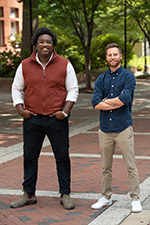 For the record, Ace Callwood doesn’t like coffee. But that didn’t stop him from partnering with former VCU business classmate Justin Kauszler to create Coffitivity, an ambient sound website and app that was named one of Time Magazine’s Top 50 Sites of 2013.
For the record, Ace Callwood doesn’t like coffee. But that didn’t stop him from partnering with former VCU business classmate Justin Kauszler to create Coffitivity, an ambient sound website and app that was named one of Time Magazine’s Top 50 Sites of 2013.The two initially butted heads in class but eventually decided to work together on their entrepreneurship senior capstone project, conceiving and creating a business plan for CycleStay, a bicycle security system.
As is often the case, one good idea leads to another. Many of the hours spent working on CycleStay took place at Richmond, Virginia, coffee shops, where Callwood and Kauszler found they could think better than in the hush of an office setting. This, combined with a study the pair read in the Journal of Consumer Research that showed a certain level of ambient noise increases creative cognition, triggered a light-bulb moment for Kauszler one day when he was struggling to concentrate at work.
“It was that perfect storm,” Callwood says. “Justin called me and said, ‘This is what we need to do.” And I said, ‘No, that’s stupid, that’s a terrible idea.’ And he said, ‘Guess what. We’re doing it anyway.’”
That kind of push and pull is what propels this longtime pair of business partners, and best friends, to continually innovate. “The two of us were arguing with each other, and that challenge is something that we really embraced,” Callwood says. “Having people push you is important to the work that we get done.”
Two years after launching Coffitivity, they founded Painless1099, a smart-banking solution that automatically withholds taxes for freelancers and independent contractors. The business closed its doors this year after it received major accolades but was unable to find a sustainable model. “It’s part of the gig,” Callwood says. “An occupational hazard of starting a thing is you may have to pull the plug if it’s not working. That’s what happened with Painless, unfortunately.” Coffitivity is still buzzing, and the pair has a new venture, Equal Sons, to serve as a clearinghouse for projects they want to pursue both individually and collaboratively.
“What we said is, ‘What do we do every time we’re in a rough patch? We hustle our way out of it.’ And so we started Equal Sons as this vehicle to do all of the stuff that’s interesting to us. As a consulting firm, it’s become this nebulous thing where it houses all of our projects, allows us to build products and tell stories, which encompasses both of our core skill sets, [Justin] as a developer, me as a communicator.”
Meanwhile the pair have found their way back to VCU in positions related to their stints as entrepreneurs-in-residence at the VCU School of Business and Innovation Gateway, respectively, where they worked with faculty mentors to secure Quest Innovation grants, university funding awarded to support initiatives that enhance the growth of VCU’s culture of innovation, creativity and entrepreneurship. Callwood used his grant to start a program to pay for students to work in startups and get real-time experience, while Kauszler helped develop a strategy that became the impetus for VCU Ventures, an office that works with regional partners to create startups around intellectual property developed by VCU faculty and staff. VCU Ventures paved the way for the establishment in 2019 of the Health Innovation Consortium, which leverages VCU faculty research, talented students and VCU Health, in partnership with Richmond’s entrepreneurial ecosystem, to support innovations that solve vexing problems in health care. Kauszler works at the consortium as director and lead developer of the portal supporting the consortium platform. In early 2020, Callwood accepted a position as director of communications for the Health Innovation Consortium and as a network catalyst for VCU Ventures. He also serves as a mediator, facilitator and diversity consultant with The Envoy Portfolio.
“I think what makes us work so well together is that we’re able to communicate on a different level that I think most people aren’t able to,” Kauszler says. “I think we can challenge or attack a problem or a point without attacking the person, and it really helps. And, because of that, it’s allowed us to go out and really challenge ourselves with hard problems.”
Martin Dcona, Ph.D. (Ph.D.’12/H&S)
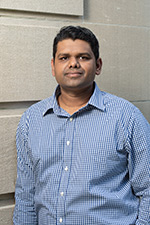 When a drug is active where it isn’t needed, it can harm the patient. Traditionally, this harm is called a “side effect” and accepted as a necessary evil. Martin Dcona, Ph.D., and his colleagues at the startup Light Switch Bio think that should change.
When a drug is active where it isn’t needed, it can harm the patient. Traditionally, this harm is called a “side effect” and accepted as a necessary evil. Martin Dcona, Ph.D., and his colleagues at the startup Light Switch Bio think that should change.For pharmaceutical manufacturers who produce potent drugs that cause severe side effects for patients, Light Switch Bio offers a laser-guided platform that minimizes side effects. The initial application is for delivering site-specific chemotherapy for head and neck cancers, developed in partnership with VCU Massey Cancer Center, the Center for Advancing Innovation and VABeachBio. Light Switch Bio’s innovative technology attaches a chemotherapy drug to a cell-impermeable molecule that remains inactive until it is illuminated, at which point it becomes active and cytotoxic only to the targeted cancer cells. Traditional chemotherapy drugs are active everywhere in the body, producing wide-ranging, unwanted side effects.
“The bigger goal is fewer side effects,” says Dcona, who designed the patented technology. “With this technology, patients undergoing chemotherapy will have lesser side effects because of this modified approach, which is a big deal. This type of targeted chemotherapy has not been done before.”
Dcona is now headed to the University of Southern California’s Norris Comprehensive Cancer Center as a research faculty member, after postdoctoral and graduate studies at Massey Cancer Center and previous work in the lab of Matthew C.T. Hartman, Ph.D., associate professor in the VCU Department of Chemistry, where light-based chemotherapeutic technology, the founding idea of Light Switch Bio company, was born. He calls himself the co-inventor, and Alex Ratti (B.S.’13/En; M.S.’18/En), who was also working in the lab and read Dcona’s papers, the entrepreneur who is helping the startup move forward.
“We scientists know stuff about science and work our magic, but the people who will make it sexy are at the entrepreneurial level,” he says. “Eventually, whenever the company gets established, I will be playing a more active role. Currently I am just watching it grow because it’s a very limited-resource company, and that’s how everybody starts.”
The company has participated in several pitch competitions, vying for funding and mentorship. Dcona also has presented his work to national and international audiences as a keynote speaker, a skill he honed at VCU.
Originally from India, Dcona says he had to overcome his fears of writing in and speaking English when he came to VCU. “You always think in your mother tongue, but then to articulate it is very difficult,” he says. Over time, his colleagues in the chemistry department encouraged him to write and speak more. “I put myself out there and overcame speech and writing challenges. I published book chapters and manuscripts and co-wrote the whole [Light Switch Bio] patent application,” he says. “Now I’m sort of a motivational speaker here at Massey,” he says. Massey Alliance, a fundraising arm of the cancer center, regularly taps Dcona to talk to donors in layman’s terms about the scientific advancements happening there. It’s fun to talk to donors on a personal level, he says, and it’s for a good cause. “It’s something I like, and I am proud of.”
Chtaura Jackson (M.S.’10/LS)
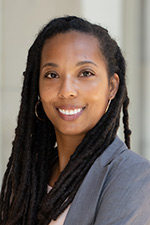 Chtaura Jackson has always been an adventurer, she says. So, in 2010, after finishing her master’s in environmental sciences at VCU Life Sciences' Center for Environmental Studies, she took a trip abroad. Instead of a few carefree weeks hopscotching through Europe, she headed for a small village in South Africa’s North West province, working in the Peace Corps for two years on a range of community development projects. The projects included providing HIV/AIDS and tuberculosis education at a local clinic, training staff in computer skills and database management, acquiring a grant to build a water collection system and developing training materials for staff at a local orphanage.
Chtaura Jackson has always been an adventurer, she says. So, in 2010, after finishing her master’s in environmental sciences at VCU Life Sciences' Center for Environmental Studies, she took a trip abroad. Instead of a few carefree weeks hopscotching through Europe, she headed for a small village in South Africa’s North West province, working in the Peace Corps for two years on a range of community development projects. The projects included providing HIV/AIDS and tuberculosis education at a local clinic, training staff in computer skills and database management, acquiring a grant to build a water collection system and developing training materials for staff at a local orphanage.After that, she says, “I was just hooked.” Next she went to a rural district in Malawi for a year for another wide-ranging assignment. There, she helped local government strengthen reporting, data management, coordination and assessment of various programs to address HIV/AIDS and developed a strategic plan for HIV/AIDS response as well as helped improve delivery of nutritional supplies to malnourished children.
Eventually, she spent two years in South Sudan working for the Carter Center and the Ministry of Health on their guinea worm eradication program. If Guinea worm disease sounds obscure, it is — largely because it’s of no concern to citizens of healthier, wealthier parts of the world. “It only affects the poorest of poor in the poorest country. The goal is to eradicate it; we only have four countries left in the world” where it still exists, she says.
Living abroad taught her resilience. “I think we really see who we are when we step out of our comfort zone. And I learned to be comfortable with being uncomfortable.” Living in South Sudan, a conflict zone, gave her that chance. “It really tests you to see what you can handle. I saw that I can survive and be able to thrive and help people in tough situations.”
Returning to the U.S. in 2017 with the kind of hands-on experience few accrue in a lifetime, much less by their mid-30s, she enrolled at George Washington University in a master’s in public health program, with a concentration in global health and epidemiology, which she will finish this year. (Not to rest on her laurels, she has also been volunteering with local HIV/AIDS nonprofits, applying the skills she honed abroad.)
She plans to continue working on infectious diseases and neglected tropical diseases, eventually leaving the U.S. again. Her previous experience has resulted in an extra dimension of relevance — she was in Malawi during the Ebola outbreak in Sierra Leone — so she wants to focus on prevention and control of future pandemics. In the meantime, she’s focusing on the current one, here at home: In August, she began working as logistics lead for the Richmond Health Department in its joint COVID-19 community testing program with Henrico County.
As strong as her service ethos is, it’s also rooted in a deep foundation of humility. Yes, she knows she’s helped those she serves, but she feels just as indebted to them: “I’ve touched people in meaningful ways, but I’ve also been touched as well.
“There’s an amazing proverb from the Zulu culture in South Africa: Ubuntu, or ‘I am because we are’ — I am who I am because of other people,” she says. “Being in a developed country, it’s easy to see ourselves in a bubble and don’t understand that we are all connected. I want to work within a community and to know people understand that we’re all connected. Because that is what will improve health and well-being and human rights.”
Stephanie Lynch (B.S.’10/H&S; M.S.W.’13/SW)
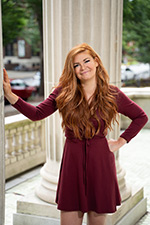 Stephanie Lynch never thought she’d run for public office or even take a front-and-center role in politics. She’s more of a policy wonk — and proud of it. “I am a classic social worker, a policy practitioner. What I really like is the down-and-dirty policy work that I do every day, the behind-the-scenes stuff that you don’t get credit for or you may not see in headlines; it’s consensus building, it’s connecting people and getting things done for the people in the community — the stuff that really makes an impact and a difference in people’s lives.”
Stephanie Lynch never thought she’d run for public office or even take a front-and-center role in politics. She’s more of a policy wonk — and proud of it. “I am a classic social worker, a policy practitioner. What I really like is the down-and-dirty policy work that I do every day, the behind-the-scenes stuff that you don’t get credit for or you may not see in headlines; it’s consensus building, it’s connecting people and getting things done for the people in the community — the stuff that really makes an impact and a difference in people’s lives.”So says the 5th District Richmond (Virginia) City Council member, who won a special election in 2019, becoming the first woman to represent the district. Now she’s running to keep the seat in the general election in November.
Her resume reads like a policymaker’s dream — director of government affairs at Good Neighbor, a nonprofit focused on mental health, where she continues to work; a key lobbying position representing Medicaid managed care plans, who helped push through Medicaid expansion in Virginia; and various policy and administrative jobs for state departments such as social services.
She also sits on the governor’s Task Force for Behavioral Health Workforce Development, the governor’s Children’s Cabinet for Trauma Informed Care and the governor’s Task Force for School-Based Health.
While her work has often focused on policy areas such as health care, mental health access and criminal justice, the common thread is how it all affects real people — frequently people without the wealth and power that often guarantees a voice in public decisions. For example, her work on Medicaid was spurred by one of her social work clients. “She was like a grandmother to me. She died of a preventable disease, and she would be with us here today if she had had health insurance. She inspired me to fight and go change the system. Now we have 400,000 [more] lives that are covered.”
She has VCU to thank for her current career, she says. As an undergraduate, she was influenced by a number of professors to be a changemaker, while her double major of women’s studies and psychology, with an African American studies minor, “allowed me to see the world from a lens and a perspective that to this day shapes the way I see the system and what solutions we apply to change it.” Her experience in VCU student government helped forge her standards of transparency, consensus building and collaboration — not just as guiding principles but also because putting those principles in action is the best way to get things done.
Lynch has her immediate sights on the upcoming election. Whether it’s ultimately a step toward higher office remains to be seen, she says. That’s a standard nonanswer from an elected official, but in her case, it stems from a deep respect for the job. She’s spent plenty of time as an advocate in the state legislature and watched people run for Congress; as important as those roles are, she relishes the direct impact she has at this level. “I’m like, man, local politics is no joke. It is not for the faint of heart, but the opportunity for impacting and improving the community is extremely tangible and real.” And it’s exactly where she wants to be.
Christopher McIntosh (M.A.’14/GPA)
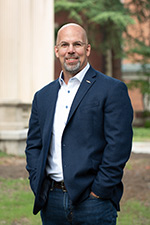 If there’s a disaster, call Christopher McIntosh. Better yet, call him before it strikes. As CEO of Bent Ear Solutions, his job is to help organizations prepare and respond to emergencies using sophisticated technology tools.
If there’s a disaster, call Christopher McIntosh. Better yet, call him before it strikes. As CEO of Bent Ear Solutions, his job is to help organizations prepare and respond to emergencies using sophisticated technology tools.His mission, he says, can be summed up as “making the world a safer place.” Practically speaking, that means “addressing the connection between the technology and the people who actually need to use it to make decisions.”
McIntosh founded Bent Ear, based in Alexandria, Virginia, in 2018, but he’s had a long history of service and innovation, spending nearly 10 years in the U.S. Navy. Since leaving the military, he worked, among other positions, at the state Department of Emergency Management, where he developed a system since adopted by other states; led strategy for the state’s public safety and digital communications systems, while he was working on his master’s in homeland security and emergency preparedness at the VCU Wilder School; and spent four years at ESRI, a top global geospatial tech company.
He credits the collaborative approach of his degree program for shaping his successful business and notes that the diverse population at VCU — “which you don’t find everywhere” — broadened his perspective. That, in turn, continues to nurture his creativity and innovative spirit. “It's been really helpful in my career to be able to step back and look at something from another point of view because that’s often where you'll find the solution to the problem.”
He’s especially proud that his business “actually helps people solve real-world issues.” Lately, that’s included the very real-word issue of the COVID-19 pandemic, which has affected almost all of his clients in one way or another. His company has responded with a variety of approaches to suit the situation, such working to develop products to monitor the spread of the disease or solutions to help open government facilities and acquire PPE.
The company recently created a tool to allow large groups to collaborate, combining social distancing and online options. “We took the technologies available and applied them to that problem quickly in a way that’s never been done before. Now that might be the new way of doing things. It worked so well.”
Meanwhile, he continues to give back to his alma mater. He recently joined the VCU Office of Alumni Relations’ Recent Graduate Council and is an active and engaged mentor to current students. “The transition from college to your first job in your career is super important. I Iike to help people through that any way I can, whether it’s advice or placement or references.” He serves as a guest lecturer at the Wilder School, giving back, but also paying it forward “so that future industry leaders are better prepared.”
Priscilla Mpasi, M.D. (M.D.’14/M)
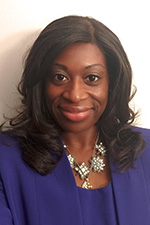 When Priscilla Mpasi, M.D., was 4 years old, she broke her arm. As she and her mother sat in the ER waiting room, she watched adults being called before her, as she waited for care. That’s when she decided that she would be a doctor when she grew up, so she could help kids like her.
When Priscilla Mpasi, M.D., was 4 years old, she broke her arm. As she and her mother sat in the ER waiting room, she watched adults being called before her, as she waited for care. That’s when she decided that she would be a doctor when she grew up, so she could help kids like her.As a pediatrician, she’s realized that goal. “It all starts with the patient, really trying to get to know them, being on their side, understanding their challenges.” And as she learned about them, she found her focus extended beyond the traditional role of physician wearing a white coat, sitting in an office — to the bigger picture. “I think it’s important for me to advocate for social determinants of health such as housing stability, good schools for all children and access to healthy food” — all the primary factors that contribute to wellness. “Children don’t get to pick their leaders, so how do we make sure we’re ensuring their health and well-being today, so they become healthy adults in the future?”
Now, in addition to her role as attending physician in the Division of Community Pediatrics at Children’s Hospital of Philadelphia, she’s pursuing a master’s in science of health policy and research from the University of Pennsylvania and is a child health policy adviser at the Delaware Department of Health and Social Services.
Mpasi is used to multitasking. While at VCU, she held leadership roles on several boards, including as the student representative on the VCU Board of Visitors and the Rural Education and Community Health for Ghana board; served on the Children’s Hospital of Richmond Advocacy Committee; and served as national vice president of the Student National Medical Association. She also joined the American Academy of Pediatrics and today is a member of the Council on Community Pediatrics. She has been recognized for her work with awards such as the AMA Physicians of Tomorrow Award, NMA Billie Wright Adams Scholar Award, the NAMME National Scholarship and the National Minority Quality Forum 40 Under 40 Leaders in Health.
She’s particularly interested in working with underserved communities and leadership development for minority physicians. Besides being a role model herself — she’s often the first woman physician of color her patients have met — she wants them to know their dreams aren’t out of reach. “I hear kids telling me ‘I want to be a lawyer. I want to be a doctor, I want to be a teacher, but I can’t afford to go to college. Or no one in my family’s been able to do that. And I can say, ‘Actually, you can.’
“That’s really how I want to make change — to make sure that children can grow up and have opportunities, no matter what ZIP code they’re born in.”
For now, Mpasi is taking it step by step. Eventually she’d like to make change on a large scale, whether it’s running a city or state health department or working for the Centers for Medicare & Medicaid Services.
Wherever she ends up, she sees herself as a servant-leader, responsible for carrying on a legacy. When she was in Richmond, she met Dr. Norma Goodwin, one of the first African Americans to attend VCU’s medical school. “Hearing her experiences and challenges — and her success — was one of the most powerful experiences in my life. I’ve carried that with me, and it just makes me want to pay it forward for those who are coming behind me.”
Wendy Jiang Scelia (B.S.’11/En)
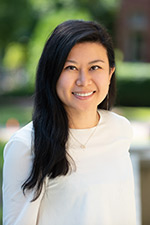
Waiting on your waiter is never a problem thanks to Tablee, the brainchild of entrepreneur Wendy Jiang Scelia. With a single tap, the small, coaster-size piece of technology sends a signal to a smartwatch worn by the server, letting them know which table needs help and the time of the request.
“I always had this idea that I saw in Korea,” says Scelia, who grew up in China. “It was very simple. When you go out with friends, and you need something, you press a button on the table. I thought it made so much sense.”
Scelia set out to be a chemical engineer, not an entrepreneur, but her curiosity took her in different directions and on different career paths. Since graduating from VCU's College of Engineering, she has worked as a project manager connecting the dots and then as a marketing manager promoting and positioning products. Those experiences, she says, culminated in her desire to be an entrepreneur and gave her the tools and knowledge to help propel her success with Tablee, both the name of the device and the hospitality software firm Scelia created with her partners where she serves as CEO and leads the product development team.
“To know that you’re moving forward with your goals and making new goals and being fluid and being able to achieve them and move on to new ones is good,” says Scelia, who started developing Tablee as a side project while she was working as a full-time marketing manager in Chicago.
When she decided to pursue Tablee as a full-time venture, however, she says it wasn’t easy. “There were no customers at that point, only hope.” And when she did land her first customer, The Daily, a restaurant in Richmond, Virginia, product glitches sent her back to the drawing board determined to make the technology work.
“One of my favorite books is ‘This Will Never Work’ by the founder of Netflix,” she says. She took inspiration from the book to set small experiments to learn how restaurants and their customers would respond to Tablee to help shape the product. “You don’t just make assumptions without data is one of the bigger things that I learned during Tablee,” she says. Then she joined the fall 2018 cohort of Lighthouse Labs, a Richmond-based business accelerator that provides a three-month intensive mentoring program, which gave the startup the spark it needed.
Since its full launch in 2019, Tablee has been recognized as a Top 9 Restaurant Tech to watch for by National Restaurant News, a Start Me Up Innovation Award finalist by Foodservice Consultants Society International, one of the most exciting product innovations and Best New Product by Florida Restaurant & Lodging Show, and Supplier of the Year by Virginia Restaurant Association. Scelia was also named in 2019 as one of the Top 50 Women Innovators in the Restaurant Industry.
Not one to stop innovating, in June 2020 Scelia founded her second startup, Olivian, which aims to manufacture the highest quality face mask for consumers and businesses. The idea came to her after she learned that her stepbrother’s wife, a nurse in Connecticut, was struggling with a mask shortage in the early days of the COVID-19 pandemic.
She also plans to build a Tablee scholarship in partnership with Pencils of Promise, a nonprofit that builds schools and increases educational opportunities in the developing world.
“Education is what enabled me to do what I’m doing today,” she says. “We’re really excited to be in a position to give back.”
David Vu, Pharm.D. (B.S.’13/H&S; Pharm.D.’18/P)
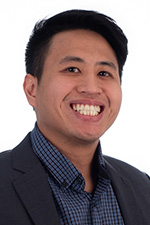 One of David Vu’s favorite phrases is “off the beaten path.” You might even call it a mantra.
One of David Vu’s favorite phrases is “off the beaten path.” You might even call it a mantra.Which helps explain why he put himself through pharmacy school but didn’t end up working at a pharmacy.
Not that he’s not passionate about the field. In the past couple of years alone, he’s worked in various capacities, most recently as quality assurance engineer for Kit Check, which serves hospital pharmacies, and as affiliate faculty at his alma mater in the VCU School of Pharmacy Department of Pharmacotherapy and Outcomes Science.
In 2019, he co-founded Pharmacy Informatics Academy, which helps educate the next generation of pharmacists about careers in health care technology; and, in June 2020, he co-founded Dispense As Written, a venture focused on helping health care professionals develop their personal brands.
His introduction to pharmacy came as an undergraduate at VCU, when he was earning his bachelor’s in science, with a concentration in professional science, and he volunteered at a free clinic. Immediately after he earned his degree, he worked as a pharmacy technician for a community pharmacy, which helped cement his passion for the discipline. As an inveterate problem-solver, he saw a space where he could put his talents to work. Watching the day-to-day operations, “I started thinking ‘What sort of technologies could improve a lot of these manual tasks and save a little time for the pharmacists?’ — not only to help the pharmacists but also to optimize patient care downstream.”
Gravitating to nontraditional health care careers is what spurred him to establish his own ventures. He created the Pharmacy Informatics Academy because he wanted to make pharmacists aware they could use their considerable skill sets in settings beyond community pharmacies and hospitals, which can have just as much impact as a pharmacist filling prescriptions. He has also established a scholarship to expand opportunities for pharmacy students interested in pharmacy informatics, a specialty that integrates pharmacy and technology.
His more recent venture, likewise, is to expand horizons in the world of pharmacy — “to help pharmacists build their own brand within the health care space, to help them realize the value they bring so they can really navigate the job market and find a job that suits their passions.”
He returns often to VCU as a volunteer: as a preceptor for Pharm.D. candidates and an “ambassador” for OpenEMR at the annual Health Hacks event. His ambassador role is particularly fulfilling, he says, because he learned about OpenEMR, a nonprofit organization that provides open-source electronic health records, when he attended Health Hacks as a student. While there, he collaborated with other students to create a virtual-reality-based approach to help calm children with special needs prior to medical procedures.
If he has any single piece of advice for future students, it’s to keep an open mind. “I always think about the end goal in mind, but at the same time, if opportunity arises, why not try it?” he says — and don’t worry if your end goal changes, too. He admits his “off-the-beaten-path” career trajectory has been “a little bit of a whirlwind. But it's been a fun whirlwind, of course.”
Jonathan Ward (B.A.’10/H&S)
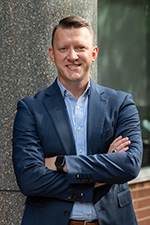
A steadfast and focused civil servant and veteran, Jonathan Ward believes in government and its potential to affect the lives of its citizens in positive and efficient ways.
As Virginia’s assistant secretary for veterans and defense affairs, he works to advance issues and policies affecting veterans, service members and their families within the Office of the Governor and the General Assembly. “I serve a team and an administration that is committed to ensuring veterans and issues related to the commonwealth’s significant military communities receive the focus they deserve,” he says.
Ward’s interest and desire to serve others started at a young age. Not only did he volunteer on political campaigns before he was able to vote, he was also active in the Boy Scouts, where he earned his Eagle Scout rank, and held two part-time jobs while in high school. “I gained a sense of appreciation and a desire to be a hard worker and a public servant,” he says of his days growing up in Southside, Virginia.
During his time at VCU, Ward served in multiple leadership positions. He served as the president of the Young Democrats at VCU for the 2008 and 2009 election cycles and as a member of the Student Senate and on several university committees. Selected for the Wilder School’s Virginia Capitol Semester program in his junior year, he took graduate-level courses and served as a legislative intern for Virginia state Sen. Janet D. Howell. “The academic and extracurricular opportunities VCU and its professors afforded me were significant to my development as a person and as a leader,” he says.
After graduating from VCU, Ward accepted a commission in the U.S. Army and was stationed out of Ft. Stewart in Georgia after attending Officer Candidate School and the U.S. Army Field Artillery School. Like many other service members who joined during the 2009 troop surge, he was deployed to Kandahar, Afghanistan, as a field artillery officer in support of Operation Enduring Freedom. “Leading soldiers and being a member of a dynamic team such as the unit of which I was a part, was the best job I have ever had,” he says.
Upon completing his initial active duty obligation in 2014, he joined the Virginia National Guard. In his civilian career, his public service continued when he was appointed as the confidential assistant and executive aide to Virginia’s Attorney General Mark Herring. Later, Ward served Herring as his director of constituent services and special projects. These positions provided him with a front-row seat to historic changes in Virginia’s legislation, most notably the AG’s decision not to defend the commonwealth’s ban on same-sex marriage in 2014. “He was the first Democratic attorney general and progressive attorney general in more than 24 years,” Ward says. “There were a lot of new issues to address, and I am very proud of being able to serve as a small part of that team.”
Gov. Ralph Northam appointed Ward to his current position in August 2019. Similar to his previous roles, Ward says, he plans to leave the agency in a better place, even if it is perfect, than when he found it. “Every organization, process and/or service can be improved, and making a difference to me translates into improving the organization,” Ward says of the takeaways from his time at VCU and in the military. That opportunity presented itself in the most recent General Assembly Session. Ward coordinated the advancement of several pieces of legislation concerning improvement of Virginia’s existing licensure process for military spouses and exempting state income tax liability for the forgiven student loan debt of totally and permanently service-connected veterans.
“Identifying challenges affecting our commonwealth’s veteran and military family communities and proposing new ways to improve the quality of life for our veterans, service members, and their families, are what I look forward to doing every day. They are what my experiences at VCU and serving as a leader in the military prepared me to do.”
- 2019
-
Lynzee Chelland (B.S.’09/H&S)
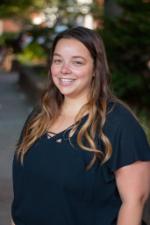 Lynzee Chelland considers herself a creative scientist. She began her career as a senior analyst in Altria Group Inc.’s product integrity unit in 2012. In that position, she processed toxicological and regulatory reporting evaluation requests and ensured product compliance with the Food and Drug Administration.
Lynzee Chelland considers herself a creative scientist. She began her career as a senior analyst in Altria Group Inc.’s product integrity unit in 2012. In that position, she processed toxicological and regulatory reporting evaluation requests and ensured product compliance with the Food and Drug Administration.“My first position at Altria was heavy in science — and I was very successful — but I wasn’t completely happy in my role. I knew I needed to be in a position that mixed science with a more creative aspect,” says Chelland, who became a flavorist at the Richmond, Virginia-based company in 2018. “I use science to understand the raw chemicals and materials, but creating those ingredients into balanced flavors is an art and you have to be innovative in creating flavors, especially in a regulated field.”
Today, Chelland designs flavors for John Middleton cigar products and submits recipes to the company’s regulatory affairs department for approval. She has earned a flavorist certification from the British Society of Flavorists in London. The three-week course enabled Chelland to fully understand the characteristics of a wide range of compounds and learn how to incorporate them into various product applications. Only 12 students are accepted to the program annually.
Chelland views her work at Altria as more than a job and is active in company initiatives, especially around diversity and inclusion. She is a committee member of Altria’s Women’s Network, where she advocates for inclusive programming, and also volunteers for young professional initiatives at Altria. Chelland previously volunteered for the VCU School of Business’ Connect Mentoring Program, providing opportunities for students to learn and practice networking skills and helping them identify career paths.
E. Taylor Doctor (B.A.’11/H&S)
E. Taylor Doctor’s unyielding passion for social and racial justice began while he was a VCU student and he has leveraged that passion today as a public health administrator to ensure that government agencies, health organizations and community-based initiatives are inclusive and supportive of the African American LGBTQ and HIV/AIDS communities.
Doctor worked in service-oriented capacities for churches and grassroots causes early in his career. Now he is a director of programs for the National Black Justice Coalition in Washington, D.C., where he provides programming oversight, manages the public policy agenda and acts as a liaison to stakeholders and politicians, among other duties. Before that, he served as manager for capacity building for HealthHIV in Washington, D.C., where he provided technical assistance, training and resource development to educate and empower people with HIV/AIDS and their service providers.
“My [mission] is to be a conduit for building connections for communities that have historically not been connected,” Doctor says.
In July 2018, he presented a poster, “Engaging MSM of Color Leaders in Guiding HIV Prevention, Outreach and Service Delivery,” at the International AIDS Conference in Amsterdam. Doctor is also a third-generation ordained minister and actively addresses the conundrum of sexuality and spirituality. He has written several publications and served on numerous panels to refute the idea that LGBTQ people can’t be members of faith-based communities. His book “Exposed: Three Skeletons in the Closet” was published in 2019.
Doctor advocates for the underserved as an in-demand speaker, appearing at churches, schools and conferences across the U.S.
Whitney Mari Headen (B.S.’09/B)
19th & Park Inc., a New York City-based creative marketing agency, is making serious waves in digital content featuring celebrities of color. Whitney Mari Headen is one-third of what Forbes has called the “#blackgirlmagic trifecta” who founded the company, which provides multimedia services for brands such as Colgate, McDonald’s, Apple and Nike.
Headen helped launch the agency in 2017 and, as CEO, oversees business operations, client solutions and brand strategy. Her expertise has quickly made the agency an eminent force in a traditionally male-dominated industry. The agency has received major media attention in recent months: Adweek named it one of 35 rising agencies on its Creative 100 list, Forbes highlighted the agency for its remarkable rise to prominence and fashion trade journal Women’s Wear Daily featured its mission of inclusive marketing.
Headen’s media career started before she graduated from VCU, working as an event production assistant for Live Nation Entertainment from 2008-10. For the next three years, she worked for media giants MTV and BET Networks in production and integrated marketing before she moved to Los Angeles to lead strategic partnerships for iHeartRadio. Headen moved back to New York in 2014, where she led multicultural cross-platform solutions for Essence magazine.
In 2016, Headen turned her passion for mentorship into a global business by launching The Life Currency, an education-based media company and blog focused on young professional women navigating career, finances and life. The platform offers life skill development advice, with topics ranging from applying to a first internship and entrepreneurship to building and managing personal credit.
Alan Keesee (M.H.A.’09/HP)
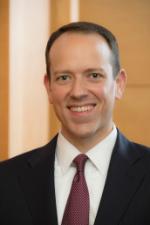 Alan Keesee has garnered some impressive accomplishments in the 10 years he’s been working in health care management. Keesee began his career immediately after graduation as a director of business operations in HCA Healthcare’s Capital Division in Richmond, Virginia, where he led strategic planning, outpatient imaging, business development and project management. After only a year at the company, he competed against more than 1,000 applicants to land one of seven slots in the company’s executive development program, subsequently rising quickly through HCA’s ranks. He served for three years as Henrico (Virginia) Doctors’ Hospital’s associate chief operating officer, then became chief operating officer at Capital Regional Medical Center in Tallahassee, Florida, in 2013. There he led daily operations of the 266-bed acute care facility with 1,000 employees and 90,000 ER visits. He also served as the ethics and compliance officer while overseeing a team responsible for all support, diagnostic and procedural departments.
Alan Keesee has garnered some impressive accomplishments in the 10 years he’s been working in health care management. Keesee began his career immediately after graduation as a director of business operations in HCA Healthcare’s Capital Division in Richmond, Virginia, where he led strategic planning, outpatient imaging, business development and project management. After only a year at the company, he competed against more than 1,000 applicants to land one of seven slots in the company’s executive development program, subsequently rising quickly through HCA’s ranks. He served for three years as Henrico (Virginia) Doctors’ Hospital’s associate chief operating officer, then became chief operating officer at Capital Regional Medical Center in Tallahassee, Florida, in 2013. There he led daily operations of the 266-bed acute care facility with 1,000 employees and 90,000 ER visits. He also served as the ethics and compliance officer while overseeing a team responsible for all support, diagnostic and procedural departments.In 2015, Keesee accepted the chief operating officer position at Sunrise Hospital and Medical Center in Las Vegas, an opportunity that put his leadership skills to the ultimate test. In the aftermath of the Las Vegas concert shooting in 2017, Keesee and his team provided care for hundreds of victims. In the wake of the event, he has traveled across the country to speak about the importance of creating a team that can support patients — and each other — during crises. After his time in Las Vegas, Keesee returned to Capital Regional Medical Center in 2018 where he currently serves as president and CEO overseeing 1,400 employees and 380 medical staff.
This rising star has received honors including the 2019 Robert S. Hudgens Memorial Award for Young Health Care Executive. Keesee also serves on several boards and committees, including the United Way of the Big Bend and Meals on Wheels Elder Care Services, both in Tallahassee, and VCU’s College of Health Professions Health Administration Alumni Advisory Committee.
Othman Khunji (M.F.A.’15/A)
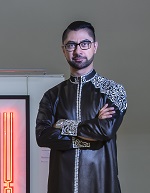 Othman Khunji is a Bahraini artist and interdisciplinary designer currently based in Qatar. His work ranges across the fields of product and interactive installation design. His particular areas of interest, social behaviors from an Islamic perspective, can be expressed through the language of design, triangulating the relationships between religion, culture and society. Whether educational or critical, evocative or reminiscent, his interactive creations invite a reawakening and exploration of faith-based practices and social justice issues that will establish platforms for dialogue in the hope of generating new progressive schools of thought.
Othman Khunji is a Bahraini artist and interdisciplinary designer currently based in Qatar. His work ranges across the fields of product and interactive installation design. His particular areas of interest, social behaviors from an Islamic perspective, can be expressed through the language of design, triangulating the relationships between religion, culture and society. Whether educational or critical, evocative or reminiscent, his interactive creations invite a reawakening and exploration of faith-based practices and social justice issues that will establish platforms for dialogue in the hope of generating new progressive schools of thought.Khunji is a graduate of the master of fine arts in design program at Virginia Commonwealth University in Qatar. His studies include his latest publication, “RITUALS, Our Past, Present & Future: Glimpses of Islamic Enrichment” and its accompanying collection, “The Five Pillars of Islam.” Living between Bahrain, Dubai, Colombia and Qatar, Khunji has gained knowledge of various international languages of design. As an extrovert chameleon, his commitment to and perseverance in this field of art and design have resulted in media recognition both locally and internationally, including Harper’s Bazaar, Brown Book, Domus, Alef, The Makers Movement, 3ders and the Saudi Design Magazine. Additionally, his work has been showcased in Qatar at Msheireb Museums, Katara, Doha Fire Station Garage Gallery, the Shangri La Hotel and at The New York Times Art for Tomorrow conference; in the United Arab Emirates at Design Days, The Mine gallery and Design Week in Dubai and Zayed University Middle East Film Festival in Abu Dhabi; in Kuwait at the Nuqat conference and The Hub gallery; in Bahrain at the Bahrain National Museum, Art Bahrain, Al Riwaq Art Space and The Arts Center; in Berlin at Kraftwerk; in London at Alon Zakaim Fine Art, Menier Gallery and Saatchi Gallery; in Milan at the Fuorisalone, Milan Design Week and Triennale Milano; in St. Petersburg at the Manege; and in Paris at the Grand Palais, Paris Design Week and Galerie Rabouan Moussion.
Khunji is a certified member of Sarpi Bridge Oriental Design Week, Fuorisalone co-founder of Asia Design Pavilion at Milan Design Week and an official member of the Milan Fuorisalone Commission. He has worked with local and international organizations such as Studio Banana, Virginia Commonwealth University, Brown University, King’s College London, French House of Design and Qatar Museums.
Adele McClure (B.S.’11/B)
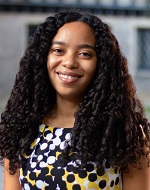 In 2019, Adele McClure was selected as a member of the Forbes 30 Under 30 list in the law and policy category. This national honor was the culmination of years of dedicated work as a policy professional and advocate for vulnerable populations. Other honorees include U.S. Rep. Alexandria Ocasio-Cortez as well as Emma Gonzalez and David Hogg, co-founders of the Never Again MSD political action committee to advocate for gun control policy.
In 2019, Adele McClure was selected as a member of the Forbes 30 Under 30 list in the law and policy category. This national honor was the culmination of years of dedicated work as a policy professional and advocate for vulnerable populations. Other honorees include U.S. Rep. Alexandria Ocasio-Cortez as well as Emma Gonzalez and David Hogg, co-founders of the Never Again MSD political action committee to advocate for gun control policy.As executive director of the Virginia Legislative Black Caucus, McClure supports and gives voice to policies that help address inequities and injustices within the commonwealth of Virginia, especially issues that disproportionately affect people of color and other historically underrepresented groups.
She volunteers for a number of poverty and housing initiatives, including the board of HomeAgain, the leadership team of the 10 Year Plan to End Homelessness in Arlington, Virginia, and the Richmond Eviction Diversion Program project planning team.
The odds were against McClure, which makes her achievements even more impressive. Growing up, she and her family were constantly on the move, experiencing poverty and homelessness. Despite these challenges, she enrolled in the VCU School of Business in 2007 and graduated in 2011 with honors.
“Many of my experiences at VCU shaped my skills and developed my abilities and network. Through organizational involvement, I formed lifelong friendships, learned how to organize communities and groups, strategize, and create policy and coalitions. VCU allowed me to escape poverty and enter spaces where black women have been historically excluded.” McClure says.
Elliot Roth (B.S.’15/En; Cert.’15/DVC)
 In 2016, Elliot Roth founded Spira Inc., a Los Angeles-based food technology company that creates ingredients for food companies from spirulina microalgae.
In 2016, Elliot Roth founded Spira Inc., a Los Angeles-based food technology company that creates ingredients for food companies from spirulina microalgae.Shortly after graduating from VCU in 2015, Roth discovered spirulina while reading a 1988 NASA study that claimed the microalgae was so nutritious it could sustain astronauts for long periods. Frustrated by the high cost of quality food, Roth purchased equipment to grow spirulina and began to eat it. The microalgae is 60% protein by weight and contains many crucial micronutrients, including B vitamins, iron and manganese.
The company went through several iterations, from focusing on a bottled beverage to manufacturing equipment for consumers to grow spirulina. Now Spira focuses on creating food ingredients that replace petroleum-based food colorings. Roth’s proprietary spirulina culture is processed into a powder. The powder is naturally blue and can effectively replace artificial blue dye No.1 in food products.
Spira has received numerous awards from Halcyon Incubator, RebelBio, Lighthouse Labs, World Food Programme, BeGreen, CommBeBiz and the National Science Foundation. He has been a Seasteading Institute ambassador, Kairos fellow and served on the Virginia Governor’s Council for Youth Entrepreneurship. He has also presented at SXSW, SynBioBeta and Thought for Food.
Before founding Spira, Roth graduated from VCU with a degree in biomedical engineering and a certificate from the da Vinci Center in product innovation. He trained at the Stanford d.school as a University Innovation fellow. In 2014, he co-founded Indie Lab RVA, a space for aspiring scientists to experiment and create, procuring $500,000 in lab equipment. The same year, Roth founded TEDxVCU and placed first and third in VCU’s venture competition. The following year, he placed second and third in the venture contest.
Jennifer Shannon, Pharm.D., BCPS (Pharm.D.’09/P)
 In 2013, Jennifer Shannon, Pharm.D., BCPS, and her husband, Mike, founded Lily’s Pharmacy, named after their oldest daughter.
In 2013, Jennifer Shannon, Pharm.D., BCPS, and her husband, Mike, founded Lily’s Pharmacy, named after their oldest daughter.“I wanted to open a practice that would change the perception of pharmacy in my community by offering direct patient care services,” Shannon says. Pharmacists who provide direct patient care work with patients individually, offering services such as compounding medications, wellness and health management oversight and hospital transition of care.
In the pharmacy’s first year, the Shannons developed a nationally recognized transition-of-care program with Emory Johns Creek Hospital. The program manages patient change from one health care provider or setting to another and has reduced hospital readmissions and improved patient outcomes. Now Lily’s Pharmacy is one of the fastest-growing independent pharmacies in the country.
Shannon is an outspoken advocate for patient choice. In early 2019, she helped develop a bill in the Georgia General Assembly that protects patients’ right to choose their pharmacist, which was enacted into law in May. The bill prohibits insurers and benefits managers from referring a patient to a pharmacy in which they have ownership or affiliation.
“I provided testimony before the House and Senate Health and Human Services committees on several occasions. I am proud to say that this will change the course of pharmacy care across the state of Georgia and is beginning to have a ripple effect across the country,” Shannon says.
Shannon’s mother, Donna, is a double alumna of the School of Nursing and former nurse director at VCU Health. Shannon considers herself fortunate to have grown up in the VCU community and credits her experiences at the VCU School of Pharmacy with instilling in her the importance of community pharmacy practice and direct patient care.
Joshua Son (M.U.R.P.’14/GPA)
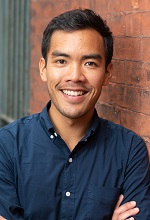 Joshua Son knows the importance of vibrant public spaces and bringing energy to streets with vacant storefronts — as senior planner for the Richmond, Virginia, Department of Planning and Development Review, he serves as the secretary for the Urban Design Committee.
Joshua Son knows the importance of vibrant public spaces and bringing energy to streets with vacant storefronts — as senior planner for the Richmond, Virginia, Department of Planning and Development Review, he serves as the secretary for the Urban Design Committee.Son was raised with an appreciation for urban centers and local businesses; his mother owned her own business in a suburban strip mall, devoid of lively public spaces. This experience evolved into his passion for understanding how economic development, transportation and open space can affect public health and urban design.
In 2015, he co-founded Breakaway RVA, an organization that leads bike rides through city neighborhoods, with a mission to build a more bike-friendly community. Each ride includes speakers along the routes discussing Richmond’s culture and history.
Son also worked as part of a team to develop Upswing, sidewalk play stations consisting of retractable jump ropes that give city children more opportunities to exercise. The Upswing stations are designed to encourage sidewalk play for children and families living in what he calls “challenging circumstances.” In 2016, Upswing was one of 50 award recipients out of more than 1,000 applicants; it received $15,000 from the KaBOOM! Play Everywhere Challenge to install five stations in Richmond’s Monroe Ward neighborhood.
Maintaining a strong VCU connection, Son served on the selection committee for the Wilder School’s Morton B. Gulak Lecture in Urban and Regional Planning for the past two years and has been a guest lecturer for urban planning and design topics from a local government perspective. “VCU not only helped me form a strong academic foundation for my career path, but it also encouraged me to experience the real world firsthand, a critical component to education,” he says.
Son was on the scholarship committee for Hostelling International Richmond from 2015-17; was a board member for the RVA Street Art Festival from 2016-18; and has been a member and co-chair of fundraising on the Art 180 Young Professionals Board since 2018.
Elaine Genise Williams (B.S.’17/SW)
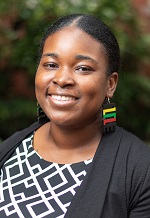 In 2017, Elaine Genise Williams testified before the U.S. Senate Committee on Health, Education, Labor and Pensions about simplifying the federal student aid process, with special consideration for students experiencing homelessness.“I experienced unstable housing in my childhood, which led to homelessness in my adolescent years,” Williams says. While she was at VCU, her federal aid was delayed several times by as much as four months because of the complexity of the aid process.
In 2017, Elaine Genise Williams testified before the U.S. Senate Committee on Health, Education, Labor and Pensions about simplifying the federal student aid process, with special consideration for students experiencing homelessness.“I experienced unstable housing in my childhood, which led to homelessness in my adolescent years,” Williams says. While she was at VCU, her federal aid was delayed several times by as much as four months because of the complexity of the aid process.Now, just two years after graduating from VCU with a degree in social work, Williams is program director of RVA Thrives, an organization that empowers residents of Richmond, Virginia’s Jefferson Davis Highway corridor to take greater control over decisions affecting their community. Williams received a Community Trustbuilding Fellowship in 2018 and participated in a six-month program to develop skills in peacebuilding and conflict resolution with a focus on racial reconciliation. In summer 2019, she served as an Initiative of Change Facilitator and led a workshop in Switzerland on enhancing community participation and empowerment.
Williams sits on the board of Change the World RVA, which she co-founded in 2012, while still in high school; it remains the only organization in the region focused on the needs of high school and college students facing homelessness. She is also co-chair of United Way and a member of the Youth Housing Stability Coalition.
At VCU, Williams was named a Federal Policy fellow, meeting with lobbyists, advocates and lawmakers in Washington, D.C., and was a member of the living-learning community engagement program ASPiRE and a resident assistant. She presented research at the annual Undergraduate Poster Symposium on experiences and service needs of Richmond-area youth facing homelessness and housing instability who do not meet the traditional definition of homelessness.
“Every youth deserves fair opportunity, no matter their experience,” Williams says. “These are young people experiencing homelessness on their own, so if we don’t create a safety net or access to resources that make it easier for them to actually achieve something, we are part of the problem.”
- 2018
-
Edwin Obilo Achola, Ph.D. (Ph.D.’13/E)
Edwin Obilo Achola, Ph.D., was inspired to pursue a career in education by the passion and dedication of his parents, who were both teachers. Born in Kisumu, a town in western Kenya, Achola grew up witnessing his parents’ commitment to serving children in rural communities.
Today, he is an associate professor and co-project director specializing in special education in the Department of Advanced Studies in Education and Counseling at California State University, Long Beach. Achola helps train teachers to work more effectively with students with disabilities who come from diverse communities and also to help students transition from adolescence to adulthood.
While pursuing his Ph.D. at VCU, Achola met Colleen Thoma, Ph.D., associate dean for academic affairs and graduate studies in the School of Education’s Department of Counseling and Special Education, who became his doctoral adviser, friend and mentor.
“I was not confident in my ability to get a tenure-track position and be successful at it,” Achola says. Thoma supported him through the application process, wrote letters of support and helped him prepare for interviews.
In the end, Achola landed his “dream job” at CSULB and earned early tenure and a quick promotion. He has received $3.75 million in federal grants for his work since 2013.
Achola is a member of the Council for Exceptional Children, a board member of its Division on Career Development and Transition and chair of its Human Rights and Cultural Diversity Committee.
Amid the flurry of career achievements, Achola and his wife, Gloria Obilo, welcomed a son, Gor Obilo, in April 2018.
Achola calls attending the VCU School of Education “the single most influential event of my professional journey.”
“VCU opened doors that I never imagined would be open to people from my background.”
Joseph Carlson (B.F.A.’08/A; M.F.A.’11/A)
Joseph Carlson’s acting resume includes the role of Joseph Marstern in the 2012 Academy award-nominated film “Lincoln” and a starring role as legendary outlaw Frank James in the 2016 AMC series “The American West.” He was nominated for the Robert Prosky Award for Outstanding Actor in a Leading Role for his work in 2015 on the play “Colossal,” a production that was nominated for eight Helen Hayes Awards, and he was nominated for Best Actor in a Play by the Richmond (Virginia) Theater Critics Circle Award for his turn as Stanley Kowalski in the 2014 production of “A Streetcar Named Desire” at Firehouse Theater in Richmond.
His 2008 bachelor’s degree in performance, which he earned magna cum laude, prepared him for these roles, but Carlson has also established himself as an educator and activist. Working with VCU professor and mentor Tawnya Pettiford-Wates, Ph.D., he pursued his art beyond performance, completing a master’s degree focused on teaching theater in 2011. This has blossomed into an impressive list of accomplishments in its own right.
Carlson was educational programs manager at Synetic Theater in Washington, D.C., from 2013-16, where he developed curricula to complement the theater’s productions and brought arts integrated learning through physical theater to thousands of students across Virginia, Maryland and Washington, D.C. He worked with lifelong learners at George Mason University and helped train teachers at Fairfax County (Virginia) Public Schools. He has also taught at the Virginia Theatre Association’s annual conference, and co-authored one of the keynote presentations for the annual Southeastern Theater Conference in 2015.
Carlson has often worked to bring theater to communities that might not otherwise have access to arts programming. For example, he directed “The PIC: Prison Industrial Complex” twice for The Conciliation Project, a Richmond, Virginia-based nonprofit theater group that works to promote, through active and challenging dramatic works, open and honest dialogue about racism and oppression in America in order to repair its damaging legacy.
In addition to his community work, Carlson continues to practice his art as an actor. His most recent roles include Andrew Jackson in the world premiere production of “Sovereignty” at Arena Stage in Washington, D.C., Thomas Gray in the regional premiere of Whiting Award Winner Nathan Alan Davis’ “Nat Turner in Jerusalem,” William Clark (half of the famous duo Lewis and Clark) in the mini-series “The Men Who Built America: Frontiersmen” and Lord Cornwallis, the villain in the film “Washington’s War: General Washington and the Revolutionary War,” which is shown regularly at Mount Vernon. Carlson acted in two feature films scheduled for release next year, “Dakota Rose” and “Savage Nature,” and he is in pre-production for another fully funded independent feature, “Historical Film,” set to begin principal photography in April 2019.
Keyanna Conner, Ph.D. (Ph.D.’15/H&S)
Keyanna Conner, Ph.D., has both investigated organic reaction mechanisms and reached the high echelons of federal and state government.
“Without the support of a strong network of chemistry professors at VCU who believed in my scientific abilities and allowed room for my newfound passion for civic engagement, I would not have been able to pursue both my graduate studies and political interests,” she says.
While earning her Ph.D. in organic chemistry at VCU, she simultaneously dedicated her time to multiple political campaigns. Often times, she would leave the lab after a full day’s work and proceed to campaign headquarters to see how she could provide support for candidates that day.
Conner, one who never rests on her laurels, began working for Virginia Sen. Mark Warner’s re-election campaign shortly after finishing her research at VCU.
The year Conner graduated, Warner delivered VCU’s Commencement speech.
In 2016, Conner’s public-sector work blossomed into a key executive role when Warner promoted her to state director. As state director, she was responsible for overseeing state-level strategy and operations as well as five regional offices and a staff of more than 20.
Recognizing her dedication to public service, Virginia Gov. Ralph Northam appointed her to the position of secretary of administration in January 2018. Now, she oversees five state agencies, the Compensation Board, the Department of General Services, the Department of Human Resource Management, the Department of Elections and the Virginia Information Technologies Agency, as well as supervising the newly created chief data officer position.
This year, it was Conner who delivered a graduation speech, speaking to VCU chemistry graduates at the department’s ceremony in May 2018.
Gabriel Craig (M.F.A.’09/A)
Fifth-generation Detroiter Gabriel Craig lived and traveled outside his hometown for a decade after completing a B.F.A. at Western Michigan University. The time, he says, helped him cultivate a complex perspective on the social, cultural and ethnic diversity that exists in the Motor City. As part of this journey, Craig came to VCU.
“Through the craft and material studies program’s focus on both community and artistic excellence, I gained the confidence to attempt to affect change while also pursuing my artistic goals,” Craig says. He especially cites the classes he took with now-retired art history professor Charles Brownell, Ph.D., which Craig says grounded him in the history of western architecture and decorative arts and continue to “inform the aesthetic and ornamental vocabulary of my work on a daily basis.”
In 2012, Craig returned to Detroit and co-founded the metalworking studio Smith Shop, which specializes in the custom fabrication of gold, silver, copper, brass, bronze and steel. Smith Shop’s work, which ranges from jewelry to architectural hardware, is carried in more than 40 retail outlets across the U.S. and abroad and has been recognized in publications such as Saveur, Food & Wine, Metropolis, Dwell and American Craft.
That same year, Craig was named one of 40 Craft Artists under 40 by the Renwick Gallery of the Smithsonian American Art Museum and was included in an exhibition of the same name, in which he was the second youngest artist.
Craig says he and his wife and business partner, Amy Weiks, have always worked to create community and engagement around their passion for metalwork. Smith Shop has shepherded 16 interns to success in the field of artistic metalwork. In 2014, Craig founded the Center for Craft and Applied Arts, an advocacy and education organization that works to bring opportunities for creative production to central Detroit residents.
That community involvement, Craig says, “drives me to continue to create new work, to share this vocation and to learn ever more about its practice and history.”
Don Davis Jr., Ph.D. (M.S.’08/H&S; Ph.D.’11/H&S)
Don Davis Jr., Ph.D., has published more than 50 papers on positive psychology, with a special focus on the virtues of humility, forgiveness and gratitude.
Davis is a counseling psychologist and an associate professor at Georgia State University, teaching in the mental health counseling program and the counselor education and practice Ph.D. program. He is a member of the American Psychological Association and the Christian Association for Psychological Services and an active member of Trinity Anglican Church in Atlanta.
True to his work, he tells his life story as a gratitude list. In some cases, he speaks of the gratitude born of hindsight, such as the dedication it must have taken for his mother to nurture the interests of four children.
In others, the gratitude came immediately. While studying at VCU, Davis’ daughter was born with a diaphragmatic hernia, a rare and life-threatening birth defect. During the difficult year that ensued, when Davis and his wife lived at the Ronald McDonald House and struggled to balance caring for her with other life demands, Davis noticed the help he received from those around them.
“When I look back, I am not quite sure how I did it. But at the time, I felt like I had all the support I needed,” he says. His daughter survived, and Davis was able to complete his work at VCU.
The highlight of his time at the university, he says, was his relationship with Everett Worthington Jr., Ph.D., a well-known expert on forgiveness and Commonwealth Professor in the psychology department in the College of Humanities and Sciences.
“All of us who were trained by him feel a tremendous debt of gratitude for the gift he gave us,” Davis says. “I think we all hope we can somehow pay forward the privilege we were given in working with him.”
Leah Fremouw (B.A.’08/H&S; M.P.A.’10/GPA)
Leah Fremouw failed out of college at 19 and did not return to try again until she was 26. It was at that point, however, as a nontraditional student at VCU, that she found her stride.
Fremouw started slow, enrolling in just one class. She earned an A for the first time since 10th grade, and the success inspired her to keep the momentum. Not only did she earn a bachelor’s degree in women’s studies and political science, she also took every advantage of what VCU had to offer its students and community. Fremouw got involved in the Student Government Association, was president of Voices for Planned Parenthood at VCU, traveled to Guatemala and interned at a state delegate’s office and a local nonprofit.
She earned a master’s in public administration at VCU, and was selected as a Wilder Fellow both years she attended, a prestigious honor granted to top students at the Wilder School that provides them with in-state tuition, a stipend and professional work experience in their fields.
Today, Fremouw is vice president and director of marketing and community impact for Virginia Community Capital in Richmond, Virginia. VCC is a community development financial institution, which is a financial entity designed to promote economic equality and community revitalization by investing economically in underserved communities.
In this role, Fremouw has successfully deployed more than $4 million in community-based lending through strategic programming. She updated VCC’s branding and marketing, leading a website launch in 2017 and conducting a companywide brand survey in 2018.
She and her husband, Jacob Powell, have a 3-year-old son, Hazen.
“VCU is the place I found me,” she says. “I walked in a college dropout without any goals or a sense of who I could become. I walked out with confidence in myself and a relationship with my community that I am proud of… not to mention the two degrees I earned with honors.
Mary Beth (Bird) Knipper (B.S.’10/En)
“I have always loved the adventure of moving,” says Mary Knipper, describing how her childhood as an “Army brat” became an adulthood that includes ethnographic research in Lesotho, a southern African nation.
Knipper, who is pursuing an M.D./Ph.D. in anthropology at Rutgers, the State University of New Jersey, first traveled to Lesotho as a Peace Corps Volunteer in 2012. Later, she returned as a 2015 Fulbright Scholar and continued working with the Basotho people. She presented the resulting research at the 2017 Annual Meeting of the American Anthropological Association.
She continues to conduct research in Basotho communities in the Eastern highlands of Lesotho, with a particular interest in local forms of neonatal exposure therapy. These customary medical and protective practices bring infants into contact with known environmental threats in a controlled manner. Knipper is exploring the ways that Basotho mothers describe these practices as a cultural metaphor for early infant immunizations, with an eye toward understanding the complex interplay between western biomedicine and customary Basotho medicine in the region.
Knipper describes her time at VCU in an excited jumble: a major in biomedical engineering, work with a medical aid team in southwestern Kenya, feminist political theory courses for fun, learning to love writing and ballroom dancing. She tells stories of how Deirdre Condit, Ph.D., an associate professor and chair of the political science department in the College of Humanities and Science, started as her professor and became a dear friend.
“VCU allowed me to explore and change my interests along the way. It was an institution that made it OK for me to evolve,” she says.
Other loved ones have done the same. She says her husband, Jake, “joyfully follows me wherever in the world my academic and professional pursuits take us.” The couple have a black Lab, Darcy, and a cat, Yeti.
Knipper says it is her “fervent hope” to preserve her sense of humanity despite the undeniable toll that clinical medicine takes on its practitioners. “I want to be more than a doctor; I want to be a witness to the reality of the human condition,” she says.
Lathika Mohanraj, Ph.D., RN, BMTCN (Ph.D.’08/M; B.S.’14/N)
Lathika Mohanraj, Ph.D., RN, BMTCN, decided to commit her career to cancer research and the care of resilient survivors after witnessing her mother surviving breast cancer. Mohanraj, who had already completed two degrees at the University of Mumbai in India, moved to the U.S. to pursue a doctorate at VCU.
She has been at VCU ever since, earning her Ph.D. in 2008, completing a four-year postdoctoral fellowship, pursuing a bachelor’s degree in nursing, working her way up the clinical ladder as a nurse for VCU Health and becoming an assistant professor in the School of Nursing in 2017.
Recently, her work has focused on bone marrow transplants, and her volunteer work has followed suit. In summer 2018, she helped organize a bone marrow drive in collaboration with the India Association of Virginia and the Massey Cancer Center, hoping to increase representation of individuals from different racial and ethnic backgrounds on the bone marrow registry.
She is president-elect of the Richmond Chapter of the Oncology Nursing Society and chair of the Evidence-Based Practice Committee on the Bone Marrow Transplant Unit at VCU Health.
Among many honors, Mohanraj has received the Outstanding Recent Alumnus Award from the VCU School of Nursing and the Virginia Nurses Foundation’s 40 Under 40 Award.
“Besides preparing and nurturing me through my professional career, VCU has played a critical role in my personal life as well,” she says.
She met her husband, Parthasarathy Madurantakam, Ph.D., D.D.S. (Ph.D.’09/En; D.D.S.’12/D), at VCU. Madurantakam is VCU faculty as well, an assistant professor in the School of Dentistry. The couple have two sons, Shravan, 9, and Suveer, 5.
Cheri B. Spence (M.S.’08/B)
When Cheri B. Spence enrolled at VCU to get her master’s in information systems, she was already the chief information officer for International Mission Board, a large global nonprofit headquartered in Richmond, Virginia.
Spence, who has been married for 35 years and is the mother of three and grandmother of two, says that for much of her life, going to grad school to update her computer science degree from 1981 took a back seat to getting her children through college. She adds, “Once they were launched, it was my time!”
She soaked up everything she could during her time at VCU. “Every class I attended contained information that helped me move forward in my role as CIO,” she says. “I was able to apply concepts on a weekly basis.”
The year after she graduated, Spence was named global CIO for International Mission Board and spent the next eight years traveling extensively to work with the organization’s IT teams overseas. She revamped the nonprofit’s infrastructure, enhanced security and escalated critical systems to the cloud.
In 2016, she retired from International Mission Board and went to work as global CIO at ChildFund International, also located in Richmond. That organization was midway through replacing a system that affected its software in 25 countries in Asia, Africa and the Americas and the work of 11 associated organizations in Europe and Asia-Pacific.
Spence steered this project to success. Her secret? She accomplished the work, she says “by maintaining positivity and confidence in the face of tough leadership challenges and encouraging organization-wide cooperation, trust and transparency.”
Through it all, she maintains connections to VCU. She is an adjunct professor in the School of Business, mentors graduate students and serves on the VCU Information Systems Advisory Board.
Nantasha Williams (B.A.’11/H&S)
Nantasha Williams’ political and public service work reached a peak as a national organizer for the Women’s March on Washington, D.C., in January 2017, for which her name appeared on “PBS Newshour” and in the publications Essence, W Magazine and others.
The path that led Williams to that moment on the national stage required persistence and drive.
“My time at VCU was not easy,” she says. Williams came from a working-class family headed by a single mother, struggled with finances as an out-of-state student and took a year off school to deal with personal challenges.
She says those obstacles taught her the scope of her capabilities. When she returned to VCU, she became deeply involved in student government, which complemented her formal studies in political science. She followed this with an externship with the Virginia Department of Transportation post-graduation and eventually a job with the New York state legislature, where she held numerous positions with the Black, Puerto Rican, Hispanic and Asian Legislative Caucus, including as executive director. She ran for the New York State Assembly in 2016. Though she was not elected, she says she made contacts that brought her into social justice activism, and eventually to her work with the Women’s March.
In 2017, she was named a Young Professional Trailblazer by the National Urban League, and shared Glamour Magazine’s Women of the Year Award with other Women’s March organizers. She was one of City and State Magazine’s Albany Rising Stars Top 40 Under 40 and was among Rockefeller College of Public Affairs and Policy’s Young Alumnae of the Year, an award that honored the work she did after receiving a master’s in public administration at the college in 2014.
The Women’s March, Williams says, “represented a powerful reflection of our voice in society.” She plans to continue working to make that voice heard.
- 2017
-
Lauren Caldas, Pharm.D., BCACP (Pharm.D.’11/P)
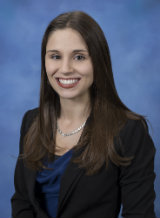
As a student at VCU’s School of Pharmacy, Lauren Caldas, Pharm.D., BCACP, established a community-based project to help individuals with diabetes learn to live healthy. The program, held at her church, included diabetes-friendly foods prepared by student pharmacists, blood glucose testing, blood pressure testing and flu vaccinations.
“It was the first event that I created from the ground up,” says Caldas, now assistant professor at the pharmacy school. “It was amazing to see something I dreamed come to life, and I’m proud to say that, as a faculty member, the students still host this event each year.”
After graduating from the VCU School of Pharmacy in 2011, Caldas tackled her next big project: helping to open the first Kroger Marketplace on the East Coast while serving as a pharmacy manager for the company. During her four years there, she created a “neighborhood pharmacy feel.”
“I knew my patients’ names and helped them manage their medications,” she says. “I was able to correct dosages for children’s antibiotics, suggest changes to medications to save my patients money and create a sense of community.”
Simultaneously, she earned board certification as an ambulatory care pharmacist and volunteered at the free clinic Center for Healthy Hearts.
For her work and commitment to community pharmacy, the Academy of New Practitioners at the Virginia Pharmacists Association honored Caldas with the 10 under 10: Class of 2014 award. She previously had received the Pharmacists Mutual Distinguished Young Pharmacists Award from the Virginia Pharmacists Association in 2012 and the Emswiller Award for Leadership Achievement from the School of Pharmacy in 2011.
Today, back at the VCU School of Pharmacy, Caldas hopes to share her passion for the profession and to train the next generation of community pharmacists.
“My personal approach to my career is to empower our future pharmacists,” Caldas says. “I love my work in academia and the opportunities it has provided me.”
Christina Dick (B.S.’10/MC)
.jpg) Christina Dick launched her career at the advertising firm The Martin Agency, where she developed social media strategy and content for clients such as GEICO, Kraft’s Cool Whip, Stove Top and Breakstone’s/Knudsen, Walmart and the Virginia Museum of Fine Arts.
Christina Dick launched her career at the advertising firm The Martin Agency, where she developed social media strategy and content for clients such as GEICO, Kraft’s Cool Whip, Stove Top and Breakstone’s/Knudsen, Walmart and the Virginia Museum of Fine Arts.Recognizing her talents, Capital One recruited Dick to serve as its strategic marketing manager. Within three months, she was promoted to senior community management associate, directly responsible for the financial firm’s social media platforms, including the 84,000-follower Twitter account and the 2.9 million-fan Facebook page. It was only a little over a year later that Big River, an ad agency based in Richmond, Virginia, brought Dick on board to serve as senior content strategist.
Back in the agency world, her clients included sweetFrog, Virginia Lottery, Anthem, Lumber Liquidators, Virginia Farm Bureau and Eagle Construction. In March 2015, the Richmond Public Relations Society of America honored Dick with the Capital Award of Merit in Social Media for the “Summer of sweetFrog Challenge” campaign she developed for the frozen yogurt company.
With several successes under her belt, Dick struck out on her own and in April 2016 founded TFB Agency, a social media-focused marketing consultancy with clients that include Patient First and James River Air Conditioning. She was recognized by Style Weekly's as one of Richmond's 2017 Top 40 Under 40.
In her spare time, Dick serves as an adjunct professor at the VCU Richard T. Robertson School of Media and Culture and regularly volunteers at school events, giving lectures and reviewing student portfolios. She also writes and publishes the popular blog Tiramisu For Breakfast and serves on the boards of the Richmond Ad Club and Richmond CenterStage.
Christine Haines Greenberg (B.A.’09/H&S)
.jpg) Four years after she graduated from VCU with a Bachelor of Arts in English with a concentration in political science and women’s studies, Christine Haines Greenberg, who was working as a wedding planner, did what many are afraid to: She quit her full-time job and started her own company.
Four years after she graduated from VCU with a Bachelor of Arts in English with a concentration in political science and women’s studies, Christine Haines Greenberg, who was working as a wedding planner, did what many are afraid to: She quit her full-time job and started her own company.Greenberg is used to change, though. Because of her father’s military service, she spent most of her childhood in Europe as her family moved every two years. It wasn’t until halfway through high school that they settled in Stafford County, Virginia. She then found her way to VCU in 2003.
“In general terms, meeting so many different kinds of people at VCU was a huge comfort for me after living around the diverse military community,” Greenberg says. “It was invaluable to learn from students from all over the country who had hundreds of different experiences from me.”
Greenberg is a self-starter with two Richmond, Virginia-based businesses: Wood Grain & Lace Events, an event company she started in 2011, and Urban Set Bride, an award-winning bridal store she started with her mom in 2014.
Greenberg has always been in the business of empowering others. At VCU, she was an active member in Young Democrats and was a volunteer coordinator for Students for Barack Obama. She also volunteered for Food not Bombs and Planned Parenthood. Now, she manages Boss Babes RVA, a 2,500-member Facebook group that she founded. There, local, self-employed women can “network and lean on each other as they navigate the waters of entrepreneurship.” She’s in the process of creating a mentorship program, Mini Boss Babes, that would pair members of Boss Babes RVA with area middle and high school girls.
In 2016, Greenberg created a contest, RVA LOVE, where community members nominated a couple to receive a free wedding. After collecting more than $50,000 in goods and services from 30 local vendors, Greenberg’s contest gave a single mom battling lymphoma the wedding of her dreams.
Greenberg always remembers VCU for the lessons and experiences she learned at the university.
“My professors had real-world experiences that translated beautifully in the classroom,” she says. “The city of Richmond and VCU gave me a well-rounded, colorful, quality college experience.”
William Haugh (M.H.A.’08/AHP)
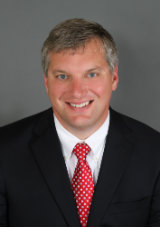 William Haugh can trace his career path back to his childhood, growing up in the small town of South Boston, Virginia.
William Haugh can trace his career path back to his childhood, growing up in the small town of South Boston, Virginia.“I specifically chose hospital administration because of the important role hospitals play in the community, especially in rural areas,” he says. “I witnessed this firsthand growing up in South Boston in which Halifax Regional Health System was the largest employer in the county.”
After his first year at Appalachian State University, in Boone, North Carolina, where he was studying information systems, Haugh completed an internship at Halifax Regional Health System. It was an opportunity that exposed him to various aspects of hospital operations.
In 2004, after graduating from Appalachian State, Haugh approached Halifax Regional CEO Chris Lumsden and “basically begged” for a job. Lumsden offered him a position with two caveats: First, Haugh would be paid minimum wage, and second, he would only have the job for one year.
“He intentionally gave me an unappealing position to make sure that I would go back to school and receive a master’s degree,” Haugh says.
The tough love paid off. Haugh was accepted into the Master of Health Administration program in the VCU School of Allied Health Professions a year later.
“Without a doubt, the success I have been fortunate to enjoy in my career is a direct result of the education I received at VCU,” Haugh says. “My VCU education was the perfect combination of classroom instruction, special projects outside the classroom and the opportunity to network with industry leaders.”
As a student, the constant interactions with health care leaders taught him the ropes and “how things really work,” allowing his career to progress rapidly.
In 2008, Haugh joined Tennessee-based LifePoint Hospitals, which operates 72 hospitals in 22 states. He served first as chief operating officer at the 220-bed Memorial Hospital of Martinsville and Henry County, Virginia, and then as CEO at Logan Memorial Hospital in Russellville, Kentucky, from 2009-12 . He joined Georgetown Community Hospital in Georgetown, Kentucky, as CEO in 2012. Three years later, he achieved what he considers one of his greatest accomplishment to date: being named LifePoint Health CEO of the Year.
Ashley Hawkins (B.F.A.’07/A; M.P.A.’13/GPA; Cert.’13/GPA)
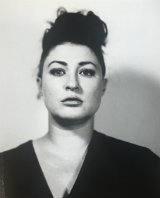 Ashley Hawkins was on the brink of leaving the VCU School of the Arts her junior year, when she started to etch, screen print and create lithographs. Her newfound passion reinvigorated her studies.
Ashley Hawkins was on the brink of leaving the VCU School of the Arts her junior year, when she started to etch, screen print and create lithographs. Her newfound passion reinvigorated her studies.“I was a fearful painter and almost quit VCUarts but then found printmaking and immediately fell in love,” Hawkins says. “The process was freeing. I could make 10 or 1,000 prints. I could change the plate or the screen, I could draw on my prints, collage — I was no longer afraid of ‘messing up.’”
She knew that starting a community print shop was her calling and she did, at Richmond’s Plant Zero, after college. With eyes on establishing a larger collaborative space, in 2010 she opened Studio Two Three, Richmond’s only printmaking studio that’s open to the public. At the same time, she returned to VCU to earn a master’s in public administration with a concentration in nonprofit management.
“I am an artist and Studio Two Three is my life’s art project,” Hawkins says. “I am fascinated by the constant excitement and challenge of creating and managing a growing organization and remaining responsive to our community needs.”
Hawkins says it’s a dream responding to those community needs, which include creating a space that supports professional artists with tools to take their career to the next step. The studio offers classes, workshops and a retail store, among other features.
In 2017, Hawkins launched the Art of Activism series. The first session gave more than 200 participants the ability to make protest posters and ephemera before the women’s march in Washington, D.C.
“We will continue to offer opportunities to amplify our voices in our community, in a time when art has never been more important,” Hawkins says.
Hawkins says earning a B.F.A. at VCU taught her more than lessons in art; she walked away with real-world problem-solving skills.
“I tell our interns and students the biggest benefit of an arts education is that it taught me how to think,” Hawkins says. “I have taken that process and applied it to founding and managing a thriving arts organization in Richmond.”
LeQuan M. Hylton, Ph.D. (Ph.D.’16/GPA)
.jpg) LeQuan M. Hylton, Ph.D., began making an impact in Richmond, Virginia, almost immediately after he and his mom moved to the city in 1998.
LeQuan M. Hylton, Ph.D., began making an impact in Richmond, Virginia, almost immediately after he and his mom moved to the city in 1998. Hylton saw the homeless in the city and wanted to do something to help, so he started an outreach program through his church, St. Paul’s Baptist Church.
“It was my first contact with people who were homeless,” he told Style Weekly in 2014 when he was honored as one of the city’s Top 40 Under 40. “And really, it bothered me that people lived in such conditions.”
Hylton, who received his bachelor’s in business from Virginia State University and his M.B.A. from Averett University in Danville, Virginia, continued to work on issues surrounding homelessness up until he came to VCU to earn his Ph.D. in public policy and administration from the L. Douglas Wilder School of Government and Public Affairs.
“VCU is a wonderful place,” Hylton says. “I chose to come to VCU because of the community engagement and outreach. I really enjoyed my learning experience, which involved the community.”
Hylton became the first member of his family to earn a doctoral degree when he graduated from VCU in 2010. His dissertation, “Perceptions of the Homeless Toward Nonprofit Human Service Providers,” focused on homeless people’s preferences for assistance services.
“Growing up in a rural community gave me a strong sense of caring for others,” says Hylton, who is from Martinsville, Virginia. “It was a loving place where I learned that if we could meet the needs of our family, extended family and others, then we ought to.”
His research at VCU led him and his mother, Sharon Hylton, to start Unified Properties LLC, a company that buys, renovates and leases quality and affordable houses and offices in the Tri-Cities area. Hylton also owns the real estate firm Hylton & Co. and a construction service company, Carver Builders.
His sense of service to those around him doesn’t end with his dedication to the homeless community. Last year, Hylton was deployed to Afghanistan, where he was in charge of the construction of multiple warehouses, maintenance shelters and offices, as part of his Army Reserve service, where he holds the rank of major. He has received numerous awards for his military service to include: two Meritorious Service Medals for military service, an Army Commendation Medal and the Military Outstanding Volunteer Service Medal.
“I continue to give back by any means necessary,” Hylton says.
Gai A. Nyok (B.A.’10/H&S; B.S.’10/H&S)
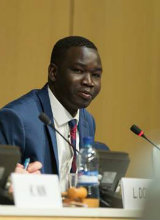 Gai A. Nyok, a diplomat at the U.S. Department of State, has come a long way since making the 300-mile trek to a refugee camp in Ethiopia from his native Sudan at age 5.
Gai A. Nyok, a diplomat at the U.S. Department of State, has come a long way since making the 300-mile trek to a refugee camp in Ethiopia from his native Sudan at age 5.“I grew up in a situation where there was war. I was exposed to international issues. I lived in a refugee camp with people of many, many different nationalities,” Nyok says. “And I saw the impact that countries can have in resolving conflicts around the world.”
Nyok is among the 20,000 Lost Boys of Sudan displaced during the 22-yearlong Sudanese civil war that ended in 2005.
“We were being killed because we were seen as potential [soldiers for] the rebels from the south,” he says. “So we were targeted and killed, sometimes taken to the north. At the time, there were a lot of child soldiers on both sides. There were a lot of us escaping our villages to go to refugee camps.”
Nyok saw firsthand the impact diplomats can make when American diplomats interviewed him for a chance to come to the U.S.
“I was inspired by the work they were doing in a hostile environment in a refugee camp in Kenya,” Nyok says. “It was hostile. No services. Nothing.”
Nyok relocated to Hanover County, Virginia, in 2001 when he was 16. He was so inspired by his experiences with the diplomats that years later, when he received scholarships to attend VCU, he double-majored in economics and international relations with the goal of becoming one himself.
When he graduated in 2010, Nyok received the Thomas R. Pickering Foreign Affairs Fellowship, funded by the U.S. Department of State and administered by the Woodrow Wilson National Fellowship Foundation to support and prepare students for careers in the U.S. Department of State Foreign Service.
“Today, my job takes me around the world implementing U.S. government policies and introducing, and advocating for, American values to foreign audiences,” Nyok says. “The key approach to my career has been finding the intersection of my strengths and passion. I made my way to America as a teenager, after having sought refuge in a number of other countries, and I understood early on the importance of diplomacy in today’s interconnected world while realizing that I flourish in foreign or unfamiliar environments.”
In a 2013 speech on World Refugee Day, former Secretary of State John Kerry called Nyok “a prime example, like so many millions of others, of exactly why it is worth all of us standing up for the world’s most vulnerable.”
Stanley R. Rayfield (B.F.A.’09/A)
.jpg) Stanley R. Rayfield learned a valuable lesson growing up in Henrico, Virginia: Take hold of any chance given to you.
Stanley R. Rayfield learned a valuable lesson growing up in Henrico, Virginia: Take hold of any chance given to you.“Henrico High School in 2001-05 did not have the best reputation in the county. It was rough; there were limited resources, poverty and very hard things to deal with,” Rayfield says. “Being in that environment really taught me to be appreciative of any opportunity I had and not to squander it. I had the opportunity to be in a program called the Center for the Arts that changed my life. That program inspired me to become an artist and attend VCU.”
Rayfield enrolled in the VCU School of the Arts in 2005 and received several scholarships and fellowships to support his studies. Through the support of his professors and a newfound faith, he graduated in 2009.
“I cannot neglect that during my time at VCU I was dealing with depression,” he says. “I was really in a dark place and what got me through it all was I started going to church. When I began going to church that was a real breakthrough for me, personally and spiritually.”
Rayfield says his spiritual growth added value to his art. Shortly after graduating, a portrait of his father, Ralph, that he painted his senior year was exhibited in the Smithsonian National Portrait Gallery, where it garnered second place in the 2009 Outwin Boochever Portrait Competition.
In 2013, Rayfield worked with popular film producer and director Spike Lee to create two paintings for the 25th anniversary of the Academy Award-nominated film “Do the Right Thing.” One of Rayfield’s paintings was displayed during a block party attended by celebrities including comedian Dave Chappelle and singer Lauryn Hill. Stanley also has work in the permanent collection of the U.S. Pentagon and five paintings in the permanent collection of the Morris Museum in Augusta, Georgia. The Virginia Museum of Fine Arts purchased one of Rayfield’s pieces, “Black Jesus,” for its permanent collection. In 2014, he completed a painting of Malia and Sasha Obama, which he presented to the then-President Barack Obama and is now part of the former president’s personal collection.
None of this would have been possible, Rayfield says, without the tutelage of the communications arts professors at VCU who helped him develop as an artist.
“They were amazing. They were like prophets. They knew exactly what we needed,” Rayfield says. “They forced me to find a different voice, which led to me ultimately becoming a great fine artist, so I thank God for that opportunity.”
Ryan C. Rinn (Cert.’11/GPA; M.U.R.P.’12/GPA)
.jpg) Ryan C. Rinn spent his summers working at the local steel mill in his hometown of Seguin, Texas, just outside Houston. His father and grandfather both worked at the mill, but his parents — whom he credits with teaching him the importance of having a work ethic, patience and persistence — always encouraged him to leave Texas for college and to follow his dreams. He received his undergraduate degree at the University of Richmond, but it was at VCU, in a graduate class taught by Meghan Gough, Ph.D., assistant professor in the L. Douglas Wilder School of Government and Public Affairs, where he found his calling in urban planning.
Ryan C. Rinn spent his summers working at the local steel mill in his hometown of Seguin, Texas, just outside Houston. His father and grandfather both worked at the mill, but his parents — whom he credits with teaching him the importance of having a work ethic, patience and persistence — always encouraged him to leave Texas for college and to follow his dreams. He received his undergraduate degree at the University of Richmond, but it was at VCU, in a graduate class taught by Meghan Gough, Ph.D., assistant professor in the L. Douglas Wilder School of Government and Public Affairs, where he found his calling in urban planning.Her Studio 1 class, centered on urban planning in Richmond’s Highland Park neighborhood, set the course for Rinn’s life. It’s there he began his work to revitalize the city’s historic neighborhood just north of downtown, a passion that still drives him today.
In 2013, Rinn was hired to serve as executive director of Storefront for Community Design, a nonprofit that, through low-cost design assistance and community engagement, links design professionals to design need. He accepted the position on the condition that Storefront would focus on community engagement in Highland Park. In the four years since Rinn has been at the helm, the organization has held more than 250 design sessions and 25 community advocacy events and has engaged more than 200 young people. Storefront also partners with VCU’s Middle of Broad studio, where students work on community design projects around Richmond.
In 2017, Storefront partnered with several organizations to open Six Points Innovation Center. The center, situated in the commercial core of Highland Park, allows nonprofit organizations to provide youth access to innovative programming in the arts, urban ecology, education assistance, public media, public history and advocacy.
Nonprofit director. Urban planner. Grassroots organizer. Community designer. Rinn proudly wears each of these hats and traces them back to VCU’s Wilder School, where, he says, he learned the tricks of the trade.
“The Wilder School of Government and Public Affairs allowed me to learn planning in an applied setting,” he says. “Two years in the field in graduate school helped me build community connections and friendships that I still lean on today for the betterment of our city.”
Isaac Rodriguez, Ph.D. (M.S.’10/En; Ph.D.’13/En)
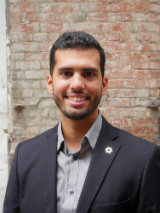 As a high school student, Isaac Rodriguez, Ph.D., would come home and take over for his mom, who babysat children during the day, so she could go to her second job at a restaurant. When he was done babysitting, he would join her at the restaurant to bus tables.
As a high school student, Isaac Rodriguez, Ph.D., would come home and take over for his mom, who babysat children during the day, so she could go to her second job at a restaurant. When he was done babysitting, he would join her at the restaurant to bus tables.Rodriguez says it’s that kind of grit, along with a focus on receiving a good education, that motivated him to succeed.
“There was never a dull moment growing up; my sister and I could never say we were bored,” says Rodriguez, whose parents, originally from Puerto Rico, moved to Virginia before he was born. “I can’t thank my parents enough and strive to make them proud every day.”
Rodriguez graduated with two biomedical engineering degrees from VCU’s School of Engineering: a master’s in 2010 and a Ph.D. in 2013. As a student, he was involved in Students Today Alumni Tomorrow and the Lambda Upsilon Lambda Fraternity, both of which offered him leadership opportunities that, he says, prepared him for his role as CEO in a fast-paced startup environment. In 2015, Rodriguez co-founded the biotech company SweetBio with his sister, Kayla Rodriguez Graff. The Memphis, Tennessee-based company has raised more than $2 million to bring Rodriguez’s invention to market — a regeneration membrane that can be used in oral surgeries to improve healing through the use of a unique ingredient, medical-grade honey.
“My education at VCU allowed me to be a scientist and invent the product that we are bringing to the market [in 2018],” says Rodriguez who served as NASA Langley's keynote speaker for Hispanic Heritage Month in October 2017. “I’m so excited now that I’m learning the business side of what we do and my sister, who has an M.B.A., is learning the science.”
- 2016
-
Sudharshana Apte, Ph.D. (M.S.’11/H&S; Ph.D.’14/H&S)
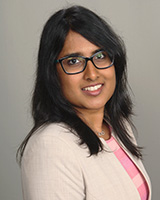 After receiving her bachelor’s in computer science and engineering in India, Apte came to VCU to earn her M.S. in Mathematical Sciences. She immediately fell in love with Richmond’s charm and history and stayed at VCU to acquire a doctorate in systems modeling and analysis. She had always been passionate about mentoring students and took the opportunity, while still pursuing her degrees, to teach undergraduate math and statistics courses to better prepare those students for upper-level courses. During her time at VCU, she was actively involved with multiple groups, including the Honors Council and Tiranga, a student organization for Indian nationals. She says VCU’s welcoming and vibrant VCU community awarded occasions for her to participate in activities that not only helped her grow as an individual but also let her stay true to her cultural identity.
After receiving her bachelor’s in computer science and engineering in India, Apte came to VCU to earn her M.S. in Mathematical Sciences. She immediately fell in love with Richmond’s charm and history and stayed at VCU to acquire a doctorate in systems modeling and analysis. She had always been passionate about mentoring students and took the opportunity, while still pursuing her degrees, to teach undergraduate math and statistics courses to better prepare those students for upper-level courses. During her time at VCU, she was actively involved with multiple groups, including the Honors Council and Tiranga, a student organization for Indian nationals. She says VCU’s welcoming and vibrant VCU community awarded occasions for her to participate in activities that not only helped her grow as an individual but also let her stay true to her cultural identity.Apte’s core expertise lies in translating physical processes into mathematical models and optimizing them for improved efficiency. From 2008-09, she worked as a consultant for the Virginia Department of Conservation and Recreation, where she achieved a 14 percent reduction in operational costs. In 2011, she interned at the Richmond Police Department to study 911 call arrival, response and service time patterns. Her team’s recommendations were used by the police chief to justify the need for retaining the existing patrol workforce to the city.
“It was so exciting to be a part of something that helped me give back to the city that had given me so much,” she says. “It taught me the most valuable lessons, both at a professional and personal level.”
Apte was hired at graduation by Altria as a postdoctoral fellow to work with the company’s modeling and simulation group. At Altria, she provided innovative solutions that led to improved efficiencies in manufacturing and new insights into sales call patterns. The dramatic time and cost savings provided by her work led to an offer of full-time employment as a research scientist.
Since then, she has presented at conferences held by the Institute for Operations Research and the Management Sciences, the largest operations research professional society in the U.S. Apte has served as an invited panelist on the forum for women in operations research, sat on the organizing committee for the 2016 INFORMS conference on business analytics and was recently elected vice president of communications of the Women in Operations Research and Management Sciences.
She promotes underrepresented groups in the mathematical sciences locally, speaking at the VCU Women in Mathematics Lunch and Learn and the VCU Women in Science Professional Seminar. In summer 2016, she also volunteered at the Richmond Public Schools MathScience Innovation Center to teach middle school girls about data visualization and other real-world uses of mathematics.
“I have been extremely lucky to have inspiring teachers and mentors that motivated me to pursue a career in research,” she says. “I would like to share my enthusiasm for STEM fields with young women to help them be successful in the professional paths they choose for themselves.”
Charlotte Arbogast (Cert.’12/GPA; M.S.’12/AHP)
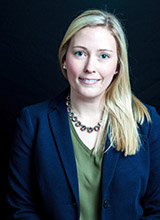 Arbogast always enjoyed spending time with older relatives, but she says it was her grandfather’s experience with Alzheimer’s disease that sparked her interest in aging-related issues. As an undergraduate history major at Lynchburg College in Virginia, Arbogast took a work-study position at the college’s Beard Center on Aging hoping to understand more about older adults and dementia. There she discovered the field of gerontology, a profession that was never on her radar as a history major.
Arbogast always enjoyed spending time with older relatives, but she says it was her grandfather’s experience with Alzheimer’s disease that sparked her interest in aging-related issues. As an undergraduate history major at Lynchburg College in Virginia, Arbogast took a work-study position at the college’s Beard Center on Aging hoping to understand more about older adults and dementia. There she discovered the field of gerontology, a profession that was never on her radar as a history major.While still an undergraduate, she was appointed to the Virginia Alzheimer’s Disease and Related Disorders Commission, chaired at the time by Ayn Welleford, Ph.D. (M.S.’93/AHP; Ph.D.’98/H&S), chair of the Department of Gerontology in the VCU School of Allied Health Professions.
“By the end of the first commission meeting, I knew I wanted to come to Richmond, study gerontology under Dr. Welleford and bridge my personal experiences with a newfound professional passion for aging issues,” Arbogast says.
She focused her graduate research at VCU on how awareness of aging issues can inform and guide health care policy development. “The practicum took my academic learning to a whole different level,” she says. “It showed me how I could directly translate my degree and training to the development of policies that are both practical and evidence-based. This philosophy remains a core of my approach to program and policy development.”
Following graduation, Arbogast started work as a policy analyst for the Virginia Department of Health. While there, she drafted regulation revisions and guidance documents governing nursing facilities and home care organizations and conducted gap analyses to identify unmet needs. In 2013, she became the Virginia Department for Aging and Rehabilitative Services’ first dementia services coordinator, where she paved a strong path forward through her work writing the next iteration of Virginia’s Dementia State Plan, a strategic policy planning blueprint for improving how Virginia responds to dementia, and two successful grant proposals that resulted in funding from the U.S. Administration for Community Living totaling more than $1.3 million.
Now at the Virginia Department of Medical Assistance Services, Arbogast reviews federal activities that affect long-term care service delivery in Virginia to develop regulations and guidance for those programs. She has maintained strong ties with the VCU gerontology department, serving as an adjunct professor and a member of the advisory board.
“If I can offer any advice, education or support to students at VCU who are likewise picking up the baton to improve aging services and disrupt ageism, then I am committed to doing so,” she says. “We’re all in this together.”
Joshua Boone (B.F.A.’10/A)
 Boone caught the acting bug at age 9 when he was cast as Davy Crockett in a summer school arts program. By the time he entered high school, acting was no longer a sideshow but something he loved and wanted to do. He excelled academically, and his parents envisioned a career in business, law or medicine for their son. Boone enrolled in the VCU School of Business in 2006, but he didn’t put his passion for acting aside. He auditioned for and won the lead role in TheatreVCU’s production of “Smokey Joe’s Café,” a show-stopping performance that convinced him and his parents that he should change his major and pursue his dream of becoming an actor.
Boone caught the acting bug at age 9 when he was cast as Davy Crockett in a summer school arts program. By the time he entered high school, acting was no longer a sideshow but something he loved and wanted to do. He excelled academically, and his parents envisioned a career in business, law or medicine for their son. Boone enrolled in the VCU School of Business in 2006, but he didn’t put his passion for acting aside. He auditioned for and won the lead role in TheatreVCU’s production of “Smokey Joe’s Café,” a show-stopping performance that convinced him and his parents that he should change his major and pursue his dream of becoming an actor.Boone says that there were many experiences and people in the School of the Arts’ Department of Theatre who influenced the person and artist he is today, especially noting professors Patti D’Beck and Gary Hopper. None were more important than those who came during his junior year under the tutelage of Tawnya Pettiford-Wates, Ph.D.
“Her voice and lessons on both life and acting continue to fuel me to this day. I was a lazy artist who didn’t fully respect the craft of acting, and Dr. T called me out on it,” he says. “That kind of truth is extremely rare in a classroom setting, and some may cower in response to hearing it, but over the course of my life, I’ve found that when used with love, it is the absolute most essential quality needed to promote healthy dependability on oneself and a determination that can propel the smallest among us to the highest of heights.”
During his senior year at VCU, Boone earned the Bobby Chandler Performance Award, an annual honor given to one senior in performance, chosen by the department chair.
Today, Boone is living his dream. He garnered his first on-screen role in 2013 in the “American Tragedy” episode of “Law and Order: SVU” and made his Broadway debut in 2014 as a principal character in “Holler If Ya Hear Me.” He recently filmed the pilot episode for ABC’s “Designated Survivor” to air this fall and appeared in the movie “Fan Girl” with Meg Ryan and Kiernan Shipka, which took him to the LA Film Festival and premiered worldwide on ABC Family in 2015.
Terrell Brown (B.S.’09/MC)
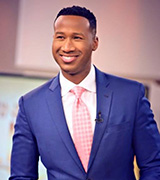 Brown’s interest in broadcast TV started in high school. He launched the school’s TV program, sometimes staying till 10 p.m. on weeknights to build the production (which is still produced and part of the school’s curriculum today), while on the weekends, he interned at a local TV station in Richmond, Virginia.
Brown’s interest in broadcast TV started in high school. He launched the school’s TV program, sometimes staying till 10 p.m. on weeknights to build the production (which is still produced and part of the school’s curriculum today), while on the weekends, he interned at a local TV station in Richmond, Virginia.During his freshman and sophomore years at VCU, Brown worked as an editor at WWBT-TV, Richmond’s NBC affiliate, and was later promoted to weekend morning show producer.
“I figured I’d always be a producer and my course work and studies in the School of Mass Communications assisted wonderfully in my day-to-day endeavors and challenges in the newsroom of an NBC affiliate,” he says.
His career path changed when Frank Jones, now news director at the NBC12 station, stumbled across a mock newscast that Brown had anchored. Recognizing Brown’s talent, Jones made sure Brown got airtime. In two years, Brown was anchoring the NBC newscast he used to produce and write. By his senior year at VCU, he was approached by network TV executives in New York, and just two weeks after graduating, found himself at CBS as the network’s youngest correspondent at age 22. He covered some of the nation’s biggest stories, including the Boston Marathon bombing, Sandy Hook Elementary School shooting and the BP Deepwater Horizon oil spill. He also reported from the White House and U.S. Capitol during health care reform and looming government shutdown and from the Kennedy Space Center on NASA’s historic final mission.
Brown was honored in 2014 with a national Emmy Award for his work on a “48 Hours” special report detailing the manhunt and capture of the Boston Marathon bombing suspects, and he received a Los Angeles-area Emmy Award for covering the campaign trail for the 2010 election season.
In 2014, Brown started anchoring Chicago’s No. 1 morning news broadcast on ABC7 (WLS-TV), and his role was expanded this year when WLS named him anchor of its new one-hour newscast at 11 a.m.
“VCU taught me how to think critically, question and challenge conventional norms and take risks,” he says of his alma mater’s influence on his career. “My professors encouraged me to never emulate but embrace the gifts, talents and intellect that make each of us particularly unique. With every new endeavor, I push myself to ‘be myself.’ That life lesson has helped me find early success in my career, the foundation of which was built from the mental and personal growth fostered by the incredible faculty and staff of VCU.”
Rachel Mercer (M.S.’12/MC)
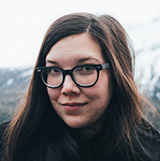 Mercer has been at the core of marketing and producing innovative products since graduating from the VCU Brandcenter in 2012. She started working in 2014 as a senior product strategist with London-based consultancy Made by Many, which had just invented a new toy, Hackaball, and raised $240,000 on Kickstarter to produce it.
Mercer has been at the core of marketing and producing innovative products since graduating from the VCU Brandcenter in 2012. She started working in 2014 as a senior product strategist with London-based consultancy Made by Many, which had just invented a new toy, Hackaball, and raised $240,000 on Kickstarter to produce it.Hackaball is essentially a computer you can throw around with your friends in the backyard.
Using a simple app on a mobile device, children can program Hackaball to play traditional games such as “hot potato” or they can create their own unique gameplay. With the correct coding, the ball will also change colors, vibrate and make sounds at the programmer’s whim.
Mercer’s role in the early days of Hackaball was to create a strategy to roll the toy into the marketplace. She and her teammates conducted research and tested the ball with London-based families, ultimately marketing the toy as a fun option that bridges the gap between technology and socialization. Hackaball, currently in the first stages of production, has sold 3,000 units worldwide and was named by Time magazine as one of the best inventions of 2015.
“The Time list came something like eight months after the initial launch, and it was just a massive validation,” she says.
Mercer is what the ad industry calls a “full stack” strategist. She’s involved in every step of the creation, development and marketing of a product by shaping brand strategy from the core of a business all the way to a consumer and back again. Before working with Hackaball, she consulted with big-name brands, including Coca-Cola, Target, Volkswagen, Expedia and Nintendo; co-founded Pullist, a monthly subscription service for graphic novels; and developed an easy-ordering app for Pizza Hut and a gas price prediction app for Esurance called Fuelcaster.
She has been recognized for her work in and leading multidisciplinary teams to create groundbreaking products by Business Insider’s “30 Most Creative People in Advertising Under 30,” The New York Times, AdWeek, Forbes and The Economist. She says her experience working in teams at the VCU Brandcenter, part of the School of Business, prepared her for success and for igniting her passion to succeed as a woman in the advertising industry.
“I think the best thing that Brandcenter did was to simulate the realities of working in the industry, while also giving us free reign for unimpeded creativity,” she says. “We worked on real briefs, for real clients or real agencies, and much of the work that we produced was unfettered by the requirements that the real work typically comes burdened with. I like to think of Brandcenter as a bit like a crucible; it’s a very condensed, intense period of time, but in the end you come out newly forged, better than before.”
Tin Htut Myint (B.S.’06/En)
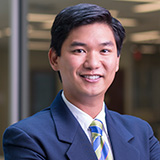 Myint followed in the footsteps of his older brothers, Lynn Htut Myint (B.S.’10/En) and Myo Thwin Myint, M.D. (B.S.’04/En; M.D.’08/M), when he enrolled in VCU’s School of Engineering as a mechanical engineering major.
Myint followed in the footsteps of his older brothers, Lynn Htut Myint (B.S.’10/En) and Myo Thwin Myint, M.D. (B.S.’04/En; M.D.’08/M), when he enrolled in VCU’s School of Engineering as a mechanical engineering major.“They did a great deal of teaching me how to navigate college and encouraging me when I needed it the most,” he says. “They also taught me the importance of being involved in extracurricular activities.”
He took their advice and jumped headfirst into his college career, making the most of his time on campus. He served as a member of numerous organizations, including the Student Government Association, the American Society of Mechanical Engineers at VCU and Virginia for Inspiration and Recognition in Science and Technology. One of his proudest accomplishments was helping create a VCU chapter of the Formula Society of Automotive Engineers, a student design competition where teams develop a Formula-style racecar and enter it in the Formula SAE competition, competing against more than 140 schools from 13 countries around the world.
Myint joined Dominion: Surry Nuclear Power Station after graduation, starting as a manual valves program owner. Six years later, he became a product development and customer solutions engineer at Dominion Voltage Inc., which provides solutions for energy efficiency. This new position came with a different set of demands, and Myint credits his adaptability to VCU’s program.
“As a mechanical engineering student at VCU, the curriculum not only focused on core mechanical courses, but it also included other engineering disciplines and business courses,” he says. “Because of the diverse knowledge, I was able to switch from a motor operated valve analyst at a nuclear power station to a product development and customer solution engineer at an electrical distribution and conservation software start up group.”
Myint also credits networking opportunities through the school for helping him land his first job, and he pays it forward by organizing monthly social hours for alumni and students to network with one another. He says it’s important to give back to the school that gave him, and his family, so much. He joined the Engineering Alumni Board the year he graduated and served as its president from 2014-16. He’s also presented at career fairs and resume review workshops, served as a panel member at alumni and engineering events and has spoken at the School of Engineering graduation ceremony for three years. At the university level, he’s served as a member of the VCU Alumni Outreach and Engagement Committee, and he currently represents the Engineering Alumni Association on the VCU Alumni Board of Governors.
Daniel “Danny” L. Plaugher (B.A.’06/H&S)
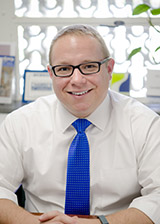 The youngest of four sons, Plaugher was the first to graduate from high school, a notable achievement. But, he always set his bar higher. After high school, he worked two jobs, including running his first political campaign, to afford himself the opportunity to attend community college at night. After three semesters and a 4.0 GPA, he transferred to VCU to study political science and achieved his dream of becoming the first member of his family to graduate from college.
The youngest of four sons, Plaugher was the first to graduate from high school, a notable achievement. But, he always set his bar higher. After high school, he worked two jobs, including running his first political campaign, to afford himself the opportunity to attend community college at night. After three semesters and a 4.0 GPA, he transferred to VCU to study political science and achieved his dream of becoming the first member of his family to graduate from college. Plaugher commuted from VCU, where he was living, to Northern Virginia, where he worked a construction job three days a week but still found time to be active on campus. He co-founded the Student Political Association and VCU Young Democrats and was elected twice to the Student Senate as vice speaker. He also became the youngest appointee of Gov. Mark Warner’s administration when he was tapped twice to serve on the commonwealth’s Juvenile Justice Committee, where he helped create public policy to assist Virginia’s youth in staying out of the justice system. He also worked on the 2002 Higher Education Bond Referendum, which secured $76.8 million in construction money for VCU.
After graduating from VCU, Plaugher learned about a position at the nonprofit Virginians for High Speed Rail through a friend and fellow alumnus who was building the group’s website. Plaugher joined the organization as its primary fundraiser and was quickly promoted to executive director several months later. “For the last decade I have successfully been working to improve Virginia’s transportation system through my position at VHSR, and it never would’ve happened without VCU,” he says.
At VHSR, Plaugher successfully spearheaded the effort to make Virginia the first state in the nation with a dedicated funding source for intercity and higher-speed passenger rail. Since 2007, this has resulted in $614.6 million in state and federal funding for intercity passenger rail, which has dramatically expanded and improved passenger rail service offered to Virginians. He also led the advocacy efforts in the Southeast to pass the Federal Passenger Rail Investment and Improvement Act of 2008, which created the federal intercity and high-speed rail program.
Plaugher, a VCU Alumni member, continues to volunteer with numerous organizations. As the youngest president of the Rotary Club of Richmond, Virginia’s oldest service organization, he oversaw the creation of a $100,000 scholarship to support students from economically disadvantaged communities in the Richmond region.
Kevin Powers (B.A.’08/H&S)
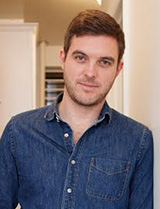 Powers started writing about the age of 13, but only a few close friends knew that he dreamed of becoming a professional writer. His high school English teacher, Patty Strong, recognized his talent and encouraged him.
Powers started writing about the age of 13, but only a few close friends knew that he dreamed of becoming a professional writer. His high school English teacher, Patty Strong, recognized his talent and encouraged him.After serving in the U.S. Army in 2004 and 2005 in Mosul and Tal Afar, Iraq, Powers returned to the States and decided to pursue writing in the Department of English at VCU. Powers met influential mentors during his studies and developed confidence in his writing, calling his time at the university “essential.”
“Getting the permission to think of myself as a writer, learning how to engage with literature and my own writing in new ways; all of this happened at VCU,” he says.
After graduating from VCU, Powers continued to hone his talents at the Michener Center for Writers at the University of Texas at Austin, where he earned an M.F.A. in Poetry in 2012. That same year, he published his first novel, and it was met with praise from well-known book critics and authors alike. Called “the ‘All Quiet on the Western Front’ of America’s Arab Wars,” by legendary novelist and journalist Tom Wolfe, “The Yellow Birds” was a finalist for the National Book Award, named one of The New York Times’ 100 Most Notable Books of 2012 and received the 2012 The Guardian First Book Award and the 2013 Hemingway Foundation/PEN Award. “The Yellow Birds” draws from Powers’ experiences in the Iraq War and follows a 21-year-old private and Richmond, Virginia, native before, during and after his tour.
Since then, Powers has written a poetry collection, “Letter Composed During a Lull in the Fighting,” which was shortlisted for the 2014 Forward Prize for Best First Collection and was the PBS Summer Choice. Last year, he was named a 2015 John Simon Guggenheim Memorial Foundation Fellow in support of his forthcoming second work of fiction. The Guggenheim Fellowship is awarded each year to those who have demonstrated exceptional capacity for productive scholarship or exceptional creative ability in the arts. The competitive award will support Powers as he writes the story of a young woman married to a plantation owner ruined by the end of the Civil War, set in and around Richmond in the early days of Reconstruction.
Fatima M. Smith (M.S.W.’12/SW)
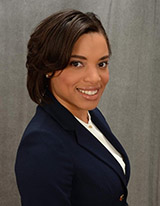 Smith started volunteering in sixth grade, and her passion for serving others has only grown since then. Through her field placements and graduate research on domestic and sexual violence and human trafficking during her M.S.W. studies at the VCU School of Social Work, she was inspired to influence large-scale change through macro and clinical social work.
Smith started volunteering in sixth grade, and her passion for serving others has only grown since then. Through her field placements and graduate research on domestic and sexual violence and human trafficking during her M.S.W. studies at the VCU School of Social Work, she was inspired to influence large-scale change through macro and clinical social work.At VCU, Smith volunteered with Virginia agencies to advocate against domestic and sexual violence and child abuse, including Greater Richmond Stop Child Abuse Now, Hanover Safe Place and Safe Harbor. She was also a volunteer for three years with the YWCA’s Regional Hospital Accompaniment Response Team. R-HART’s trained volunteers sit with survivors of intimate partner violence and sexual assault who have just arrived at the hospital. The volunteer supports the survivor and helps explain the forensic evidence collection process, ensuring the survivor’s needs are met and letting them know about their options and resources.
Smith became the R-HART coordinator in 2013 and then, following graduation from VCU, the agency’s director of community outreach and public education. As director, she developed partnerships with VCU, other local colleges and Planned Parenthood to establish a foundation for providing trauma-informed education and workshops in Richmond and nearby Chesterfield County.
Her volunteer efforts coincide with her professional passions. She volunteers with the Hospital Hospitality House and the University of Richmond Family Law Clinic, where she provides pro bono consulting, and in 2015, she assisted in efforts to bring a public awareness campaign to Richmond aimed at improving the criminal justice response to violence against women.
This year, Smith joined her alma mater as assistant director of sexual assault, intimate partner violence, stalking and advocacy services at the VCU Wellness Center, where she coordinates advocacy services and outreach education on campus.
“I love my job because I have the luxury of just believing the survivor,” she says. “I do not have to investigate like the police and I do not have to be judge and jury. I can just support them. It is an honor and privilege to be a part of someone's healing journey.”
Joseph Stemmle (B.S.’13/B)
_web.jpg) Stemmle, a financial adviser at Riverstone Wealth Advisory Group in Midlothian, Virginia, was instrumental in putting VCU’s financial planning program on the map in 2012. He was a junior at the time and serving as president of the Financial Planning Association student chapter. In addition to introducing students to careers and volunteer opportunities in the financial planning field, FPA organizes a national Financial Challenge where student teams submit a hypothetical financial plan, and the top 10 teams compete in an oral presentation and knowledge bowl. Stemmle’s team landed a spot in the top 10 and flew to San Diego for the finals, where the team placed third in the nation.
Stemmle, a financial adviser at Riverstone Wealth Advisory Group in Midlothian, Virginia, was instrumental in putting VCU’s financial planning program on the map in 2012. He was a junior at the time and serving as president of the Financial Planning Association student chapter. In addition to introducing students to careers and volunteer opportunities in the financial planning field, FPA organizes a national Financial Challenge where student teams submit a hypothetical financial plan, and the top 10 teams compete in an oral presentation and knowledge bowl. Stemmle’s team landed a spot in the top 10 and flew to San Diego for the finals, where the team placed third in the nation.Stemmle had been working as an intern at Ameriprise Financial since 2011, but the Financial Challenge experience solidified his career path. Ameriprise Financial offered him a full-time paraplanner position right out of college, and within two years, he earned the industry’s standard of excellence, the Certified Financial Planner designation.
The financial planning industry also offered Stemmle an outlet to serve others. As the youngest of six, Stemmle says volunteering was instilled in him at a young age as he watched his mom, who worked two jobs, put her neighbors, family and those in need ahead of herself.
In 2012, he volunteered at the on-campus Earned Income Tax Credit and Financial Freedom Fair, which opened his eyes to the opportunities financial planners have to help others. That day, he provided free credit reports and tax preparation services to Richmond-area residents. “Just because someone can’t afford financial planning or advice doesn’t mean that they don’t need the education,” Stemmle says. “It allowed me to see that I would be in a position in the future to start helping and educating those in the Richmond community.”
Today, Stemmle volunteers with multiple VCU Alumni groups, including serving as co-chair of the RVA GOLD Chapter’s Alumni Charity Challenge, which raised more than 12,000 pounds of food for FeedMore in 2015, and as vice president of VCU Alumni’s Rainbow Rams group, which supports LGBTQIA alumni. As director of volunteering for the RVA GOLD Chapter, he organized the YMCA of Richmond’s Bright Beginnings Program in 2015, which pairs alumni volunteers with local schoolchildren for a back-to-school shopping trip. Stemmle also serves as vice president of the Student Engagement Committee for the VCU School of Business’ Ram to Ram program, as a board member for the Financial Planning Association of Central Virginia and as president of the Central Virginia Alumni Association of Phi Kappa Psi.
“My VCU education gave me the opportunities to try new experiences and empowered me to be a change agent in my community,” Stemmle says. “It taught me to challenge the status quo in my education, career and community.”
- 2015
-
Adeeb Barqawi (B.S.’10/H&S; B.S.’10/LS)
Born in Washington, D.C., Adeeb Barqawi grew up in Kuwait and moved back to the U.S. at 16 to attend college and medical school. By the time he turned 20, he had graduated with two degrees from VCU (in biology and bioinformatics), started working at Pfizer and gained admission to Georgetown University to start his master’s in physiology and biophysics.
His career path changed course in 2009, however, after he visited an elementary school in Marinna, Arkansas, where his brother taught fifth-grade math and science as a member of Teach for America, a nationwide program dedicated to expanding educational opportunities in low-income communities. Barqawi spent only one day in the classroom, but it was enough for him to realize he wanted to empower students and ensure they have access to an excellent education. He completed his master’s degree, put his aspirations of going to medical school on hold and joined the Teach for America corps.
For the past three years, he’s taught physics at Kashmere High School in Houston where he’s already making a difference. In fall 2014, his 12th-grade students received the highest passage rate on the district-level assessment in the school district and were recognized for their remarkable academic achievement with a mayoral proclamation naming April 15 “Kashmere High School Junior and Senior Day.” For his work with the students, Barqawi was honored as Teacher of the Year by the Texas Alternative Certification Association.
Barqawi will earn his second master’s this May from Johns Hopkins University via a two-year distance-learning program that he completed all while teaching and running ProUnitas, a nonprofit he founded. Starting this fall, he will transition into a new role at Kashmere where he plans to implement a holistic approach for ensuring his students’ success through ProUnitas, an organization he started to provide every child in America, not just in Houston, with an empowering education and an ecosystem of support. The first project of ProUnitas, the Gardens Institute of Innovation, will bring support programs, including comprehensive health care, Head Start, and workforce, literacy and character development programs, within walking distance of his school.
Grant P. Garmezy (B.F.A.’09/A)
Drawing and sculpting came naturally to Grant Garmezy at a young age. When he was 10, his parents enrolled him in private drawing lessons, and four years later, he was accepted into the Interlochen School of Arts in Michigan where he found his love for working with jewelry and metals. By the time he was 15, Garmezy had secured a full-time apprenticeship with metal artist Ben Caldwell near his hometown of Nashville, Tennessee. Working with Caldwell led 18-year-old Garmezy to attend the Savannah College of Art and Design Rising Star program. A year later, he was accepted to VCU on a Visual Art Portfolio Scholarship. He intended on studying metals and jewelry, but the moment he felt the heat from the furnace in his glassblowing class and saw the glow of the molten glass, he was hooked.
In 2008, Garmezy was one of four artists accepted for the eight-week international glass residency at Northlands Creative Glass in Lybster, Scotland, where the Royal Scottish Academy honored him with the Benno Schotz Award for most promising young sculptor in the U.K. He started Grant Garmezy Glass in Richmond, Virginia, 2009, after graduating from VCU, and he’s built a team of fellow artists (and VCU alumni) to help him create his one-of-a-kind sculptures and commissions.
Due to a growing local excitement about his work, Garmezy started opening up his process to the public every third Thursday at a local hot glass studio called The Glass Spot. Garmezy now gives demos and lectures around the world, most recently at two universities in South Korea. He also was invited to serve as a visiting artist at the Chrysler Museum Glass Studio in Norfolk, Virginia, debuted his work at the prestigious SOFA Art Expo in Chicago and, this summer, will exhibit at the infamous Glass Weekend at Wheaton Arts and Cultural Center in Millville, New Jersey. In 2016, Garmezy will be teaching glass sculpting at the Corning Museum of Glass in New York, and at the Glass Furnace in Istanbul.
Elizabeth Hoettels, CCRN, CEN (B.S.’05/N)
Maj. Elizabeth Hoettels, CCRN, CEN, served as a medical service corps officer in the U.S. Army before enrolling in the VCU School of Nursing. After earning her bachelor’s degree, she was commissioned as an officer in the U.S. Air Force. She has been deployed multiple times in recent years and received the Bronze Star for her service in Afghanistan.
Hoettels currently works at Landstuhl Regional Medical Center in Germany as a Critical Air Transport Team nurse and as an Acute Lung Evacuation Team nurse. She was one of two Air Force nurses selected to attend Air Command and Staff College at Maxwell Air Force Base in Montgomery, Alabama, and will begin her studies there in July 2015.
Grateful for the education she received at VCU, Hoettels established an endowed scholarship in the School of the Nursing, the Per Aspera ad Astra: Emerging Nurse Leaders Scholarship, which will be awarded for the first time in 2018.
She was recognized in 2013 as one of the School of Nursing’s 120 Visionary Leaders.
Michael Karnjanaprakorn (M.S.’06/MC)
When Michael Karnjanaprakorn was 10 years old, his family moved from South Korea to the U.S. with the dream of sending him to an American college. When he earned the bachelor’s degree in economics that his family had hoped for, he realized he had a diploma, but none of the skills to make a true impact.
Seeking more real-world experiences, he enrolled in the VCU Brandcenter, a graduate school staffed by experts on the front lines of innovation. From the first day, he knew VCU was different. There were no quizzes or exams. He never had to buy a textbook. All the teachers practiced what they taught, and classes were project-based. It changed the way he viewed learning.
After graduation, he realized this unconventional learning could translate to the Web, and that it would benefit millions of people all over the world. He launched the online learning platform Skillshare in 2011 to make that vision a reality: A world where everyone has access to learning.
Today, with $10 million in funding and more than a million enrollments in 1,000-plus classes, Skillshare offers learning opportunities in a variety of fields, from website design to hand lettering. Much like the courses Karnjanaprakorn took at VCU, Skillshare classes are based on real-world projects and collaboration.
As a result of his success, Karnjanaprakorn is a TED Fellow, ranked No. 18 in Fast Company’s 100 Most Creative People in Business 2012 list, made Inc.’s 2014 list of 35 Under 35 Coolest Entrepreneurs and landed in Upstart Business Journal’s 2015 Upstart 100 class of rebels, dreamers, contrarians and big thinkers.
Timmy Nguyen (B.S.’11/B)
In his freshman year at VCU, Timmy Nguyen started turning his dreams into a reality when he told his career adviser, Darlene Ward-Thompson, in the School of Business that he wanted to work for the government. An internship with the city of Richmond in his first year turned into an internship with a federal agency his sophomore year, which eventually turned into a career.
Committed to giving back to his alma mater, Nguyen is visible in almost every facet at VCU, from student engagement to alumni engagement to donor engagement.
He selflessly gives his time to students, supporting their career opportunities by participating in the business school’s mock job interviews and Ram to Ram Mentoring and Resume Express programs.
He serves on several boards, including the VCU Alumni board of governors and the Ram Athletic Fund board. He also volunteers with the RVA GOLD Chapter, where his ideas and leadership inspired programs such as the Alumni Charity Challenge, which brought together 13 Virginia colleges and universities and gathered 4-plus tons of food for the food bank. The challenge drew recognition from local, state and federal elected officials for its success.
Through his infectious pride for VCU, Nguyen engages the community to support the university. He has obtained thousands of dollars in sponsorships for RVA GOLD and has been an ardent supporter and fundraiser for VCU Massey Cancer Center. He also raised funds and awareness for Shaka and Maya Smart’s campaign to support the Friends Association for Children, a Richmond organization that helps children gain critical literacy and developmental skills.
Nguyen is just as generous with his time in the community. He served as a speaker for former Seattle Seahawks’ running back and Richmond, Virginia, native Michael Robinson’s Excel to Excellence Foundation, which teaches local students about leadership and life skills. He also spends several hours each month mentoring inner-city third-grade students at Chimborazo Elementary.
For his contributions to the university and the community, Nguyen received the VCU GOLD Alumni Service Award in 2014 and twice earned the U.S. Secretary’s Award for Exceptional Volunteer Service in the Community, in 2012 and in 2015.
Elizabeth Woodall Parker (M.Ed.’08/E)
After spending five years in marketing and public relations, Elizabeth Woodall Parker decided to blend her two true passions — working with children and the field of mental health — into a new career: school counseling. She returned to school, earning a master’s in education from VCU, and in the seven years since she graduated, she has excelled in her role as a school counselor and an advocate for children.
As a counselor at Dumbarton Elementary School in Henrico, Virginia, she has assisted in lowering the out-of-school suspension rate by 78 percent through many programs, including the Leader of the Month. And her Young Men in Motion and Girls Can Run after-school running programs resulted in a 94 percent decrease in out-of-school suspensions for an at-risk population. She also received a $40,000 grant from the I Am A Leader Foundation, which allowed her to implement the Leader In Me program, based on Steven Covey’s book of the same name.
In 2015, she was named one of five finalists for the American School Counselor Association School Counselor of the Year, and she was honored by first lady Michelle Obama at a White House ceremony.
Parker shares her knowledge with the school counseling community and beyond. She regularly presents workshops for professional educators. Additionally, she has advocated for children and school counselors at the national level through media interviews, congressional briefings and collaboration with members of Congress.
She also works with numerous community organizations. She facilitates the Big Brothers Big Sisters program at her school, which averages more than 30 annual matches of “Bigs” to “Littles” in need of mentoring and support; works with the Innsbrook Club and the Virginia Foodbank to provide a weekend backpack program for more than 100 students in need of food for at least nine weeks each year; and partners with the local American Legion to provide holiday assistance to 50-plus families annually.
Micah Risk (B.S.’07/E)
Micah Risk took the tools she used in her career as a personal nutritionist and translated them into a successful tech startup that makes it easier for people to eat healthy.
Lighter, an online, plant-based meal plan and curated grocery delivery service that she began in 2014, addresses the challenges of healthy eating by providing customized meal plans that use fresh, flavorful ingredients and keep meal prep under 20 minutes. Lighter’s service also factors in budget, food preferences and meal frequencies when building a nutrition program, customizing it for the individual, family, training program or weight-loss goals.
Risk’s vision to make nutrition the easy choice was inspired by her experience at VCU where, as an undergraduate, she developed a foundation in the nutritional sciences and took a particular interest in the relationship between nutrition and chronic disease and in the accessibility to food programs and nutrition. She was selected as one of three undergraduate students to complete a traineeship at the World Health Organization in Geneva during her final year at VCU. She earned a master’s in food policy and applied nutrition from the Friedman School of Nutrition Science and Policy at Tufts University in 2013.
Lighter delivered 17,800 meals in its first three months of operation and also made a significant impact through its sustainability-focused service. The company estimates it achieved environmental savings of a million gallons of water (equal to about 380,000 showers), 119,000 pounds of CO2 emissions, 267,000 pounds of grain, 6,585 animals and, overall, a reduction of 66,000 grams of saturated fat consumed by its members.
Lighter is available in 13 U.S. cities and growing. As part of the company’s expansion, Risk is building partnerships with nonprofits committed to nutrition outreach programs.
Derick L. Rivers, Ph.D. (M.S.’09/H&S; Ph.D.’14/H&S)
As a statistician, Derick Rivers relishes the role of problem-solver and motivating children, teens and adults to make better health decisions and lifestyle choices. For years, he’s accomplished this as a teacher.
After earning his bachelor’s in mathematics, Rivers joined Richmond Public Schools and taught high school honors geometry and algebra using alternative methods. The latter was so successful that the school system tapped his techniques to use in training other teachers.
While still teaching, Rivers pursued his M.Ed. with a concentration in mathematics education, enrolling in courses at both Virginia State University and VCU, ultimately completing the degree at Cambridge College in Massachusetts.
In 2004, Rivers became the lead mathematics and statistics instructor at ECPI University in Richmond, Virginia. During his six-year tenure, he developed the bachelor’s mathematics curriculum, was awarded Most Innovative Instructor on four separate occasions and was named Instructor of the Year in 2010 and Most Effective Instructor in 2007 and 2008. He also was recognized by the Virginia Career College Association as a 2010 Instructor of the Year.
After much success in mathematics education, Rivers decided to hone his skills and enrolled at VCU to pursue a doctorate in systems modeling and analysis. He continued to teach during his studies, this time as a statistics instructor to undergraduate students in the VCU Department of Statistical Sciences and Operations Research while also serving as a research fellow for NASA.
Today, Rivers’ most recent position with the Food and Drug Administration gives him the opportunity to educate an entire nation. In March, he joined the FDA as a mathematical statistician for the tobacco division, where he’ll draw on his success as a statistician and an educator to impact consumers’ choices.
Mark Strandquist (B.F.A.’13/A)
Mark Strandquist is an artist, activist and educator who uses art as a vehicle for connecting diverse communities to build empathy and support for social justice movements.
For his ongoing project Windows From Prison, images requested by prisoners are collaboratively produced by students, former prisoners, artists and activists and then publicly exhibited on large banners to spark dialogue and action around criminal justice issues. Strandquist started the project in 2012 as an undergraduate student at VCU, and since then, Windows From Prison has expanded into interactive exhibits in several states, a national postcard exchange program and a high school curriculum. The project was recently produced with Parsons and The New School in New York City and is being funded by the U.S. Embassy for a version in Ottawa, Ontario. The project has received multiple awards and fellowships and reached wide audiences through The New York Times, The Guardian, The Washington Post and PBS’ “Newshour.” For his work around criminal justice issues, The Huffington Post included Strandquist on its end-of-the-year list of “16 People Who Made a Big Difference in 2014.”
As an undergraduate student, Strandquist worked with his partner, Courtney Bowles, to begin the public art project the People’s Library. The project has worked with hundreds of community members to transform discarded books into blank handmade journals for anyone to check out, fill with their histories and return it to the library to be included in the permanent collection. The project includes a teen mentorship program and has expanded to other states across the country.
As a writer, Strandquist has presented at conferences, and co-edits and co-founded the website Photography as a Social Practice. This April, working with the Magnum Foundation, he began his first curatorial project, Tactics of Collaboration: A Participatory Playbook, which works with socially engaged photographers from around the world to create an open-sourced toolkit to inspire, challenge and inform the community-based work of students of all ages. Strandquist teaches Art as Activism as an adjunct faculty at VCU, is a teaching artist with the University of Richmond’s Partners in the Arts and a Professional Fellow at the Virginia Museum of Fine Arts.
This summer, Strandquist is facilitating a summer advocacy camp in Richmond, Virginia, where incarcerated youth will work with artists, activists, lawyers and others to create media projects and mobile exhibits in an effort to impact juvenile justice reform across the state.
M. Lori Thomas, Ph.D. (M.S.W.’06/SW; Ph.D.’08/SW)
As a student in VCU’s Master of Social Work program, M. Lori Thomas completed her field placement with Virginia Supportive Housing, where she was tasked with planning and implementing the state’s first “housing first” program in Virginia. “Housing first” is an approach that offers permanent, affordable housing for individuals and families experiencing homelessness and then provides the supportive services they need to avoid returning to homelessness.
Through her placement and subsequent years of employment at VSH, Thomas worked with a number of community and state stakeholders to begin A Place to Start, a program that permanently houses individuals in the Greater Richmond area who have extensive histories of homelessness and a serious and persistent mental illness. The program, recognized with a Virginia Housing Award for Best Housing Program, has a 95 percent housing stability rate with individuals often considered “unhousable.”
After earning her Ph.D. from VCU in 2008, Thomas accepted a faculty position in the Department of Social Work at the University of North Carolina at Charlotte, where she is now an associate professor. There, she has continued her work to illustrate that the housing first model is effective in saving lives and money. In April, she published the latest findings of a two-year study that evaluated the impact of Charlotte’s Moore Place program, an housing first apartment complex for formerly homeless people, and found that it improved housing stability for chronically homeless individuals and resulted in a drastic reduction in the use of emergency and crisis services, including ER visits and incarceration.
Thomas has shared her research in numerous peer-reviewed publications and presentations. She also co-authored the sixth edition of “Social Work Macro Practice,” a textbook used in 120 schools of social work.
